



















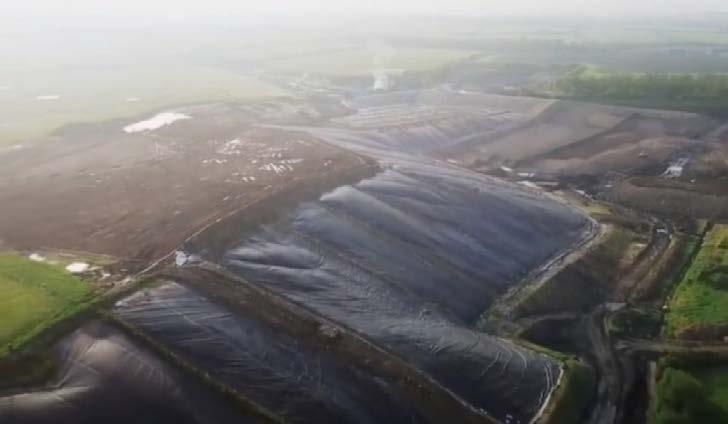
and the significant officer time spent addressing this issue.”
c ASH-STRAPP e D
Pembrokeshire county council has announced it will not proceed with legal action against the operators of Withyhedge Landfill, citing financial considerations.
In October last year, the council sought an interim injunction against Resource Management Ltd (RML), the company managing the site, following months of complaints from residents about foul odours and potentially harmful gases. The case was presented before a circuit judge, who acknowledged the landfill was causing a nuisance but ruled that the council had taken the incorrect legal approach
by failing to first serve a notice under the Environmental Protection Act 1990.
Despite legal counsel recommending an appeal, the council has opted against further legal proceedings due to the associated costs and what it describes as a “marked improvement” in conditions at the site.
A spokesperson for Pembrokeshire County Council said: “While we strongly believe that the court’s decision was wrong, the authority is in a difficult position when considering the costs of appealing and the financial outlays already incurred. This includes independent air quality monitoring

A WARRANT has been issued for the arrest of a 71-year-old woman accused of possessing cannabis.
The Crown alleges that Barbara Lewis, of High Street, St Davids, was found in possession of 3.4 grams of herbal cannabis, a controlled Class B drug, during a police search on
January 17.
Lewis was listed to appear before Haverfordwest magistrates on Tuesday (Feb 11). Following her failure to attend, magistrates issued a warrant for her arrest at the request of the Crown Prosecution Service.
The council also stated that its legal efforts had influenced the pace of remedial work undertaken by RML, which had been issued enforcement notices by Natural Resources Wales (NRW) to address the odour concerns.
lOcAl cAMPAIgNeRS
‘exTReMely DISAPPOINTeD’
Residents have expressed frustration at the council’s decision, with Colin Barnett, of the campaign group Stop The Stink, describing it as “extremely disappointing.”
“There’s been no attempt to put any sanction on this company whatsoever,” said Mr Barnett. “Now they’ve [the
council] dumped it and left us high and dry. Our only future route is to take legal action ourselves against the company and possibly against public services for failing to protect our statutory rights.”
The campaign group is now considering launching its own legal challenge against RML and local authorities.
The Withyhedge Landfill site, located near Haverfordwest, has long been a source of controversy, with residents likening the odours to a “stink bomb on steroids.” The council maintains that the situation has significantly improved following enforcement action by NRW, but local campaigners remain unconvinced and are calling for stricter accountability measures.
A MOTORIST who claimed to have taken cannabis “several days” before being stopped by police was found to have over four times the prescribed legal limit of the drug in his system.
Antonio Rodrigues, 27, was pulled over by officers just before 3:00pm on September 13, 2024, while driving his Smart car along an unclassified road off the A40 in Slebech.
A roadside drugs wipe proved positive, and further blood tests at the police custody suite confirmed he had 9.8 mcg of cannabis in his system—well above the legal limit of 2 mcg.
Haverfordwest magistrates heard this week that this was Rodrigues’ second drug-driving offence in a tenyear period.
“He’d taken the cannabis some days before, and there was nothing wrong with his driving,” said his solicitor, Michael Kelleher, after Rodrigues, of Croeso, Steynton Road, Milford Haven, pleaded guilty to the offence.
“He had no idea he was over the limit.”
Mr Kelleher added that Rodrigues
self-medicates with cannabis and is in the process of applying for a legal cannabis prescription.
Magistrates disqualified him from driving for 36 months and fined him £120. He was also ordered to pay £85 in costs and a £48 court surcharge.







cOuNcIl TAx in Pembrokeshire is expected to rise by nearly 10 per cent this year, taking the average annual bill to well over £2,000, but senior councillors rejected a potential increase as high as 17 per cent.
Pembrokeshire County Council’s Cabinet, meeting on February 10, was recommended to support one of four options for the council tax element of the forthcoming 2025-’26 budget.
The proposed rises, and the increase for the average Band D property were: 9.85 per cent (£148.81), 11.14 per cent (£168.29), and 16.58 per cent (£250.48), with a fourth option put forward by the council’s Liberal Democrat group members for a 12 per cent increase (£181.29).
For many years Pembrokeshire has had the lowest Band D Council Tax in Wales.
Following the 12.5 per cent increase in 2024-25 Pembrokeshire moved to the fourth lowest council tax in Wales with a base Band D Council Tax of £1,510.72 per year, before town and community council and police precepts were added.
A report for members at Cabinet meeting, presented by Cabinet member for finance Cllr Joshua Beynon, said the council’s projected funding gap for 2025-26 has been reduced from £34.1m to £27.4m after a better-than-expected Welsh Government local government settlement but said: “… it is evident that major budget savings as well as a significant council tax increase will be required in order to deliver a balanced budget for 2025-26. The lower the Band
D council tax increase, the higher the budget savings requirement will be, with the consequential adverse impact on the provision of council services.”
The report has said a potential use of in exception circumstances of up to £1.3m could be considered, but the council’s Section 151 Officer has warned: “Unless there is a clear plan to replenish, any utilisation of reserves to balance the budget would only be a sticking plaster and will add to the projected funding gap for the following year.”
Members backed a long list of budget proposals moved by Cllr Beynon including the 9.85 per cent council tax rate, and that any improvement in central funding be used to reduce efficiency savings pressures on education in the first instance.
Council leader Cllr Jon Harvey said: “This budget, given the financial constraints, it really is the bare minimum council tax increase; it’s not just about numbers on a page, it’s about not losing vital services.
“Setting a balanced budget will allow us to navigate the difficult challenges, putting the authority on the path to longterm sustainability.”
The final decision on the council budget will be debated by all members of the council at a special meeting on February 20.
For this coming year, the DyfedPowys Police precept part of the overall council tax bill is rising by 8.6 per cent, bringing the rate for a Band D property to £360.68.
That means, if the 9.85 per cent rate is backed, the average Band D council tax bill, before individual town or community council precepts are added, would be £2,020.21.
Neighbouring authority Ceredigion is proposing an increase of just under 10 per cent but an alternative around the six per cent mark is currently being mooted.
A SERVICE in memory of fishermen who lost their lives at sea was held at Milford Haven cemetery on Tuesday (feb 13).
The event, organised by Milford Haven Town Council, saw members of the community come together to pay their respects to those who never returned home.
Father Paul Osunyikanmi led the service, which was described as “impeccably officiated,” providing a moment of reflection for those in attendance. Floral tributes, arranged by The Yellow Rose Florist Gift Shop, were laid in remembrance.
A spokesperson for the council said: “Our thoughts are with those fishermen who lost their lives at sea and their loved ones. We will remember them.”
The ceremony served as a reminder of the dangers faced by those who work at sea and the lasting impact on the local community.

MONDAy’s decision to recommend a 9.84% council Tax rise in Pembrokeshire will have far-reaching consequences for service provision. It could lead to significant redundancies and funding cutbacks for non-core services.
The core issue the Council faces is that the cost of providing essential services, such as education and social care, has spiralled in recent years and will increase significantly in April when the consequences of Rachel Reeves’s autumn budget are felt.
Those increased costs include increased employers’ national insurance contributions, wages (including an increase in the minimum wage), and pension contributions (not all of which are fully funded). The problem is compounded by recent moves by the Chancellor to cut the UK’s significant deficit by reining in future spending.
Even before those moves, public spending was likely to fall dramatically after 2026-27. Now, the government is heading towards austerity in all but name as the prospects for real economic growth recede. The key lesson is that gambling on future growth to bankroll increased public spending is as hopeless a policy for Labour as it was for the Conservatives.
While the Welsh Government has praised “the most generous financial settlement for Wales since devolution”, the truth is that the local government settlement comes nowhere near meeting what Welsh councils need to maintain even the status quo, itself a financially unsustainable position for local authorities.
Jon Haswell, Pembrokeshire County Council’s Director of Resources, told the Cabinet that although a Council Tax set at 9.84% would produce the balanced budget the local authority is obliged to provide, it would mean fewer services spread more thinly. While the usual “voices off” continue to conflate capital and revenue budgets and project-specific grants with core funding, the truth is that Pembrokeshire County Council already runs on fumes.
That means arguments about the Budget are likely to continue as egos collide with financial reality.
THe IlluSORy fuNDINg gAP
Cllr Mike Stoddart has accused the Council’s administration of shroudwaving over a supposed “cumulative funding gap”. There is no doubt that the idea of a “cumulative funding gap” is nonsense in accounting terms, and Mike Stoddart appears to have compelled the administration to reconsider its approach and remove the claim that such a funding gap has accumulated over several years. What is undeniable is that the amount needed to maintain the baseline has increased far more than the Council’s

Jon Coles jon.coles@herald.email
budget settlement. Simply put, it costs a damned sight more to provide services now than it did a decade ago but financial settlements from the Welsh Government and Council Tax receipts have not kept pace with that increase.
Any implication that the Council has somehow rooked Pembrokeshire’s Council Taxpayers by increasing Council Tax by more than the rate of Consumer Price Inflation is specious. The cost of providing services has risen faster and by more than the CPI measure. Anyone with experience in business knows that increased input costs result in higher costs for production or service provision. It is financially illiterate to argue otherwise and also ignores the fact that councils have little control over the costs they are obliged to incur or their revenue from the central government to meet them.
Demand-related budget pressures account for half of recent Council Tax increases. Moreover, the Council’s funding structure has dramatically changed. Education and Social Care now account for over 60% of the overall budget, leaving less for other services.
Unlike the NHS, Pembrokeshire County Council must set a balanced budget. That means when real-term funding falls, the axe falls first on services outside Education and Social care. It cannot run a deficit budget, which means that where overspending occurs, savings must be found within the budget for that year.
A 9.84% increase in Council Tax will mean even deeper cuts outside those two core services and cuts in education and social care. Compounding the issue is an out-of-date funding formula and Council Tax system, both of which the Welsh Government acknowledges do not meet the needs imposed upon councils to
however, that funding is precarious. It is an unusual feature of Welsh service provision in the cultural sector that so much is “offshored” to third-sector bodies. That means that, in some cases, third-sector bodies have access to grants and funding options that are unavailable to councils who could provide services if they were given the money to do so. That, in turn, implies that the mix between voluntarism and statutory body has skewed, leaving councils worse off.
THe cHOIce
deliver key services to the communities they serve.
In a recent case in the headlines, there has been a row over proposed cuts to the library service, particularly in Milford Haven. While councils are obliged by law to provide a library service, that does not mean that those services must be supplied in every town or that the Council must continue to incur expenditures that it cannot afford. This situation is not unique to Pembrokeshire. Libraries across England (and Wales) have closed in increasing numbers over recent years. In some cases, cooperation between town councils and voluntary groups has managed to bridge the gap in services;
Ultimately, the level of Council Tax a local authority sets is a political choice. Councillors can claim their decisions and questions are altruistic and aimed at achieving the best for their electors and the wider community, but at the end of the day, their decisions are politically motivated, although not necessarily partypolitically motivated.
All councillors are responsible for scrutinising the budget and making proposals. The idea that councillors tell the administration what to set for Council Tax and then it’s up to it to work within what they dictate is unworkable nonsense. That would make budget-setting impossible, consultation redundant, and place services at the whim of a handful of councillors with axes to grind and ideological agendas to advance whose votes could swing one way or the other.
It’s not a question of whose analysis is better; it’s a question of what will protect services and ensure they are delivered to those who need them.

THe NuMBeR of patients per gP in Wales is over twice the European average, raising concerns about primary care availability for hundreds of thousands of patients across the country.
In 2024, a report by BMA Cymru Wales showed that the European average for patients per GP was around 1,000. In Wales, the average is 2,210 patients per full-time GP. Over the last decade, the average number of patients per practice has increased by just under 25%.
Over the past decade, the number of GP practices in Wales has decreased by 18%, dropping from 470 to 378. This decline is due to a combination of closures and mergers, reflecting broader challenges in general practice, such as workforce shortages and increasing patient demand.
The situation is worsened by the fact that around 80% of Wales’s land area is relatively sparsely populated, consisting of small settlements grouped around former market towns. New GPs are overwhelmingly concentrated in Wales’s few larger urban centres, chiefly along the M4 corridor and the North East Wales border area.
This means rural patients often have to travel significantly longer distances to access GP services compared to urban residents. The closure of rural practices forces patients to register with larger, more distant surgeries, increasing the patient-to-GP ratio. This results in longer waiting times and reduced appointment availability.
Long travel times and a lack of transport deter individuals from seeking timely care, leading to delays in diagnosis and treatment. By the time patients present for clinical care, their conditions may have worsened, making treatment more expensive and reducing the likelihood of positive clinical outcomes.
And that is before patients are placed on one of the NHS’s lengthy waiting lists for diagnosis and treatment.
The older age profile of Wales’s rural GPs was long recognised as a
Jon Coles jon.coles@herald.email
ticking time bomb under primary care. Yet, efforts to stem the outflow of GPs from rural Wales have been patchy and ineffective. Changes to pension rules have accelerated retirements, and as older rural GPs leave the profession, replacing them has become increasingly difficult.
The reasons are clear. Rural Wales faces huge difficulties attracting and retaining GPs due to professional isolation, fewer career development opportunities, and a lack of interest in rural practice partnerships. These factors have led to a reliance on locum doctors or salaried GPs, which in turn can disrupt continuity of care.
Practice closures and the shortage of GPs have hit Pembrokeshire hard.
The Argyle Medical Group in Pembroke Dock is the second-largest GP practice in Wales, with around 25,000 patients registered and just nine GPs—an average of 2,800 patients per GP. In 2021, the practice had 10.75 fulltime equivalent GPs and was seeking to recruit more. However, due to a lack of available GPs, the practice was forced to withdraw from its Neyland practice at St Clement’s Surgery and reduce hours at St Oswald’s Surgery in Pembroke.
As a knock-on effect of the Neyland closure, patients were transferred to the Neyland and Johnston Medical Practice, which eventually handed back its GP contract following retirements and recruitment difficulties. Its patients are now serviced by salaried and locum GPs employed by the Health Board.
The same issues have plagued GP practices from Tenby in Pembrokeshire’s southeast to St Davids in the northwest. While it would be a stretch to say that “GP deserts” exist in the same way as “NHS dental deserts,” the increasing patient load on hospitals suggests that many people are now seeking treatment at A&E for conditions that would previously have

been managed by a GP.
The Welsh Government’s approach is to ask patients to self-triage before going to hospital—an impractical and, for many, heartless solution. If you are a parent with a child in agony and unable to tell you what is wrong, what would you do?
SITUATION NORMAL, SITUATION cRITIcAl
In 2018, the Welsh Government announced a plan to recruit 1,000 GPs into NHS general practice in Wales. While the number of GPs has increased, it has not risen by anything close to 1,000. Worse still, the number of full-time GPs has actually fallen.
What this means is that while there are technically more GPs in total, there are fewer available in practice because many of the new recruits work parttime, as locums, or on limited contracts (for example, as doctors on call).
It’s the same statistical sleight of hand used to describe frontline clinical staff in the Welsh NHS. Welsh Government ministers proudly claim that the Welsh NHS employs more people than ever, yet the number of full-time staff has plummeted.
In an attempt to address the GP shortage, the Welsh Government has increased the number of routine clinical assessments and treatments that pharmacists and practice nurses
can undertake. However, only seven relatively minor ailments can be treated by pharmacists independently, while practice nurses must have GP approval to prescribe medication.
Expanding community-based healthcare is a sensible aim, but it is undermined by the critical shortage of full-time GPs in rural Wales. There are not enough independent prescribing pharmacists or community nurses to fill the gap. The reliance on locum GPs disrupts continuity of care, leading to situations where patients are taken off long-term medication without explanation or, worse, experiencing increased risks of missed or misdiagnosed conditions.
WAleS HAS ReAcHeD A TIPPINg POINT
Politicians frequently offer warm words about “our NHS,” “our precious NHS,” and “our wonderful NHS nurses and doctors,” but none have publicly acknowledged that the foundation of NHS care—GP surgeries as the first point of contact for the sick—has buckled. If they did, they would have to come up with real solutions instead of blaming patients for being ill or making vague promises about digital medicine transforming rural healthcare.
The situation is critical. In Wales, that passes for normal..
A BAglAN man has been handed a suspended prison sentence after admitting to multiple driving offences, including driving while over the alcohol limit and while disqualified.
Nathan Lewis, 42, of Tyn Y Twr, Baglan, appeared at Haverfordwest Magistrates’ Court on Monday (Feb 10) and pleaded guilty to three charges: driving a motor vehicle while above the legal alcohol limit, using a vehicle
without insurance, and driving while disqualified.
The court heard that on February 8, 2025, Lewis was stopped on the A40 in Llanddewi Velfrey, Narberth, while driving a Toyota Yaris with the registration SL59 YCA. A breath test revealed he had 83 microgrammes of alcohol in 100 millilitres of breath, more than twice the legal limit of 35 microgrammes.
Magistrates imposed a four-week
custodial sentence for the drink-driving offence, suspended for 24 months, citing his history of two similar previous offences. He was also disqualified from driving for 54 months and ordered to complete 180 hours of unpaid work within 12 months, along with a 25-day rehabilitation activity requirement.
In addition, Lewis was found to have been driving without valid insurance and while disqualified. He received a further 12-week custodial sentence,
suspended for 24 months, bringing his total suspended sentence to 16 weeks. His driving record was endorsed, but no additional penalty was imposed for the insurance offence.
The magistrates stated that the offences were serious enough to warrant imprisonment but acknowledged a realistic prospect of rehabilitation. The case will be supervised by Swansea Magistrates’ Court.
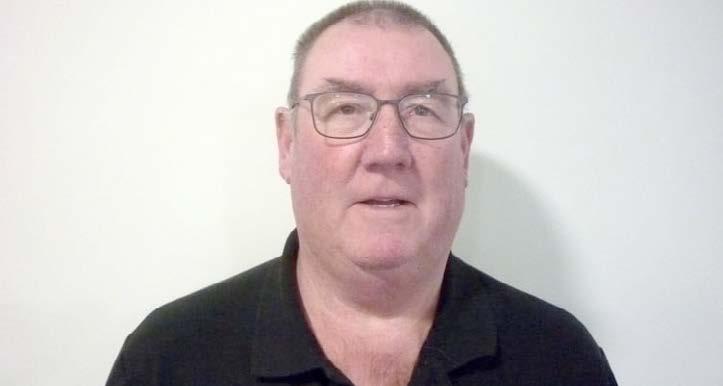
HAV e R f ORDW e ST’S Prendergast ward has a new county councillor after Independent candidate Alun Wills emerged victorious in a closely contested six-way by-election.
Wills secured the seat with 199 votes (31.6%), defeating five other candidates: Kaleb Jenkins (Welsh Liberal Democrats, 160 votes), Mike Mathias (Welsh Conservative Party, 136 votes), Scott Thorley (Reform UK, 71 votes), Alison Tudor (Welsh Labour, 57 votes), and James Henry Purchase (Wales Green Party, 8 votes).
The by-election, held on Tuesday,
February 11, 2025, was triggered by the resignation of former Conservative councillor Andrew Edwards. Edwards stepped down in December 2024 following a controversial tenure marred by allegations of racism. In 2023, he faced public backlash after reportedly stating that “all white men should have black slaves.” Although he withdrew from the Conservative group and served as an independent councillor following the scandal, he ultimately resigned from his role, citing family reasons.
The Herald at the time questioned if the recording of him saying those
words was created by using Artificial Intelligence.
Edwards originally won the Prendergast seat for the Conservatives in 2022, securing a decisive victory over Labour. However, his departure and the controversy surrounding his comments resulted in a highly competitive race that ultimately saw the Conservatives lose their grip on the ward.
Wills’ victory as an independent marks a significant political shift, reflecting voter dissatisfaction and a changing political landscape in Haverfordwest.
Speaking after his win, Wills vowed to “insist on council tax value for money” and pledged to do his “utmost to revive the fortunes of Haverfordwest town centre.”
He will take office at a time when Haverfordwest’s regeneration remains a key concern for residents. Major projects such as the Western Quayside redevelopment and the proposed Public Transport Interchange are

already in motion, with the aim of boosting the local economy and improving connectivity.
Additionally, Wills is expected to focus on tackling rising council tax costs, an issue that has sparked growing frustration among residents. With an independent now representing the ward, the political landscape in Pembrokeshire continues to evolve. The question remains whether this result signals a broader trend of voters shifting away from traditional party politics.


cRIcKeT-MAD local MS Sam Kurtz raised the efforts of two local cricket clubs to give something back to their communities and improve their facilities in the Senedd on Tuesday, February 11.
Mr Kurtz, who plays for Fishguard CC, is well-known - possibly notoriousin local sporting circles for being a keen participant in whichever sport he turns his hand to.
On Tuesday, he asked for a Welsh Government statement from the Minister for Culture, Skills and Social Partnership on the support available to grassroots cricket clubs in Wales.
Jon Coles jon.coles@herald.email
While doing so, he raised the example of Pembroke Dock Cricket Club, which is currently fundraising for new changing rooms for men, women and juniors at its ground at Imble Lane.
Sam Kurtz said: “I’ve enjoyed many a tough game against the Dock, who’ve done amazing charity work over the years, raising some £45,000 for local charities. Now it’s time that support is given to them so that they can continue to grow. They are working with the local authority and the Enhancing
Pembrokeshire grant, but further support is needed.”
Sam Kurtz continued: “Neighbouring Pembroke Cricket Club has also worked tirelessly since the pandemic, improving their facilities at Treleet, including new nets, covers for the wicket and refreshing the pavilion. They’ve even been able to introduce a third senior side into the Pembrokeshire league, which shows the growth of the game in the county of Pembrokeshire.”
Mr Kurtz concluded by asking for a statement from the Minister about how he is working with Sport Wales, the England and Wales Cricket Board and Glamorgan Cricket to offer support for grassroots cricket clubs so that one of the world’s leading sports can continue to grow across our country.
The Welsh Government’s business manager, Jane Hutt MS, is notorious for not wanting Welsh Government Ministers to give statements on anything that isn’t on their news grid. Every week, MSs ask for statements on issues important to their constituents or of national importance, and Jane Hutt finds new ways to say “no.”
Mr Kurtz was probably optimistic about asking for a minister to make a statement about funding grassroots sport, a subject in which hundreds of thousands across Wales are interested but in which the Welsh Government has minimal interest.
Sure enough, Jane Hutt responded: “Now, this is something where Sport Wales is very engaged on with the grant funding scheme, and also, I have to say, I’ve been able to fund through the community facilities programme some of the improvements that are needed and refurbishments that are often needed in these often voluntaryowned community clubs. So, I hope that you will also look to the Pembrokeshire Association of Voluntary Services, which has a funding portal because there are many trusts and sources of community funding. But certainly, it’s important that you’ve brought this to the attention of the Chamber, and we can celebrate that vibrancy of cricket and enjoy the season as it starts, especially Glamorgan, which I’d say is a bit biased.”
In short: “No, I won’t ask the Minister to make a statement. I’ll patronise you and the cricket clubs by telling you how to suck eggs. And, by the way, Glammy-Glammy-Glammy-Glammy Glamorgan.”
Highlighting the importance of grassroots sport and the need to support it raised its profile and focused attention on two of Pembrokeshire’s sports clubs who are doing the most to feed back into their community and provide more opportunities for participation. While Mr Kurtz didn’t get his statement, he managed to get Senedd time to shine a light on those clubs and their efforts.

STAff at a local branch of Marks and Spencer have spoken of their fear at being confronted by a customer who was shouting at them while brandishing a three-foot stick.
“I’ve worked in the store for the last ten years, but I’ve never experienced a male being that aggressive,” said Aly Barnes in a victim impact statement read out to Haverfordwest magistrates this week.
“This was the first time I’ve ever been in genuine fear of a customer.”
The incident took place in the Carmarthen branch of Marks and Spencer on January 24 when Martin Sands, 45, was seen entering the food hall and placing some steaks inside his rucksack.
Store worker Aly Barnes gestured towards him to put the steaks back, to which Sands replied, “It was worth a try.”
“Aly Barnes asked him to leave, but the defendant became aggressive,” Crown Prosecutor Nia James told Haverfordwest magistrates this week.
“He told her he was homeless and lived outside, across the street.”
Sands continued to approach Ms Barnes, forcing her to raise her arm to cover her head.
“She believed this was necessary

Sarah Jane Absalom sarah.jane.absalom@herald.email
to protect herself from anything he would do to her,” said Nia James.
“She could feel him spitting saliva in her face while he was shouting at her.”
Hearing the commotion, Ms Barnes’ colleague, Katarzyna Evans, approached Sands and attempted to de-escalate the situation. Sands responded, shouting, “You devil worshipper.”
Hearing the aggressive shouting, a store manager entered the food hall where he saw Sands moving closer to Ms Barnes.
“He put himself between them,
A HAVeRfORDWeST woman has been jailed for assaulting a man in Pembroke Dock earlier this month.
Amy Woolston, 21, of no fixed abode, appeared at Haverfordwest Magistrates’ Court on Monday (Feb 10) charged with two counts of assault against Paul Gurney on February 1.
Woolston had initially been charged with assault occasioning actual bodily harm under section 47 of the Offences Against the Person Act 1861, but the prosecution offered no evidence, and the charge was discontinued.
However, she pleaded guilty to a
lesser charge of assault by beating under section 39 of the Criminal Justice Act 1988.
Magistrates sentenced Woolston to 10 weeks in custody, citing the severity of the injuries sustained and her previous record for similar offences. She was also ordered to pay £125 in compensation to the victim and £85 in prosecution costs.
The case was heard before magistrates Mr E Jones, Mrs C Patching, and Mrs J Robson. The prosecution was led by Sian Vaughan, while Woolston was represented by Jess Hill of Welch and Co Solicitors.

because he felt that Martin Sands was far too close to the pair, and believed he was going to punch one of them because he was so aggressive.”
The court was told that earlier that afternoon, Sands had been seen entering the Ladybug store in Carmarthen by an on-duty security guard. He was heard saying to a female member of staff, “I’m going to hit this stick over his head.”
“The security guard knew the threat was directed at him, and the female member of staff was shocked,” said Nia James.
After repeating the threat, Sands was told to leave the store and was seen walking down Lammas Street, waving the stick and shouting.
Following his arrest in Marks and Spencer, Sands was taken to Carmarthen police custody suite, where he became increasingly agitated, throwing food and a cup of coffee over the wall. This had to be removed by a contracted cleaner at a cost to Dyfed-Powys Police of £188.
Appearing before magistrates via a video link from Swansea Prison, Sands pleaded guilty to using threatening, abusive, or insulting words and behaviour likely to cause harassment; common assault of Aly Barnes; common assault of Katarzyna Evans; and causing criminal damage to a police cell.
Sands was represented in court by solicitor Michael Kelleher.
“He was living rough in Carmarthen and he overreacted to the staff in Marks and Spencer, who believed he was going to steal the steaks,” he said.
“This wasn’t his intention as he had the money to pay. He’s very frustrated at his behaviour, but he realises now that at the time he was too proud to ask for help for his homelessness.”
Sands was sentenced to ten weeks in custody. He was ordered to pay £50 compensation to Aly Barnes and Katarzyna Evans, a £154 court surcharge, and £85 costs.

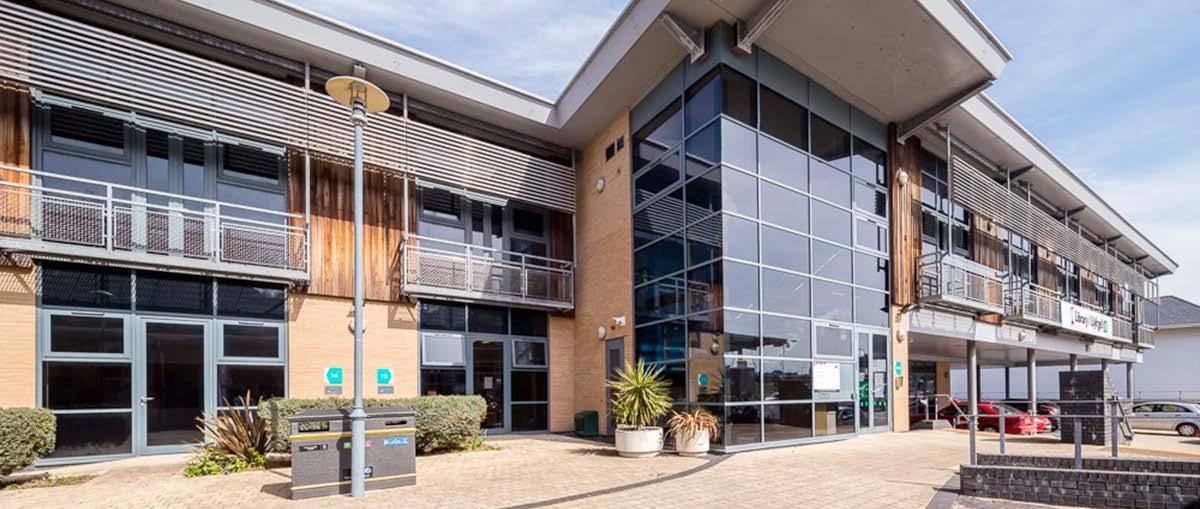
THe PORT Of MIlfORD HAVeN has confirmed that it is providing “significant financial support” to Milford Haven Library, with its total contribution over the lifetime of Pembrokeshire county council’s lease agreement until 2038 amounting to “many hundreds of thousands of pounds.”
The statement follows public frustration over secrecy surrounding the rent paid by PCC, with officials previously refusing to disclose the figure. Pembrokeshire County Council has now confirmed that the rent stands
at £1,921 per month, or £23,052 per year, which accounts for 17.6% of the library’s total running costs.
At a Milford Haven Town Council meeting last week, PCC’s Head of Cultural Services, Mike Cavanagh, stated that he had been asked by the Port not to disclose the rental figure, leading to accusations of a lack of transparency over public spending on a statutory service.

In response to the controversy, Tom Sawyer, chief executive at the Port of Milford Haven, told The Herald: “We have always recognised the significant social value generated by the Library in Milford Haven. It is a true community hub providing vital services and opportunities for people of all ages.”
Sawyer confirmed that the Port had committed to financial support long before PCC’s recent cost-cutting review, stating: “Prior to this public consultation, we had already committed
to provide significant financial support to the Library service which, over the lifetime of Pembrokeshire County Council’s lease agreement up to 2038, amounts to many hundreds of thousands of pounds.”
While the Port remains engaged in discussions with PCC and Milford Haven Town Council, Sawyer stressed the broader role of the Port in community funding.
“Each year we set aside around 10% of our annual profits to support organisations, either through direct funding or partnership working, that
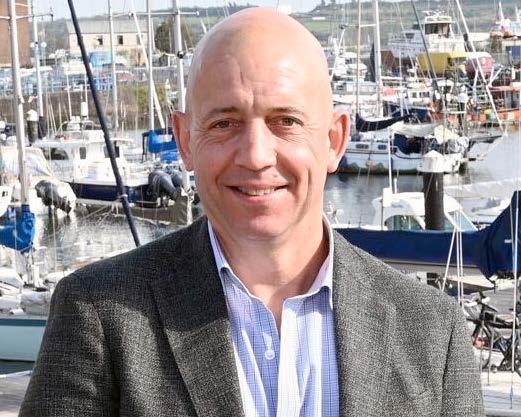

are delivering three core outcomes: a safe and enjoyable Waterway; a sustainable and resilient environment; and a vibrant and prosperous community. We are proud that due to the Port of Milford Haven’s financial sustainability we will provide almost half a million pounds of community benefit during 2025.”
Despite this, some councillors remain concerned about the decision to charge PCC rent for a statutory service, particularly given the Port’s obligations as a Trust Port to benefit the local community.
cOuNcIl DefeNDS lIBRARy cONSulTATION PROceSS
A spokesperson for Pembrokeshire County Council said: “The Library Service, along with other Council services, has been asked to put forward proposals to reduce costs and/ or increase income.”
PCC explained that its 2024 Library Needs Assessment had shown that while respondents opposed outright library closures, there was support for reducing premises costs and increasing volunteer involvement.
“Over the last 16 years, Milford Haven residents have enjoyed highquality library provision in the town at Cedar Court, during which time the Port of Milford Haven has been extremely supportive, and we are grateful for their ongoing support.”
The spokesperson further revealed that the Port has been providing a “markedly discounted” rental rate for the library, stating:
“Recognising the important community role the library plays, the
Port of Milford Haven has discounted the rental amount to £1,921 per month, which is significantly lower than its demonstrable commercial value. The rent is currently 17.6% of total running costs.”
lIBRARy cOulD STIll Be MOVeD
Despite confirming the discounted rent, PCC has reiterated that it is considering relocating the library to a smaller or cheaper site to ensure its long-term viability. This includes a proposal to move the library to the Meads Leisure Centre, as well as the possibility of transitioning to a Community Managed Partnership.
“The County Council hopes to be able to sustain this high-quality service during these financially challenging times and solutions are
currently being sought through the consultation process and ongoing discussions with interested parties.”
PCC has urged Milford Haven Library users and local residents to participate in the consultation, which is open until Monday, February 17.
The consultation can be accessed at: https://www.pembrokeshire. gov.uk/have-your-say/proposedchanges-to-the-library-service.
Councillors discuss library future at town council meeting
Councillors discuss library future at town council meeting
The Milford Haven Town Council discussed the future of the library at their full council meeting on Monday, February 10. During the meeting, councillors debated the potential relocation of the library and the request for the town council
to contribute £13,000 towards its running costs.
Councillor Lee Bridges suggested an alternative location, proposing that the library could be moved to the old Town Hall, which is owned by accountant Bruce Evens. He argued that a more central location could provide a better long-term solution.
Meanwhile, Councillor Colin Sharp raised concerns that the Port, as a Trust Port with a duty to benefit the community, should have done more to support the library’s future.
“Have you spoken to the landlord? It’s going to look like very bad press for that company, which is allegedly a community organisation, if the library can no longer operate.”
However, Councillor Nicola Harteveld defended the Port’s position. She said: “The Port are a business and can’t be expected to give the library to the town for free, as they already do a lot for the town.”
The council has not yet made a decision on providing funding, but a final vote on whether Milford Haven Town Council will contribute £13,000 to the library is scheduled for their next meeting on February 24.
W HAT HAPP e NS N ex T ?
• Milford Haven Town Council will vote on February 24 on whether to contribute £13,000 to help fund the library for another year.
• The public consultation closes on February 17, after which PCC will review feedback before making a final decision.
• The future of Milford Haven Library remains uncertain, with councillors, residents, and campaigners continuing to push for clarity and a long-term solution.
• This is a developing story. The Herald will provide further updates as discussions continue.


feSTIVAl organisers in Pembrokeshire have warned they could be forced to move their events to england in 2026 due to new rules restricting temporary campsites.
The Pembrokeshire Coast National Park Authority has backed plans to require landowners to apply for planning permission for pop-up campsites, which can currently operate for up to 28 days a year without formal approval.
feSTIVAl fAceS uNceRTAIN fuTuRe
Amber Lort-Phillips, organiser of The Big Retreat wellbeing festival in Lawrenny, said the new rules threaten the event, which brings an estimated £1 million to the local economy.
“It’s essential. We couldn’t run without our permitted development because it’s how we run our campsite,” she said.
“The impact is we might have to move it. It’s our home for The Big Retreat and it’s not fair. We are potentially having to look at other sites and move the festival outside of Wales.”
She criticised the National Park Authority’s approach, claiming there
Tom Sinclair editor@herald.email
was “no real evidence” for imposing blanket restrictions and no guarantee that temporary sites would be granted planning permission.
The Pembrokeshire Coast National Park is the only national park in Wales seeking to impose stricter campsite controls, with Snowdonia and the Brecon Beacons making no changes to the 28day rule.
The Authority insists the changes will “create a level playing field” between pop-up and permanent sites, arguing that unregulated camping is causing environmental harm and enforcement challenges.
Chief executive Tegryn Jones said temporary campsites accounted for 12% of the Authority’s enforcement workload and had led to a “stream of complaints.”
“There is currently no control over temporary campsites,” he said. “We are seeking to take a small measure to even

“These plans are a knee-jerk reaction to the post-Covid surge in visitors,” he said. “We provide extra income for farmers and accommodation for tourists, but the Park Authority seems intent on making it impossible.”
MuSIc
Joe Worley, organiser of Westival, a music festival in Manorbier that attracts 2,500 visitors each year, said he had not been directly consulted and was shocked by the plans.
“The [2026] event wouldn’t be able to go ahead without the campsite,” he said. “If we couldn’t get planning permission for that particular field, we’d have to find a new site. It feels quite damaging to a lot of businesses.”
The measures have won support from Ben Carden of the Woodlands Champions Club, which runs 16 sites in Pembrokeshire.
the playing field.”
However, critics argue that the consultation process was inadequate. The Authority received 120 responses, equivalent to just 0.5% of the National Park’s 23,000-strong population.
Dai Williams, who has operated Clifftops Camping near Druidston since 2021, said the new restrictions could “shut down” businesses.
“Quite often, there are serious implications with pop-up campsites,” he said. “There can be noise nuisance for local residents. I attended one pop-up campsite that had over 200 pitches with just three toilets and one washbasin. There needs to be a standard of camping.”
A further consultation will run until 21 February, with a final decision expected in the spring. If approved, the restrictions will come into force on 1 January 2026.
With festival organisers warning they may be forced to leave Wales, the debate over the future of pop-up campsites looks set to continue.

A cOuRT has heard how a woman found carrying a kitchen knife through the centre of Pembroke Dock told police officers: “I can’t remember why I did it, because I was on drugs.”
999 calls were made by members of the public, stating that a person had been seen walking down Bush Street, Pembroke Dock, on January 24, carrying a large knife.
An on-duty police officer saw Lacey Sharp walking towards his police vehicle, carrying a large kitchen knife in her right hand.
“Fearing for his safety, he drew his taser and red-dotted the defendant,” Crown Prosecutor Nia James told Haverfordwest magistrates this week.
“He told her to drop the knife and she complied.”
Nia James said that when Sharp was questioned by officers about why she was carrying the knife, she replied: “I can’t remember…I was on drugs.”
The offence was committed while Sharp was serving a 12-month Community Order for assaulting an emergency worker in December 2024.
Sharp, 25, of Bethel Court, Bush Street, Pembroke Dock, pleaded guilty to possessing a knife in a public place.

Her solicitor, Tom Lloyd, informed magistrates that between 2020 and 2025, the defendant had been “completely offence free.”
“Things were going exceptionally well for her and she was living and
working in Cardiff where she was the manager of a bar, taking on significant responsibilities,” he sai.
“But due to her mental health, things fell apart.
“She moved back to Pembrokeshire
and despite the support she’s receiving from her family, it’s been a real struggle for her. She can clearly remain offence-free under the right circumstances, but at the moment, those circumstances don’t seem to be quite right.”
Meanwhile, probation officer Julie Norman said that prior to being found in possession of the knife, Sharp had taken a quantity of unprescribed valium. Ms Norman added that her engagement with the probation service since being placed on the Community Order had been positive.
After considering the facts, magistrates sentenced Sharp to six months in custody, suspended for 12 months. She must carry out 20 rehabilitation activity requirement days, a 120-day alcohol abstinence order and must pay a £154 court surcharge and £85 costs. A forfeiture and destruction order was imposed on the knife.
“We believe that there are realistic possibilities of rehabilitation, but you’ve now got to be very, very careful over the next 12 months,” said presiding magistrate Mary Smith.
“We want to see you back on track, living the life that you were living before.”



tackled a blaze in Rhydargaeau, Carmarthenshire in the early hours of Monday (feb 10) after a building was engulfed in flames.
Mid and West Wales Fire and Rescue Service crews from Carmarthen and Llandysul were called to the scene at 1:31am.
The building, made of corrugated sheeting, was well alight upon their arrival.
Firefighters used four breathing apparatus sets, two hose reel jets, and small gear to bring the fire under control. The building was completely destroyed, but no casualties were reported.
Crews remained at the scene to dampen down the area before leaving at 3:32am.
A NeW alert system for the B4318 at gumfreston has been approved by Pembrokeshire county council’s Cabinet, following over a year of campaigning by cllr Rhys Jordan.
The system, which operates similarly to the Cleddau Bridge closure updates, will notify registered users in real time when the road floods and becomes impassable. The aim is to help motorists plan ahead and avoid disruption.
Cllr Jordan acknowledged that while a major upgrade to prevent flooding entirely would be preferable, such a project is not expected in the near future. However, he pledged to continue pushing for long-term improvements to the road.
In the meantime, he hopes the alert system will provide some relief for those who rely on the route.
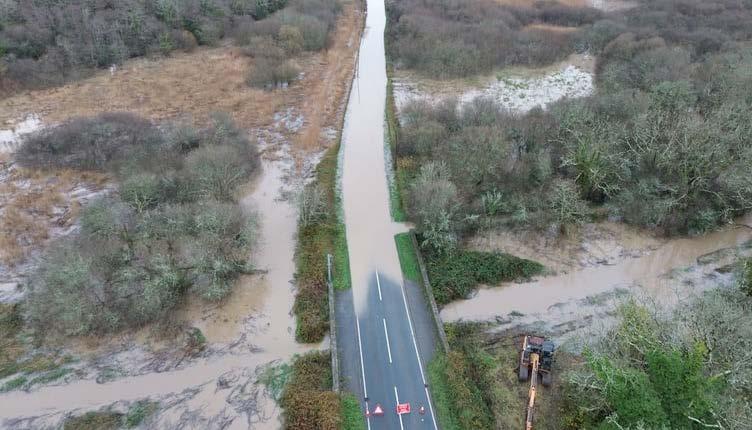
WAleS’ education system is in turmoil, with an alarming new report from estyn exposing deeprooted issues plaguing schools across the country. The watchdog’s findings highlight “stubbornly low” attendance rates, a critical shortage of teachers, and a growing crisis in pupil behaviour, all of which have worsened under labour’s leadership of the Welsh government.
The report warns that the continued failure to address these systemic problems is leading to declining educational standards and increasing pressures on teachers, many of whom are leaving the profession due to stress and inadequate support. With concerns mounting, opposition parties have called for urgent action to reverse the decline and restore confidence in Welsh education.
Estyn’s findings reveal a bleak picture of the current state of schools in Wales. Pupil absenteeism remains persistently high, with attendance figures showing no significant improvement since the COVID-19 pandemic. This, coupled with recruitment difficulties, has left many schools struggling to maintain adequate staffing levels, further exacerbating the challenges facing educators.
Adding to the crisis, Estyn highlights deteriorating pupil behaviour, with reports of increased disruption in classrooms leading to talented teachers leaving the profession. The watchdog criticises the Welsh Government for failing to provide clear guidance and sufficient resources to tackle these pressing issues.
Reacting to the report, Welsh Conservative Shadow Cabinet Secretary for Education, Natasha Asghar MS, condemned Labour’s handling of the education system, stating: “The Welsh Conservatives have long warned about the crises facing our schools—soaring

Tom Sinclair editor@herald.email
absenteeism, teacher recruitment struggles, and rising school violence.
“Estyn’s report makes it clear that pupil attendance is ‘stubbornly low,’ recruitment issues are undermining educational standards, and pupil behaviour is driving talented professionals out of teaching.
“Labour’s failure to address these challenges has left Welsh education in crisis. Weak guidance, underfunding, and a lack of support for teachers are failing our children. Welsh education is broken under Labour—only the Welsh Conservatives can fix it.”
The Welsh Government has yet to formally respond to the criticisms, but Labour ministers have previously defended their education policies, pointing to ongoing investments in school infrastructure and teacher training programmes. However, critics argue that these efforts have fallen short, leaving schools ill-equipped to tackle the fundamental issues identified in Estyn’s report.
A PeMBROKe DOcK man has been found guilty in his absence of multiple offences, including harassment and criminal damage, following a trial at Haverfordwest Magistrates’ court on Monday (feb 10).
Stuart Cooper, 49, of 5C The Terrace, The Dockyard, Pembroke Dock, was convicted of harassment without violence, criminal damage to property under £5,000, and failing to surrender to court bail.
The court heard that on December 24, 2023, Cooper sent unwanted text messages and turned up uninvited at the home of Sara Mallams on Waterloo Road, Pembroke Dock. Over a two-day period, from December 22 to December 24, his actions amounted to harassment, which he knew or ought to have known was distressing.
On the same date, Cooper damaged a front double-glazed window at Ms Mallams’ property, valued at £150, without lawful excuse.
Cooper had pleaded not guilty to both charges on November 15, 2024, but was found guilty in his absence at Monday’s hearing.
Additionally, Cooper failed to attend his trial at Haverfordwest Magistrates’ Court, despite being released on bail in December 2024. As a result, the court issued a warrant for his arrest without bail.
The warrant was granted on the grounds that the offences Cooper was convicted of are punishable by imprisonment.
Haverfordwest Magistrates’ Court has yet to confirm the date of sentencing, pending Cooper’s arrest.
Education unions and opposition parties are now demanding immediate intervention to prevent further decline.
Among the key recommendations are increased funding for schools, stronger behavioural policies, and targeted support for struggling pupils. There are also calls for a review of teacher
recruitment strategies to attract and retain high-quality educators.
With Welsh education at a crossroads, the pressure is mounting on the Labourled government to take decisive action. As schools continue to grapple with these mounting challenges, the future of education in Wales remains uncertain, with many questioning whether real change will be delivered before it is too late.


ex-MAyOR’S RePORT TO cOPS OVeR NeylAND TOWN cOuNcIl BullyINg
A FORMER Neyland Mayor has reported Neyland Town Councillor
Sinclair editor@herald.email
David Devauden to the police following explosive allegations of bullying and harassment against the town’s Clerk,

Libby Matthews.


The controversy stems from an article published by The Pembrokeshire Herald on February 7, which revealed the contents of an email sent by Cllr Devauden to the Clerk. The email, described as containing intimidating language, personal attacks, and a demand for resignation, has been widely condemned.
Former Neyland Mayor Andrew Lye, who resigned in 2023 amid what he described as a “toxic” council environment, has now taken action. He visited Haverfordwest Police Station with a copy of The Herald article and formally reported the matter, obtaining a Storm reference number as evidence.
A cOuNcIl IN cRISIS
The scandal is the latest in a series of controversies to engulf Neyland Town Council, which has been dogged by allegations of misconduct, internal disputes, and division over the past two years. In June 2023, Lye stepped down following allegations of racism, antisemitism, and anti-Islamic sentiment from Cllr Brian Rothero, based on an old blog post regarding male circumcision. This matter, along with another complaint made by Cllr Steve Thomas alleging conspiracy and fraud, is currently being investigated by the Public Services Ombudsman for Wales.
Lye’s removal from the mayoralty was particularly controversial due to the nature of the allegations. In a 2008 blog post, Lye questioned the necessity of religious circumcision, stating that if God “made man in his own image,” the practice seemed contradictory. This remark was later used by Cllr Rothero to claim Lye had engaged in antisemitic
and anti-Muslim rhetoric, leading to his ousting.
The controversy drew national attention, with the National Secular Society (NSS) and the men’s health charity 15 Square publicly condemning the council’s decision to remove Lye. The NSS and 15 Square argued that the allegations against Lye were “baseless” and warned that punishing him for raising concerns about circumcision would create a chilling effect on free expression.
The charities pointed out that circumcision has been listed as a “harmful” practice by the United Nations and highlighted documented cases where children in the UK have suffered serious complications, including life-threatening haemorrhages and deformities. The NSS also referenced a 2018 YouGov poll in which 62% of the British public supported banning nonmedical circumcision of boys.
PuBlIc OuTRAge gROWS
Lye, angered by the contents of Devauden’s email, stated: “I was totally incensed by the words I read in the Herald article.” He referenced key parts of the email, which allegedly included the phrases “You’re a dead (wo)man walking”, “You’re not fit for purpose”, and comments about Matthews’ mental health and outside influences.
Commenting on the broader situation, Lye added: “The people of Neyland and the Town Council deserve better. The Town Clerk certainly does not deserve to be treated like this. Cllr Devauden should resign as a matter of urgency if just one word in that article is correct. He has brought the Town Council into disrepute.”
On social media, many Neyland residents have expressed outrage over the email’s contents, with some suggesting that all councillors should resign to allow for fresh elections. Lye noted that at the 2022 elections, only four councillors (himself included) were elected unopposed, while the remainder were appointed through co-option.
Lye also highlighted the notable silence from councillors Peter Hay, Mike Harry, Ash Phelan, and Ellen Phelan amid the ongoing crisis. However, he was quick to defend them against accusations of complicity, stating: “They have always fought for what is good for the town and the council. Because they were part of the complaints made to the Ombudsman, they have been effectively silenced from speaking out.”
The former mayor suggested that these councillors had been “treated appallingly” by others on the council, further deepening the divisions within Neyland’s leadership.
As investigations continue, many are questioning whether Neyland Town Council is capable of governing effectively in its current state. Lye emphasized that he hopes the Ombudsman’s report will “finally bring accountability” to a council he believes has been failing for years.
“If the content of Devauden’s email is any indication of the wider culture within the council, then the people of Neyland, Pembrokeshire, and even Wales will be shocked when the Ombudsman’s findings are finally released.”
Lye lamented that, unlike health
boards or county councils, there is no mechanism to place dysfunctional town or community councils under special measures. He stated that Neyland’s situation would likely justify such an intervention if it were possible.
While the matter is now in the hands of the police, it remains to be seen whether any legal action will follow. Under the Malicious Communications Act 2003, it is a criminal offence to send electronic communications that are “grossly offensive, indecent, threatening, or designed to cause distress.”
Lye has urged authorities to seize Cllr Devauden’s electronic devices to examine all communications between councillors over the past two years, arguing that the public would be shocked by what has been said behind closed doors.
“I am against evil and bullying, so I had to go to the police to report this possible crime. Neyland deserves better, and I want it to get back to doing what it should be doing – where everyone works together for the good of the town.”
With the Ombudsman’s report expected in the near future, and the police investigation now officially logged, Neyland Town Council faces intense scrutiny. Calls for Cllr Devauden to resign are growing louder, while broader questions remain over whether Neyland’s governance structure can withstand the deep divisions that have plagued it for years.
For now, Neyland residents are left waiting to see what action—if any—will be taken to restore faith in their council.
A HAV e R f ORDW e ST motorist has appeared in court after crashing his Renault c lio into a roundabout near the c leddau Bridge, Pembroke Dock, when he was over the drink-drive limit.
Police were called to the bridge soon after 3:00am on January 25, following reports by a member of the public who had seen the vehicle crash into the roundabout and turn into the East Llanion Industrial Estate. Five minutes later officers saw Gabriel Dascalu, 29, walking along the road.
“He was the registered keeper of the vehicle and he smelt of alcohol,” Crown Prosecutor Nia James told Haverfordwest magistrates this week.
“He told them he’d been to a party where he’d drunk alcohol before

getting into his vehicle and driving to the industrial estate.”
Subsequent tests showed that Dascalu had 56 mcg of alcohol in his breath. The legal limit is 35.
Dascalu, of Baring Gould Way, Haverfordwest, pleaded guilty to the charge of drink-driving and was represented in court by solicitor Tom Lloyd.
“He’s going to suffer greatly as a result of the loss of his licence,” he said. “He has a managerial role in his employment but there are going to be issues as a result of the rural location of his job and the hours that he works, which can be antisocial.”
Dascalu was fined £500 and ordered to pay a £200 court surcharge and £85 costs. He was disqualified from driving for 14 months.

PAR e NTS in Pembrokeshire looking for a friendly and supportive way to get outdoors with their little ones can now join free weekly walking groups in Broad Haven and Pembroke.
Organised by the Pembrokeshire Coast National Park Authority, these walks provide a relaxed and welcoming environment, offering a chance to connect with other parents while enjoying gentle exercise, spotting wildlife along the way, and taking in the beauty of the local area.
The Broad Haven walks take place every Monday at 10am, starting from the Park Authority’s car park outside the YHA in Broad Haven, while the Pembroke group meets every Friday at 10am at Pembroke Commons car park, opposite the Pembroke Carvery. Both walks begin at 10.15am and are free to attend. They are pramfriendly, making them ideal for new parents, parents-to-be, and those with toddlers.
Each walk lasts between 45 and 60 minutes, with nearby baby-changing
Tom Sinclair editor@herald.email
facilities and local cafés available for refreshments before or after the stroll.
Along the way, parents can take part in fun, age-appropriate activities with their little ones while benefiting from fresh air, gentle movement, and the support of a like-minded community.
Get Outdoors Coordinator, Amber Manning, organiser of the walking groups, encourages parents to come along and experience the benefits of connecting with others in a natural setting, and says:“These walks are a fantastic way for parents to get outside, socialise and enjoy Pembrokeshire with your children. Whether you’re looking to meet new people, get some fresh air, or simply enjoy a relaxed walk, everyone is welcome.”
For more information, contact Amber Manning at 07483 377414 or via email at amberm@ pembrokeshirecoast.org.uk

AM e NDM e NTS to a recentlygranted scheme for a replacement Lidl store in Milford Haven, which will be nearly a half bigger and employ up to 40 people, have been approved by county planners.
In October, Lidl Great Britain Limited was given conditional approval to demolish the existing Lidl foodstore and adjoining properties –including the Enterprise Rent-a-Car unit – at Great North Road, Milford Haven, building a new Lidl foodstore with associated works.
A supporting statement through agent CarneySweeney said: “The existing Lidl store is small and of an early generation format. Owing to Lidl’s well-established and growing local customer base, Lidl has outgrown its existing premises which no longer meets modern shopper requirements, and a larger store is sought to better serve local customer demand.
“In addition, the existing store is inefficient with regards to warehouse operations. The proposal for a new store aims to alleviate the problems presented by the existing store.”
The application said the development would create up to 40 jobs.
The car park will provide 93 spaces, including six disabled spaces, nine ‘parent & child’ spaces and two EV charging spaces, an increase in overall provision of 11 spaces.
After approval, with a long string of conditions, Lidl has sought to vary some of them, recently

Tom Sinclair editor@herald.email
applying for the “discharge of conditions,” amendments relating to the Construction & Environment Management Plan (CEMP), details of external lighting and surface water drainage, a site assessment report condition, and a remediation scheme condition.
No issues were raised by Pembrokeshire planning officers in the early ‘discharge’ of the conditions,
but Milford Haven Town council had objected.
A report by planning officers said: “Milford Haven TC, whilst supporting the principle of the site’s redevelopment to provide a new foodstore, have objected to the applications to discharge [the conditions].
“However, following correspondence it is apparent that the objections are based on a misunderstanding, that is that the applications seek to remove the conditions in their entirety.
“The purpose of the applications has been clarified with the town council which has responded by stating: ‘The town council unanimously voted on their position on this subject at full council so I cannot change this decision. As originally stated – MHTC support the overall project and original application however the wording of these further ‘discharge’ matters are best decided upon at county level’.”
The amendments to conditions have been conditionally approved by county planners.

THe lAND and sea assets in Pembrokeshire and ceredigion are amongst the most lucrative of those owned by the crown estate. In 2023, they helped accumulate a Welsh financial handover totalling £853m, resulting in a record net profit to the UK public finance coffers of £1.1billion. This represented a marked increase in Wales’ contribution, compared to its 2007 asset value of just £21.1m.
Sarah Jane Absalom sarah.jane.absalom@herald.email
The escalation is being driven by the rising demand for renewable energy projects, and with the offshore investments that are currently taking place in seabed of south Pembrokeshire, Wales’ contribution to the Crown Estate looks set to soar even further
But how much of this contribution
finds its way back to Wales? The answer, sadly, appears scant.
Instead of finding their way back to the Welsh public purse, profits generated from Wales’ green wealth are being distributed to the HM Treasury and the monarch’s Sovereign Grant, which funds a handful of senior members of the Royal family. In 202324, the sovereign grant amounted to £86.3m.
Now, in a bid to ensure greater transparency and a fairer financial management, pressure is being put on the Government to allow the Crown Estate to be devolved to Wales, putting it on equal footing with Scotland and Northern Ireland.
“The value of the Crown Estate in Pembrokeshire and Ceredigion is hugely significant,” commented Ben Lake, MP for Ceredigion and Preseli.
“The Crown Estate owns 65% of Wales’s foreshore and riverbeds, and more than 50,000 acres of land. And a considerable amount of this lies in the foreshores around south Pembrokeshire and the more rural areas of Ceredigion.
“Welsh County Councils, including Pembrokeshire and Ceredigion, are having to make payments to the Crown in leasing fees and in 2023, this sum was nearly £300.000 Yet this is happening at a time when local services in Wales are under severe pressure. It doesn’t strike me as fair that we have these significant natural assets which are generating significant amounts of profit, yet they’re not returning back to Wales.
“The UK government says it’s

spending money here, but when it comes to the provision of health, education and social services, Wales only gets a Barnett formula of roughly just under 5%.”
In 2024, Scotland, which devolved from the Crown Estate in 2017, saw more than £100m enter its coffers as a result of its offshore energy.
“And the potential for Wales is just as significant,” said Ben Lake. “Engineers and experts are all pointing to the fact that the regeneration of renewable energy in Wales is going to be big and over the next ten years, the waters around Wales are going to see some of the biggest developments in offshore wind. But unless the Crown Estate is devolved, Wales is going to be severely shortchanged.”
The Crown Estate owns more than £603m of land in Wales which includes:
• 65% of Wales’ coast and riverbeds;
• The seabed which extends up to 12 miles out to sea;
• 50,000 acres of land;
• 250,000 acres of mineral deposits and
• All gold and silver deposits.
Last week Westminster blocked the transfer of Crown Estate management to the Welsh Government by voting down an amendment tabled by Plaid Cymru to the Crown Estate Bill.
The Liberal Democrats also tabled an amendment calling for Crown Estate assets to be handed to Wales. But both amendments were blocked by Labour MPs.
The stance contradicted recent comments from Wales’ First Minister, Baroness Eluned Morgan, who said she was “fighting very hard” for more control.
The Bill is expected to return to the House of Commons later this month for further debate and a bid to enforce a vote on the issue,
“Even if we’re able to get a small percentage of what Scotland is generating, Wales will be able to start investing in its public services given the acute pressures that are currently being placed on the NHS and the county councils,” concluded Ben Lake. “This will go a long way to alleviate the pressures they’re under.
“And further down the line, it’s possible that Wales could then start considering its own Wealth Fund, similar to what has happened in Norway as a result of its oil and gas licensing. Through its profits and interest, the Norwegian Wealth Fund has become one of the largest in the world. In 2024 it generated $220 billion to subsidise a significant amount into public services
“AND WAleS IS NO DIffeReNT.
“It’s now time for the money that’s being generated from Wales’ natural assets to come back for the benefit of the people who live here.”

Pe MBROK e SHIR e’ S Bluestone National Park Resort, one of West Wales’s largest employers, is celebrating National Apprenticeship Week (10-16 f ebruary 2025) by continuing its commitment to supporting its employees in their career advancement through a range of education, training, and qualification opportunities.
With a workforce of nearly 900 employees, the resort near Narberth recognises the importance of investing in its people to ensure the continued success of the business and the growth of the local tourism and hospitality sectors, offering a wide range of employment opportunities in the local community.
“We believe that training and apprenticeships are a vital way to nurture the future of the tourism and hospitality industries in Pembrokeshire,” says Helen John, Bluestone Academy Manager. “Our programmes are designed to provide apprentices with the skills and knowledge they need to succeed, while also offering valuable work experience alongside our dedicated staff members.”
At the heart of this commitment is the Bluestone Academy, which provides a variety of apprenticeships, internships, and training programmes designed to equip individuals with the skills and knowledge needed to thrive

in their careers.
The academy offers a diverse range of opportunities, from entry level qualifications in areas such as Business Administration, Customer Service, Hospitality, Retail, and Accommodation Services, to Higher Apprenticeships in Leadership and Management.
“One of the key benefits of the Bluestone Academy’s apprenticeship programme is its work-based learning approach. Apprentices gain practical
experience while working alongside experienced professionals, allowing them to apply their knowledge and develop their skills in a real-world setting,” said Helen.
“They also have access to a support network of mentors who guide and assist them throughout their apprenticeship journey.”
Stuart Davies-Jaynes, Director of People Services, said: “Our apprenticeship programmes have a
positive impact on our apprentices. In addition to gaining practical skills and experience, apprentices could also earn a competitive salary while they learn.”
The academy also plays a crucial role in the professional development of existing employees. Currently, over 70 employees are enrolled in NVQs, diplomas, and HNCs as part of their apprenticeships, with 49 actively pursuing qualifications ranging from level 2 to level 7.
“We are proud to support the inner growth and development of our employees,” added Helen. “By providing opportunities for further education and training, we enable our staff to enhance their skills, advance their careers, and contribute to the overall success of the business.”
In addition to apprenticeships, the Bluestone Academy offers supported internships to provide valuable work experience and skills development opportunities.
The academy has partnered with Pembrokeshire College to welcome a third cohort of interns, with additional learning needs (ALN). These internships offer practical experience in various departments, helping individuals develop skills and prepare for future employment.
More details about career opportunities at Bluestone can be found at www.bluestonewales.com/ careers


TO celebrate Apprenticeship Week Wales 2025, a Mid Walesbased company, which has developed into global brand making accessories for superyachts and safety equipment, has highlighted the importance of apprentices to the business.
Providing well paid jobs for young people and developing their skills has always been the mantra for husband and wife team Bill and Brenda Brown since launching Makefast as a start-up engineering business 51 years ago.
Today, their business, Makefast, employs 114 people in Newtown, has satellite sales offices in America and Italy and exports its products around the world. The company currently has eight apprentice mechanical engineers on its books - six of whom were recruited in the last year.
Around 20% of the workforce is made up of either former or current apprentices and the company has plans to recruit another four apprentices this year, including budding electrical engineers, to specialise in control boxes for sunroofs and awnings.
Bill worked with local businesses and Mid Wales Manufacturing Group to establish a Shared Apprenticeship Scheme in the past, which gave young people the experience of working for a number of different companies.
One of the first shared apprentices was Stuart Bowen, who is now technical director of Custom Marine Developments, part of the Makefast Group, which provides bespoke engineering solutions for clients in the very high end of the luxury marine market.
“Makefast is now big enough to provide apprentices with the experience of working in different departments and we also offer the added bonus of overseas travel, which helps to attract talented and dynamic young people,” said Bill and Brenda’s son Chris Brown, who now runs the successful business with his brother, Michael.
“Our plan is to set group projects for our apprentices from design and

planning through to the manufacture of products. That way, they get to experience working in different departments and develop teamwork.
“Employing apprentices allows us to mould them with the skills we need in the business. They are hugely important because they are our investment in the future and we hope it will pay off handsomely. We would have struggled to grow the business without them.
“We like them to stay and offer them career progression opportunities but also understand that some want to travel and experience new challenges. Several have done that and come back to the company. Either way, we have grown the skills base for the area.
“That’s not to say that recruiting staff of the calibre we need is easy here in Powys, the least populated county in Wales with small pool of skilled staff.”
That’s why Makefast and fellow manufacturers are involved in talks with the Welsh Government to establish an Advanced Manufacturing Centre serving Mid Wales, which would provide a talent pipeline for
them.
The company currently works with training providers Myrick Training, NPTC Group’s Newtown campus and Shrewsbury Colleges Group to deliver apprentices and other learning programmes. It also supports engineering graduates and provides internships.
Chris Williams, Makefast’s senior planner, completed a series of apprenticeships over the last decade, culminating in a First-Class Honours degree in Industrial Engineering.
“I chose to become an apprentice because it offered the perfect balance of earning while learning, allowing me to gain hands-on experience while furthering my education,” he said.
“Makefast provided me with the opportunity to explore a diverse range of manufacturing processes, all of which have been instrumental in shaping my career and expertise in the engineering field.”
Jen Owen, production data controller, has grown with the company over the past decade and achieved a distinction in her HND in Manufacturing Engineering.
“An apprenticeship has always appealed to me because it allows you to gain qualifications and job experience without accumulating student debtyou earn while you learn,” she said. “From my experience, I would highly recommend an apprenticeship as a fantastic way to start your career.”
One of the latest apprentice recruits is Ted Madeley, who is working towards a Foundation Apprenticeship In Mechanical Engineering, said: “Engineering attracted me as a career because it is hands-on, practical and allows me to learn many useful skills.
“Working at Makefast has given me the opportunity to experience various areas within the company and develop my skills.”
Makefast Group has developed good links with high schools in North Powys and a private school in Shropshire to promote career opportunities. The company also welcomes work experience placements, a key recruitment source.
A group of Shrewsbury School students recently toured the business and engineering students from Newtown High School will pay a visit on Friday, as part of the Apprenticeship Week Wales celebrations.
Optimistic about business prospects, Chris revealed that Makefast Group has recently secured orders worth $500,000 from America and is targeting further export growth this year. Exports account for more than a half the company’s production. Poland, now the leading boat building country in Europe, is in the company’s sights and sales representatives have been hired to cover potential customers in the southern states of America.
Makefast Group is also acutely aware of its responsibility to the environment. Twelve per cent of its power is generated by solar panels and virtually all the company’s products are repairable or can be recycled.
More than £200,000 has been invested in new machinery and nitrogen generator in the past year to aid productivity and sustainability.

DuRINg National Apprenticeship Week, Coleg Cymraeg Cenedlaethol is proud to announce the names of 16 new apprenticeship ambassadors across Wales for the 2025 academic year.
The Coleg’s apprenticeship ambassador scheme was established in 2020 to give young people undertaking an apprenticeship the opportunity to promote the importance of bilingualism in the workplace and to encourage others to do their apprenticeship bilingually.
One of the ambassadors who is very proud to be doing his apprenticeship through the medium of Welsh is Thomas Lindsey-Jones, who is 16 years old and comes from Llanfair Caereinion.
Thomas is a lorry and heavy vehicle mechanic apprentice with the Wynnstay company at their headquarters in Llansanffraid. Thomas said,
“When Wynnstay heard that I was one of the ambassadors of the Coleg Cymraeg, they were very proud. The language is important to them and the fact that I speak Welsh was certainly
an advantage when I was applying for the apprenticeship. Colleagues appreciate being able to speak Welsh with me.
“I’m also very happy that I get to do the coursework through the medium of Welsh as all my education has been in Welsh until now, and I would have found it very difficult to do coursework in English. “
Another of the Coleg Cymraeg’s ambassadors is Lara Condy from Barry, who is an apprentice with the Deloitte company in Cardiff.
Lara started a degree course at university, but she soon realised that it didn’t suit her way of learning. Lara said, “In the sixth form, it’s very easy to be influenced by your friends, and follow the crowd to university. But it is very important that young people follow their instincts, and if university doesn’t feel right for them, I would encourage them to look at what other options are out there.
“I started a course at university, but that didn’t suit my way of learning - I needed to learn by doing.
“So I looked for another way and managed to get an apprenticeship

with the international company Deloitte. Although I don’t have much opportunity to speak Welsh at work, doing elements of the apprenticeship in Welsh means that I still get the opportunity to use the language after leaving school.”
Enlli Jones, who is 21 years old and originally from Llanrug, is an apprentice in Gwynedd Council’s accounting department. She sees it as a great advantage to be able to discuss work in Welsh and feels that it makes the experience of learning much better for her.
“Since Welsh is my first language, and all my education has been through the medium of Welsh, it was important for me to find a workplace that offered an apprenticeship through the medium of Welsh. It would have been unnatural for me to do an apprenticeship in English.
“It’s great in Gwynedd Council as everyone speaks Welsh.
“Because I’m doing an apprenticeship, I can see the reason behind learning things at college and can give examples from the workplace in exams. I understand questions

better from doing the work day-to-day, and know why they are asking them.”
The number of apprentices who do an activity through the medium of Welsh or bilingually has more than doubled since Coleg Cymraeg Cenedlaethol began working in the sector, increasing from 10% in 2016 to 25.3% in 2022.
Coleg Cymraeg has supported several strategic projects with 51 grants being awarded to colleges and 11 grants to apprenticeship providers during the 2022/2023 academic year.
In addition to the grants that have enabled colleges and apprenticeship providers to employ Welsh-medium staff, the College has developed several learning resources including the Safe Farm V.R resource and an interactive resource to improve apprentices’ understanding of bilingualism.
Follow the Coleg Cymraeg’s social media accounts on Instagram, Tik Tok, Facebook, Linked In and Bluesky to read about the new apprenticeship ambassadors. For more information on the benefits of Welsh in the workplace, visit colegcymraeg.ac.uk.


SeAfOOD for life celebrates National Apprenticeship Week 2025 Apprenticeships are proving to be a game-changer for businesses across the seafood industry, helping to bridge skills gaps, retain talent and boost productivity.
As part of National Apprenticeship Week 2025, Seafish’s Seafood for Life initiative is shining a light on seafood businesses and organisations that have embraced apprenticeships and reaped the rewards
The experiences of The Fabulous Fish Company in Chepstow and Associated Seafoods in Scotland illustrate how apprenticeships can support business growth, encourage staff development and help tackle labour shortages. There is also a spotlight on the innovative Fisher Apprenticeship which was developed by South Western Fish Producer Organisation (SWFPO), working with South Devon College and other employers in the south-west of England.
Their stories, along with expert insights from Seafish Training Advisor Richard Wardell, are now featured in the Seafood for Life web hub. The content includes case studies, video interviews, and a blog explaining how businesses can make the most of apprenticeships.
Sarah O’Connor, owner of The Fabulous Fish Company, has seen first-hand how a well-structured apprenticeship can benefit both the apprentice and the business, learning about the availability of apprenticeships from Seafish.
“I was put in touch with a local training provider, Cwmbran Training, who dealt with all the paperwork and simplified the whole process, leaving me to get on with running the shop,” she said. “It’s that sort of administrative hassle that has put me off schemes like this in the past.”
For larger seafood processors like Associated Seafoods, apprenticeships are an opportunity to develop employees’ skills and improve efficiency. Martyn Beard, site trainer at the company, explained:
“For us, apprentices are a way of upskilling our staff and increasing their knowledge. We’ve found that apprentices who complete their training grow in confidence and feel able to suggest ways in which we can do things differently.”
One such success story is David Smith, who completed his Level 2 apprenticeship at Associated Seafoods. He proposed changes that reduced the company’s plastic usage, saving over £25,000 a year and earned him a promotion.
Juliette Hatchman, Chief Executive of the South Western Fish Producers Organisation, which helped develop the Fisher Apprenticeship, said:
“Apprentices spend 20% of their time at college and 80% at sea, gaining first-hand experience from seasoned professionals in the industry.”
Apprenticeships are also helping businesses tackle recruitment challenges, said Richard Wardell.
“In the seafood industry many experienced people are retiring. Offering an apprenticeship can be a great way to attract new talent or retain existing employees by providing them with career development opportunities,” he explained.
There is also no upper age limit for apprentices, making them a valuable option for both young recruits and experienced workers looking to develop new skills.
Seafood for Life is encouraging more businesses to consider apprenticeships and has developed a range of resources to help them get started.
Seafish Chief Executive Marcus Coleman said:
“Seafood for Life is about celebrating and supporting businesses that invest in people. By sharing reallife success stories and providing resources, we hope to encourage more businesses to explore the benefits of apprenticeships.”
To find out more about apprenticeships and how they can benefit your business, visit the Seafood for Life web hub.
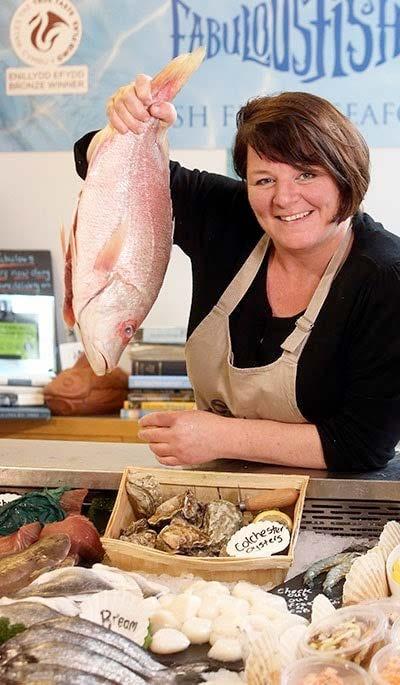

Wales & West u tilities has launched its award winning apprenticeship programme to recruit into engineering-based roles across Wales and the south west of e ngland.
The company, which operates and maintains the gas network across the area, has launched its recruitment drive during National Apprenticeship Week (10 – 16 February) and is now seeking applications into a range of skilled roles including mechanical engineering, pipelines engineering and electrical and instrumentation. All roles will support Wales & West Utilities multi-million-pound investment work to keep the gas flowing safely and reliably to local homes and businesses, keeping people warm for generations to come.
The 2025 intake will focus on training new apprentices to maintain existing equipment, lay new supply pipes, and maintain the control systems of the network – which play an increasingly important role in enabling the company to transport greener gas.
Apprentices will be based across the company’s operating area, from Wrexham to Redruth, and will go through the three/four-year programme to develop the skills

needed to keep the network operating safely, now and into the future.
National Apprenticeship Week celebrates the positive impact apprenticeships have on individuals and businesses, as well as recognising the skills and talent apprentices can bring to the workplace.
Wales & West Utilities has run its CIPD award-winning apprenticeship programme since it started operations
in 2005. During this time it has recruited nearly 200 apprentices from across Wales and the south west of England, with permanent employment with the company post-programme available for those who complete the programme.
Bethan Jones, Head of People & Engagement at Wales & West Utilities, said:
“We’re delighted to launch this
year’s programme during National Apprenticeship Week and urge anyone interested in pursuing the opportunity to earn whilst they learn, to apply.
“Our apprenticeship programme has grown significantly over the years and we’re proud that the majority of these individuals are still working with us, some at management or senior roles within the business.
“Recruiting the next generation of gas engineers is essential so we can meet the challenges of the future, and all apprentices will play their part in working to maintain the network, so that we continue to provide the safe and reliable the energy needed to heat homes, power businesses and keep the lights on.”
For more information, and how to apply, please visit https://www. wwutilities.co.uk/about-us/careers/ apprenticeships/. The closing date for applications is 3 March 2025.
Wales & West Utilities, the gas emergency and pipeline service, brings energy to 7.5m people across the south west of England and Wales. If you smell gas, or suspect the presence of carbon monoxide, call us on 0800 111 999 straight away, and our engineers will be there to help any time of day or night.


Work-based learning providers, apprentices and employers will join forces to celebrate Apprenticeship Week Wales 2025 with an Apprenticeships Fair at the Senedd in Cardiff on Wednesday (February 12).
The National Training Federation for Wales (NTFW) and CollegesWales (ColegauCymru) are jointly organising the event in the Senedd’s Neuadd to take apprenticeships to the heart of Welsh Government.
Hosted by the Cross Party Group on Apprenticeships, co-chaired by Luke Fletcher MS and Joyce Watson MS, the event is being held from 10am to 3pm and provides Members of the Senedd with an opportunity to meet training providers, employers and apprentices from across Wales.
Following cuts by the Welsh Government to the apprenticeship budget last year, the NTFW and ColegauCymru will highlight the vital need for continued investment in apprenticeships as a pathway to economic growth and community resilience.
Exhibition stands will showcase the diverse range of apprenticeship opportunities available in Wales, offer hands-on skills experience and interactive displays showcasing innovation.
Welsh Government Minister for Culture, Skills and Social Partnership, Jack Sargeant, MS, a former apprentice himself, will address the event at 12 noon.
The Welsh Government has described apprenticeships as the “gold standard” of work-based learning and a cornerstone of its skills strategy, providing individuals with the chance to earn and learn whilst equipping them with the knowledge and skills essential for success in the workplace.
Lisa Mytton, the NTFW’s strategic director, said: “The Senedd event is a fantastic opportunity to promote the value of apprenticeships to all Members of the Senedd and other visitors.
“More than ever, it’s imperative that we develop a pipeline of talent, from apprenticeships through to higher education, to deliver the economic

growth that Wales desperately needs.
“In our ever-evolving global economy, the need for a skilled and adaptable workforce is paramount. Apprenticeships play a crucial role in bridging the skills gap, providing hands-on experience and fostering innovation.
“It continues to be a hugely challenging time for our resilient workbased learning providers, following apprenticeship budget cuts, but we remain committed to delivering for Wales by working closely with the Welsh Government and Medr to meet their current and future priorities.”
1 in 8 (13%) young people don’t know their pension basics finds the Money and Pensions Service (MaPS), as they couldn’t answer any question correctly in a four-part true or false pension quiz.
It was rare that young people could demonstrate basic pension knowledge, as only 1 in 10 (10%) answered all four correctly.
These figures contrast the knowledge that young people think they have, with half (50%) of young people said they understood the basics of pensions ‘very’ or ‘fairly’ well.
This research finds a big gap between what young people think they know and what they do really know.
MaPS is sharing this news in line with Apprenticeship Week Wales, which runs from 10 – 16 February.
Within this, MaPS is encouraging young apprentices to start their careers on the right financial footing by visiting the free and impartial MoneyHelper service to help them learn about pensions and
other key financial decisions, alongside employment skills.
Holly McKenzie is a 20-year-old apprentice working as an Investment Product Analyst at finance company, Schroders. She admits that although she has studied pensions as part of her work and training, she doesn’t feel entirely confident around them.
She says, “I think it would be beneficial to understand the true impact of our pension pots and how these change as we get older. I believe that everyone in the workforce, particularly those from younger generations should be educated about pensions and their benefits.”
“I feel fortunate to be contributing to my pension at just 20 years old, and I encourage all young apprentices and trainees to think about making contributions to their pensions.”
Zoya Alam is a 23-year-old fourth-year apprentice working for global law firm, Squire Patton Boggs. She says:“Before starting my apprenticeship, pensions weren’t on my radar, but now I see just
how crucial it is to start saving early. Starting a pension as an apprentice is a great opportunity to build good financial habits from the outset.
“Many young people may feel that pensions are something to worry about later, but even small contributions now can lead to significant rewards in the future.”
As well as learning about the basics of pensions, MaPS also wants to encourage young people to pay into their pension early, if they can.
Lee Phillips, Wales Manager at the Money and Pensions Service says:
“Apprenticeship Week Wales is the perfect time to remind young people entering apprenticeships to consider their pension. For many, this could be the first time they are earning a wage, and they might not have had the opportunity to contribute to a pension before.
“Learning about pensions at a young age is something that will benefit you throughout your whole life and give you great financial foundations.
“We encourage young people starting out as apprentices to visit MoneyHelper which provides free and impartial money and pensions guidance. Contributing even a small amount to your pension now, can make a big difference to your future.”
If apprentices are over the age of 22 and earn above £10,000 annually, they will be auto-enrolled into a workplace pension. If young people don’t meet this threshold however, they can still choose to opt into the scheme.
Apprenticeships provide essential lifelong skills for your career, and understanding how pensions work—such as the benefits of employer contributions, tax relief, and how your money grows— can significantly benefit you throughout your life, paying off in the long-term. This knowledge is crucial for young people, as without it, you can’t make informed financial decisions that will impact your future.
Use MoneyHelper’s Pensions Calculator to really understand what your pension means for your future.

The chartered Trading Standards Institute (cTSI) is celebrating National Apprenticeship Week by promoting Trading Standards as a ‘career for all’. cTSI is working alongside the chartered Institute of environmental Health and the Institute of licensing to encourage employers to explore the benefits of apprenticeships.
CTSI has marked the annual celebration run by the Department for Education to highlight the variety and inclusivity of the Trading Standards profession, which comprises a diverse workforce each united by a dedication to serving and protecting their communities.
Trading standards offers a hugely varied and rewarding career open to people from all walks of life and apprenticeships have increasingly provided a great way to enter the profession and ultimately progress to more senior positions.
Apprenticeships play a vital part in reinforcing existing Trading Standards teams, as well as helping to bring in new talent to often stretched workforces. CTSI has supported the development of apprenticeships, through trusted providers, that provide opportunities for people either at the beginning of their career journey or perhaps looking to change career direction to learn and earn at the same time.
From an employer perspective, apprenticeships offer a cost-effective solution with incentives such as the apprenticeship levy and can help determine the strengths and weaknesses of a future practitioner.
John Herriman, Chief Executive at CTSI, said: “It is wonderful to be able to celebrate and showcase the benefits of a Trading Standards apprenticeship during National Apprenticeship Week

for 2025. Our careers are varied and exciting, whether you are starting out into the world of employment or wanting to change and find a more satisfying career.
“At CTSI, we are passionate about supporting the next generation of Trading Standards professionals and encouraging people into the profession. Apprenticeships are vital to this and will help secure the longevity and future of this amazing, diverse and varied profession. With something for everyone, it really is a career for all.
“The cost-effectiveness of apprenticeships brings a multitude of benefits to the apprentice, employer and the communities which are served. In our Manifesto, we recognised and called for investment
into the pipeline of Trading Standards professionals, and those are still calls we are making today.”
Ian Simpson, Specialist Trainer for the Regulatory Compliance Officer course at Babington and a previous chair of the CTSI Board, said: “There are skills shortages across all Regulatory Services in Local Government including Trading Standards, Environmental Health, and Housing and Licensing Services. Councils across England are using this level 4 apprenticeship to help address the crisis they all face. In just 15 months apprentices get to learn and apply their regulatory craft whilst being paid. They get to feel increasingly valued, and their employers gain that much needed capability to get the job done. And all
the course fees are paid for by their employer’s apprenticeship levy –what’s not to like!”
Harvey Watson, Learning & Development Director, CSA said: “Apprenticeships are an incredible way to combine earning while learning through a structured learning programme. CSA’s Level 4 and Level 6 apprenticeships are a great way to get hands on experience while working with expert dedicated coaches in your chosen field. With that comes the opportunity to learn from peers, mentors and open doors for your career progression by creating a wealth of brilliant contacts including industry specialists.”
Sophie Leney, Head of Trading Standards, Norfolk County Council said: “In Norfolk we have embraced the new Level 6 Trading Standards Practitioner apprenticeship as it is a great platform to enable us to develop our Trading Standards Officers (TSOs) of the future. In the early 2000s, we were struggling to recruit qualified TSOs so made the decision to fill our vacant posts with apprentices. We work closely with our training provider who give us excellent training and mentor support for our two cohorts of apprentices. This is supplemented with inhouse coaching, shadowing and support so that our apprentices benefit from the wealth of knowledge and experience of our qualified officers. In return, our apprentices are working hard on their studies and on building their competencies and, where competent to do so, on delivering our service. They have brought in an amazing enthusiasm for Trading Standards and this has rubbed off on all of us, reminding us of why we joined the service and recognising the public service we provide.”

THeN and now... The minister responsible for apprenticeship policy in Wales returned this week to the college where he himself studied as an apprentice to celebrate Apprenticeship Week and extol the benefits of this route into employment.
Having left school at 17, the Skills Minister, Jack Sargeant, studied at Deeside College (now Coleg Cambria) and later Wrexham University. Throughout this time he was earning whilst learning at an industrial placement.
Apprenticeship Week Wales kicks off today [Monday 10th] and celebrates the value apprenticeships bring to learners, employers and the wider Welsh economy.
Addressing students, exapprentices and industry representatives at the college, he said:
“My apprenticeship helped me gain qualifications while also developing skills on the shop floor that have stayed with me throughout my career. The same problem-solving and decision-making skills I learnt as an apprentice are now helping me shape the policies that will support the next generation of apprentices across Wales.
“In north-east Wales, where I grew up, advanced manufacturing is a major employer, and I know how apprenticeships provide a route into high-quality jobs. Companies like Airbus set the gold standard for apprenticeships, and their success is a model for others. While large employers play a crucial role, apprenticeships are just as important for SMEs, helping them develop the talent they need to grow.
“We are proud of our record on delivering our flagship apprenticeships programme in Wales. Apprenticeships are an investment in the future and there are so many exciting opportunities, such as in

Wales’ green economy or our thriving creative sector, for example. The £144 million allotted in our draft budget will ensure businesses of all sizes can take on apprentices, providing opportunities for thousands to gain skills and progress in their careers.”
Latest data (April 2024) shows the Welsh Government has supported nearly 56,000 new apprenticeship starts so far during this Senedd term. Annual funding has increased from £128m (in 2020) to almost £144m this year, despite European funding coming to an end in 2023-24.
Apprenticeships available cover
everything from construction to energy, financial and professional services, to tourism and the life sciences. Welsh Government is continuing to promote and prioritise investment in those sectors that will support economic growth and community cohesion. This includes those in higher level, more technical sectors, supporting STEM apprenticeships and net-zero preparedness, and increasing the numbers of degree apprenticeships.
Nick Tyson, Vice Principal at Coleg Cambria’s Institute for Technology, fondly remembers the Minister’s time with the college during his
“Jack as a young engineer was extremely focused. His practical skills were excellent. He consistently performed with both his knowledge and his academic skills to distinction level, so much so he went on to go on to do a HNC qualification with us and eventually do a degree. He is a fantastic ambassador for engineering. He continued:
“We’re really lucky in Wales that the minister has been through that route, because he can inspire others, and he can continue to promote worldclass apprenticeships here in Wales.”


Council is proud to celebrate National Apprenticeship Week 2025, running from 10 to 16 February.
This week highlights the importance of apprenticeships in boosting local economies, supporting businesses, and helping individuals develop skills for the evolving workplace. Apprenticeships provide a unique pathway to employment, offering hands-on experience, nationally recognised qualifications, and the opportunity to gain valuable knowledge within a particular area whilst earning a wage.
Amy Seale is currently
undertaking a Business Support Apprenticeship, working within the Place, Infrastructure, and Economic Development team. Speaking about her work, Amy said:
“My job involves providing administrative and communication support by liaising with employers, marketing, and preparation of events. My favourite aspect is the opportunity to deepen my understanding of business support, with each day offering valuable professional and personal growth.”
Learn more about Amy’s experience here.
The career success of the
Council’s IT team is another example that highlights the transformative impact of apprenticeships. Many IT professionals started as apprentices and have progressed to leadership and management roles. Some have also pursued Degree Apprenticeships, further developing their skills while continuing to support the Council’s IT services.
Through these success stories, the Council aims to showcase the incredible opportunities apprenticeships offer and inspire more individuals to consider them as a route to a fulfilling career in public service.
Cabinet Member for Organisation and Workforce, Cllr Philip Hughes said:
“Apprenticeships are a key component to the development of our skilled workforce, and it’s truly inspiring to witness how these individuals have progressed from apprentices to senior leaders within the Council. Their success stories highlight the power of hands-on learning and the wealth of opportunities that exist right here in our county.”
Visit the Council’s website to learn more about the Council’s apprenticeships schemes - Amdani!

AS ON e of the u K’s largest apprenticeship providers, BAE Systems has tested the latest attitudes towards career paths among young people to coincide with National Apprenticeship Week (10-16 f ebruary).
The findings are part of a newly launched Apprenticeship Barometer, which surveyed 2,000 young people (16-24 year olds) across the country to identify views on education, training and pathways to career success.
The survey revealed a growing interest in apprenticeships, with more than 70% of respondents willing to relocate to a different part of the UK to seize an apprenticeship opportunity and 6 in 10 preferring it as an alternative to university.
The findings highlight a significant shift toward flexibility and apprenticeships being increasingly recognised as a pathway to secure and rewarding careers, with respondents citing job security (28%), high starting salaries (28%) and hands-on training (23%) as the most appealing features.
An overwhelming 86% of respondents agreed that apprenticeships enhance social mobility, offering significant potential to support disadvantaged groups and provide alternatives to traditional higher education routes.
Despite their appeal, responses suggest barriers such as limited opportunities (35%) and lack of information (32%) continue to hinder access to apprenticeships, highlighting the need for greater awareness and more accessible pathways.
Nearly half (44%) of the young people surveyed said they felt uninformed about apprenticeship

opportunities in their field of interest and almost 9 in 10 (89%) believed employers should expand apprenticeship programmes alongside graduate schemes to meet rising demand.
Industries linked to careers in science, technology engineering and mathematics (STEM) led the way in apprenticeship preferences, with 1 in 4 (26%) of the young people surveyed expressing interest. They also ranked in the top three careers that respondents associated with the greatest job security.
More than half (54%) of respondents identified earning while learning as the main reason for choosing an apprenticeship over university, while 36% cited avoiding student debt as a key motivator,
reflecting a perceived growing financial awareness.
Richard Hamer, HR Director of Education and Skills at BAE Systems, said:
“The Apprenticeship Barometer gives a real insight into the aspirations and values of the next generation of the UK workforce. It’s clear there’s a huge appetite for high quality vocational training that provides a clear career pathway, whilst offering financial security.
“I’d encourage anyone interested in apprenticeships to have a look at the thousands of highly valuable opportunities available across the country.”
BAE Systems is recruiting for more than 2,400 new apprentice, undergraduate and graduate roles in 2025, which will result in around 6,500 in training, making up approximately 15% of its UK workforce.
Baroness Jacqui Smith, Minister for Skills, Department for Education, said:
“Apprenticeships are central to this government’s Plan for Change — they break down barriers to opportunity and equip people of all ages and backgrounds with the skills they need to go on to rewarding careers. They also drive growth by giving businesses the workforce they need in key sectors of the economy.
“It’s great to see BAE Systems, one of our Top 100 apprentice employers, backing this mission by recruiting more than 2,400 new apprentices, undergraduates, and graduates in 2025. Their commitment demonstrates the real impact apprenticeships can have—helping young people gain hands-on training, access secure and well-paid careers, and power key industries like STEM.”
The closing date for apprentice applications is 28 February 2025. There are multiple graduate intakes throughout the year, including January, April, July, August and September. Find out more and apply: baesystems.com/earycareers
ONly six properties remain for sale at a popular housing development in cross Hands.
Parc Cerrig – which has easy access to the A48 and M4 – has three and fourbed homes for sale from £284,995 to £344,995. Help-to-Buy Wales is available at Parc Cerrig, meaning customers could buy a home with a minimum deposit of 5%.
The houses have been built by Persimmon Homes, West Wales’ largest developer, which has a five-star ranking from the Home Builders Federation, which means nine-in-ten customers would recommend them to a friend.
Cross Hands is a village close to Carmarthen, while the development is a short walk from a range of amenities, including big brands at the excellent retail park, two supermarkets, a number of independent shops and eateries, schools, a doctor’s surgery, and a cinema. Llanelli and Swansea are 20 and 30 minute drive away, respectively.
Interested buyers are encouraged to act quickly to secure their dream home in this desirable location. With interest expected to be high, potential buyers are advised to act quickly to secure their dream home on this desirable development.
During the housebuilder’s time at Parc Cerrig, Persimmon has overseen

the construction of 198 new homes.
For more information or to arrange a viewing of the final properties, please visit the Persimmon website at persimmonhomes.com or contact our sales team directly on 01269 503893.

Commenting, Persimmon Homes West Wales’ sales director, Sharon Bouhali, said: “With only six homes remaining at Parc Cerrig, we’re excited to offer this final opportunity to own a high-quality home built by a five-star builder at this development, where families will also benefit from the brand-new primary school and a local community centre.
“Located in the beautiful county of Carmarthenshire, Parc Cerrig is conveniently close to Swansea, Llanelli, the M4, and several coastal towns and their wonderful beaches.
“As we approach the end of our time here, we encouraging potential buyers to act swiftly and secure their dream home in this delightful part of the country.”
culTuRAl lANDMARK SecuReS DeSIgN PRIZe
THe IcONIc Dylan Thomas Boathouse in laugharne has been named the winner of this year’s prestigious ‘Win an Architect’ initiative, a competition run by Studio Wignall & Moore.
The initiative seeks to support cultural sites outside London by offering a design concept worth up to £12,000, developed by Wignall & Moore’s awardwinning RIBA Chartered architects.
Perched on a cliff overlooking the Taf estuary, the Boathouse was home to renowned Welsh poet Dylan Thomas during the final four years of his life. It was here that he wrote some of his most significant works, including parts of Under Milk Wood. Now part of CofGâr, Carmarthenshire County Council’s museums and arts service, the Boathouse continues to attract visitors from across the world.
eNHANcINg VISITOR exPeRIeNce
The prize will support plans to improve accessibility and enhance the visitor experience by redesigning the entrance, expanding indoor space, and utilising the old harbour’s potential.
Councillor Hazel Evans, Cabinet
Member for Culture, Sport, and Tourism, welcomed the recognition:
“Winning the ‘Win an Architect’ prize is a fantastic achievement for the Dylan Thomas Boathouse and CofGâr. This support will help us improve the visitor experience while preserving the Boathouse’s unique character.”
The partnership with Wignall & Moore will extend through 2025, focusing on sustainable enhancements that respect the site’s historical importance and ensure its legacy for future generations.
yeARlONg SeRIeS Of eVeNTS
To celebrate the win, a free creative writing workshop led by award-winning poet and playwright Menna Elfyn took place on January 25, marking the start of a yearlong programme of events and workshops at the Boathouse.
Visitors are encouraged to share ideas and help shape the future of this literary landmark. Booking for events is available via CofGâr.


OuTPuT INcReASeS fOR THe fIRST TIMe SINce AuguST 2024
BuSINSeSS activity in Wales experienced renewed growth at the start of 2025, according to the latest cymru growth Tracker data from NatWest. The findings indicate a fresh rise in output, with business confidence remaining positive as companies entered the new trading year.
The Wales Business Activity Index—a seasonally adjusted measure of month-on-month changes in output across the manufacturing and service sectors—rose to 50.7 in January. This marked a third consecutive monthly increase and the first expansion in activity since August 2024. The figure was up from 48.9 in December, signalling a marginal improvement in business performance.
Business confidence remained strong, while the decline in employment and backlog levels eased. However, inflationary pressures intensified, with costs and charges rising at historically high rates. Firms sought to pass these costs on to customers, resulting in the sharpest increase in selling prices in ten months.
Jessica Shipman, Chair of the NatWest Cymru Regional Board, commented: “January data saw a return to output growth at Welsh businesses, with improvements in the
sales environment in specific sectors driving expansion. Firms remained cautious about employment but were confident that demand conditions would improve as the year progressed.
“Although cost burdens remained elevated compared to historical trends, Wales recorded the slowest rise in input prices of the 12 monitored UK regions. However, output charges continued to increase, approaching the UK average, as businesses sought to protect their profit margins.
“The Bank of England’s recent interest rate cut has made monetary policy less restrictive, with further easing expected later in the year.”
Welsh business activity mirrored UK-wide trends, which saw overall expansion in January. However, only four of the 12 monitored UK regions— London, the North East, the South West, and Wales—registered an upturn in activity. Some firms noted increased demand in specific sectors, though the broader sales environment remained subdued.
While new orders in Wales continued to contract, the rate of decline was weaker than the UK average. Of the ten UK regions reporting lower sales, Wales recorded the slowest decline.
Despite these challenges, business sentiment remained positive, with
AfTeR last week’s rugby in Rome, my darlingest one decided to cheer me up.
Off we went to visit one of my beloved’s relatives in Ceredigion.
Unlike most of the wife’s extended (and protracted) family, Cousin Gavin has done remarkably well for himself.
Despite being called Gavin.
In a county like Ceredigion, the name ‘Gavin’ is a punch magnet, especially in the outback from which the wife’s family hail. In the dark interior, in which ‘Rhydian’ is looked upon as a suspiciously modern name, ‘Gavin’ is the equivalent of finding Japanese knotweed in a bed full of runner beans.
Perhaps it is the trial of being called Gavin which forced the wife’s cousin to thrive in his particular field: it’s scarcely any wonder that, having started out shearing sheep on his father’s farm (good old Idris), Gavin progressed to become a top hairdresser.
Having made a mint shearing the lady’s in London, he retired early with his money and a small Peke called Mr Wiggles to reside in Gwbert by the Sea, where he could indulge his keen interest in the pursuit of other men’s wives.
I do not know if you are familiar Gwbert. It must have been a pleasant village once, its shores lapped by the tides of the Teifi estuary.
You can sit and watch the waves roll in and out in peace and quiet.
Like so many small villages in Ceredigion, however, it has had its heart hollowed out. There are no shops, no pub, no village post office.
firms anticipating stronger economic conditions and planned capacity expansions. Of the 12 monitored regions, only the North East, Scotland, and Northern Ireland reported weaker optimism.
Welsh private sector firms reported a fifth consecutive monthly decline in workforce numbers in January.
While job losses eased, Wales still experienced one of the sharpest reductions in employment among UK regions, with only the East of England and the West Midlands seeing steeper cuts.
Backlogs of work continued to decline, though at a slower pace than previous months. Firms attributed this to lower new orders, allowing them to process outstanding business more efficiently. The rate of backlog reduction remained quicker than both the UK and long-term series averages.
Meanwhile, input prices surged at the fastest rate since April 2024 due to unfavourable exchange rate movements, rising labour costs, and increased supplier prices. However, Wales recorded the slowest rate of cost inflation among the 12 UK regions.
Output prices followed a different trend, with Welsh firms passing higher costs on to customers at a faster rate.
Scotland and Northern Ireland were the only UK regions to report a slower rise in selling prices.
There is the very splendid Cliff Hotel that squats hideously over the headland and a very nice bistro nearby.
However, the rest of the village is a riot of hideously inappropriate and just plain hideous infill development.
It’s scarcely any wonder that Ceredigion’s Planning Committee is rumoured to contain more cowboys than the whole of Dodge City in the Wild West.
Mismatched buildings are rammed into every available space, ranging from vile modern boxes that are on the market for north of £350 grand to the sort of modernist fantasy homes that were probably the result of a hard few hours at the craft beer before pen hit paper. You can just see that chap from Grand Designs taking one look at them and even him being reduced to a ‘now that’s just silly’.
I wish my abilities as a writer were enough to convey to you how awful it all is.
Now, you’d have thought that Gavin would not only approve of such architectural excrescences but to live in one.
But no.
A little way out of Gwbert, Gavin’s is one of the few dwellings within a mile not to have succumbed either to brutal modernism or rural whimsy. It’s an old farmhouse that still looks like an old farmhouse. True, it’s been double-glazed, and there’s a nicely tarmacked yard with a garage/workshop where once a barn might have stood. But that’s it – apart from the satellite dish.

No faux ramparts, no higgledy-piggledy layout, no ‘look at me’ interestinglyshaped roof. It’s a nice old house. And it made me wonder even more strongly: why would you go somewhere, fall in love with it, and then come to the conclusion ‘what this place needs is a hideous wood and glass-clad box to make




ITAly capitalised on Welsh ill-discipline to claim back-toback victories over the men in red for the first time, extending Warren gatland’s team’s losing streak to 14 matches.
Wales started brightly, as they had in Paris. Deep in Italian territory, scrum-half Tomos Williams kicked across for Josh Adams near the corner post, but the slippery ball evaded the winger’s grasp. From the resulting scrum, Italy won a penalty, snuffing out the visitors’ early threat inside the 22.
Fullback Tommaso Allan opened the scoring after six minutes, slotting a penalty following a Welsh offside at a ruck. With the rain falling, a tactical kicking game seemed the likely approach.
Fly-half Ben Thomas responded with a penalty for Wales, levelling the score at 3-3 early in the second quarter. But with the clock approaching 20 minutes, Italy made their move. Playing with an advantage from
a scrum, Paolo Garbisi executed a delightful show-and-go before nudging a grubber kick through, which the rapid Ange Capuozzo reached first to score.
Allan converted the try, putting Italy 10-3 ahead. Moments later, Garbisi attempted an ambitious drop goal from Wales’ 10-metre line, which narrowly dipped under the crossbar—an early sign that Italy were willing to strike from almost anywhere on a wet afternoon.
Azzurri head coach Gonzalo Quesada wouldn’t regret that miss for long. Allan extended Italy’s lead with two quickfire penalties, making it 16-3 as halftime loomed. Warren Gatland’s side needed a swift response to prevent Allan’s boot from slowly dismantling their hopes.
Wales nearly found one. Williams again kicked through for Adams, who came agonisingly close to grounding the ball, only for the wet conditions to betray him. Another promising attack was then halted when Adams’



pass to captain Jac Morgan was ruled forward.
Ten minutes into the second half, Gatland introduced Ospreys fly-half Dan Edwards in an attempt to turn the tide.
Italy, however, remained undeterred. Scrum-half Martin Page-Relo attempted an audacious penalty from deep inside his own half, striking the upright. The hosts, comfortably ahead by 13 points, were playing with confidence.
Wales’ frustrations deepened when Adams was shown a yellow card for a head-on-head tackle on Garbisi. Allan duly added another penalty to keep Italy firmly in control at 19-3.
Replacement back-rower Aaron Wainwright, one of Wales’ most experienced players, injected some life into his team, muscling over for a try. Edwards’ conversion attempt struck the post, leaving the score at 19-8 with ten minutes to play.
But Wales continued to
concede penalties, and Allan continued to punish them, landing his sixth successful kick from eight attempts to stretch Italy’s lead to 22-8.
With the game entering its final moments, the hosts suffered a late scare. Replacement prop Marco Riccioni was shown a yellow card as Italy repeatedly infringed with Wales pressing in their 22. A minute later, Dino Lamb followed him to the sin bin, leaving the Azzurri down to 13 men and conceding a penalty try in the process. At 22-15, the faintest glimmer of hope appeared for Wales.
It proved too little, too late. Italy won a final penalty, and Garbisi booted the ball into touch, ending Welsh resistance and sparking celebrations in the Eternal City.





WAleS’ interim head coach, Matt Sherratt, has vowed to instil a new mindset in the squad for the remainder of the Six Nations, granting his players the freedom to be bold as they face Ireland, Scotland, and England.
Sherratt, who is also Cardiff’s head coach, steps in following Warren Gatland’s abrupt departure after a run of 14 consecutive Test defeats, which saw Wales slip to 12th in the world rankings. Even the most optimistic Welsh supporters would admit that expectations of victory remain low. However, Sherratt believes shifting the team’s mentality will be key to any potential success.
A New Mindset for WalesSpeaking at a hastily arranged press conference on Tuesday, Sherratt reflected on his initial challenges at Cardiff, drawing parallels with his new role.
“I’ll be honest, it feels like when I started at Cardiff,” he admitted. “Cardiff were on a bit of a low when I came in, and I said to Abi (Tierney, WRU CEO) that I think the first thing to start with is mindset.
“It’s going to be very difficult—I’ve coached international rugby before— and it’s going to be very difficult to change a huge amount technically and tactically in what will probably be three or four sessions before we play Ireland.
“But if we can achieve a mindset shift and create real excitement around playing international rugby for Wales, that’s what truly matters. If the players take the field motivated and full of belief, then technical and tactical elements become secondary.
“So, for me, mindset comes first, ensuring the players are genuinely excited to take the field in 12 days’ time.”
Targeting Wins Despite the OddsWhile Sherratt acknowledges the difficulty of securing victories, he insists that his squad must maintain a winning mentality, even if Wales are currently priced at 200/1 to claim the Triple Crown in their remaining matches.
“It’s my first year as head coach, but I’ve been in the game for 20 years,” he said. “When you think of the players
in the dressing room—Toby Faletau, Tomos Williams, Jac Morgan—guys I’ve worked with, they want to win.
“If I go in there talking about trying our best and playing some nice rugby, I’ll lose the room immediately. They’re British and Irish Lions for a reason— they want to win. We go out there to win every game, just as we do at Cardiff, whether we’re playing Leinster or Zebre, who are bottom of the league.
“If you stand there and talk only about performance, the players switch off quickly. It’s about changing mindset and being positive. I’ve learned in this job that you have to be yourself. Coming in, I have to play the game the way I want it to be played. I want players to be brave.
“If there are 50/50s, I want them to take the positive option. Sometimes, that leads to a win. But I don’t think performance and winning are separate things. We need to get the mindset right, implement structures that everyone buys into, and have a really positive attitude.
“Sometimes, the opposition are further along in their development, and I can’t control the result. But when I meet the squad on Monday morning, they’ll want to beat Ireland.”
Squad Selections and Future PlansSherratt, who has been highly regarded by players according to WRU CEO Abi Tierney, will consult with the rest of his coaching team before making any squad call-ups. Having only been informed of his new role on Monday night, he continued leading Cardiff’s training on Tuesday ahead of their clash with Connacht at the weekend.
While names such as Gareth Anscombe and Max Llewellyn could be considered, given his familiarity with them at Cardiff, Sherratt remains focused on delivering performances that fans can enjoy.
“I’m not coming in to overthink it or to change things just because it’s international rugby,” he explained. “I’m pretty set on how I want to play, and it’s not going to be different from what we do at Cardiff.
“That’s what I genuinely believe in—

it’s what I’m passionate about. I believe we have a duty to ensure people enjoy watching rugby, not just international rugby.
“I took my boy to three sporting events last year. I took him to a Liverpool game, and he loved it. I took him to a Hundred cricket match at Glamorgan, and he loved it. I took him to a rugby game, and after 55 minutes, he asked if we could leave. It was a kick-fest.
“I thought, ‘How sad is it that a 12-year-old who loves sport wants to leave a rugby match early?’ At this
stage of my career, it’s important to me that people enjoy watching a team play—not at the expense of losing, of course, that’s really important—but I want players to be brave.
“If there’s a 50-50 situation, I want them to take the brave option.”
With three difficult matches ahead, Sherratt faces a challenging task. But if he succeeds in instilling a new sense of belief and positivity in the Welsh squad, his short tenure could leave a lasting impact on Welsh rugby.



A TeAM of Pembrokeshire rowers has finally embarked on their gruelling 3,200-mile journey across the Atlantic after being held back by rough weather for over a week.
Team Cruising Free—comprising Sophie Pierce from Johnston, Miyah Periam from Milford Haven, Polly Zipperlen from Llangwm, and Janine Williams from Neyland—departed from Lanzarote on Saturday, February 1, as part of the 2025 Atlantic Dash.
The first few hours at sea proved punishing, with towering waves and relentless seasickness making the transition to life on the water anything but smooth. However, in a message to supporters, the rowers reassured everyone that they were adjusting and settling into a rhythm.
MAKINg HISTORy ON THe WAVeS
The four-woman crew is one of only four teams competing in this year’s Atlantic Dash and is rowing in aid of three charities: Paul Sartori Hospice at Home, the Cystic Fibrosis Trust, and Emily’s Entourage—a charity supporting research into cystic fibrosis.
For team member Sophie, the challenge is particularly personal. As

Tom Sinclair editor@herald.email
someone living with cystic fibrosis, she hopes to become the first person with the condition to row the Atlantic. Meanwhile, 70-year-old Janine is aiming to set her own record as the oldest woman to complete the crossing.
Speaking before their departure, Sophie shared the team’s mix of excitement and nerves. “There’s a lot of uncertainty, so we’re focusing
on taking it step by step rather than thinking about the entire journey to Antigua in one go.”
Once underway, the rowers quickly felt the brutal reality of their mission. Sophie described the opening stretch as exhausting, with the team rowing in two-hour shifts.
Despite the challenges, the team remains positive, helped by favourable wind and swell conditions that are carrying them in the right direction.
The rowers have expressed immense gratitude for the backing they’ve received, particularly from their lead sponsor, Bluestone, as well as Dale Sailing, which supplied new solar panels to ensure their boat was fully prepared for the crossing.
Sophie also highlighted the camaraderie among the Atlantic Dash teams, describing the past month as a time of mutual support and encouragement.
“The waves are huge, and we’re all shattered,” she said in a voice note home. “We’re covered in bruises, and I managed to smack my rib with an oar in the swell, so that’s sore. Miyah has been really seasick, but she’s finally managed to eat, which is a good sign. Polly’s also struggling with seasickness, but we’re pushing through.”
Team Cruising Free is documenting their journey via Facebook, where supporters can follow their progress across the Atlantic.
THe RuDDeR’S BOATyARD pontoon in Milford haven is the site for a native oyster hotel – which aims to reverse the decline in native oyster population
Native British oyster populations have declined dramatically over the decades, as a result of habitat loss, pollution, over-harvesting and disease.
During a recent visit to Pembrokeshire, the Deputy First Minister with responsibility for Climate Change and Rural Affairs, Huw Irranca-Davies, saw the oyster hotel, which is part of a project to help restore their population and strengthen the marine ecosystem in Pembrokeshire.
Underneath the pontoon at Rudders Boatyard the Deputy First Minister saw the oyster cages – where oysters are kept as broodstock to release larvae into the Haven to boost the existing population.
The work is part of the ambitious 4-year Natur am Byth nature recovery partnership co-ordinated by Natural Resource Wales (NRW), to save Wales’ most threatened species. The native oyster restoration project is led by the Marine Conservation Society within the partnership. The project aims to restore native oyster broodstock and, eventually, oyster beds within Milford Haven waterway. It includes an oyster citizen science programme and promotion of
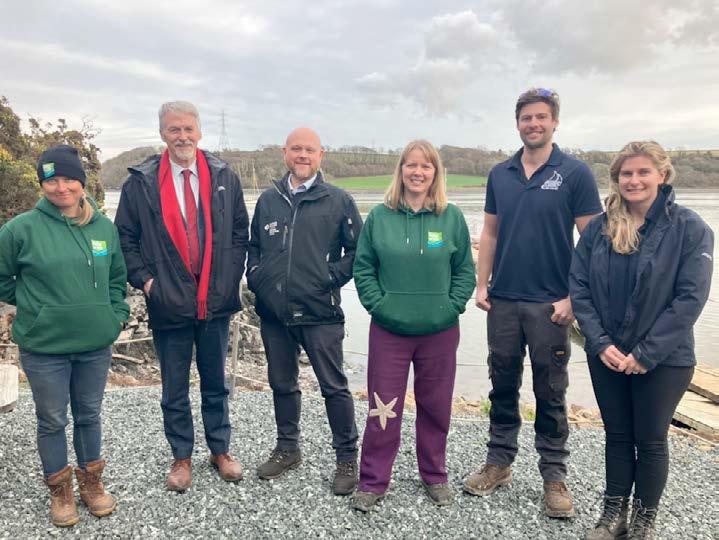
sustainable management.
The project works in close collaboration with Bangor University, who’s native oyster rearing research will see 200,000 baby oysters deployed to boost the restoration activities in February 2025. This work is being carried out in partnership with Bangor University, the Pembrokeshire Marine SAC Officer and Tethys Oysters in Angle Bay, and forms part of the Welsh Government funded Sustainable Landscapes, Sustainable
Places – Blue Carbon Strand of the Pembrokeshire Coast National Park Authority’s Wild Coast Programme.
The Deputy First Minister, said “This is a fantastic example of how environmental organisations, local volunteers and local businesses can help to protect and restore rare species and also connect our communities to nature.
“This project also goes to show how restoring nature provides green jobs, and supports local economies
and sustainable growth in local areas for local people.
“It is inspiring to see the success that the team have achieved at this site and I look forward to hearing more about future developments.”
Sue Burton, Natur am Byth Pembrokeshire Regional Coordinator for the Marine Conservation Society, said “This native oyster work is an important step for the recovery of our marine environment. The Cleddau estuary in Pembrokeshire was once home to a thriving community of native oysters, a species that can build natural reef structures when in high numbers and improve water quality by filtering hundreds of litres of water a day. By bolstering the native oyster population, we hope to kick start the recovery of this natural ecosystem builder”.
John Clark, the Natur am Byth programme manager, said “Our species recovery partnership is driven by collaboration to save animals, plants and fungi on the brink of survival in Wales. The skills from all nine charities and NRW have come together to inspire local action for nature in communities across Wales. This native oyster release is one of our most ambitious projects within the partnership, and wouldn’t have been possible within the support of local businesses and aquaculture based here in Wales.”
PeMBROKeSHIRe & cARMARTHeNSHIRe AIR cADeTS MAKe HISTORy
A HISTORIC first for young aviation enthusiasts in West Wales!
RAf Air cadets from 2420 (Whitland & District) Squadron are celebrating a game-changing moment after securing vital funding from Sport Wales to enhance their training and skills.
Thanks to this boost, the squadron has officially launched its first-ever air rifle range, bringing a brand-new dimension to cadet activities in the region.
HITTINg THe TARgeT
The funding has allowed cadets from Pembrokeshire and Carmarthenshire to access top-tier marksmanship training, with their inaugural air rifle range session taking place in January 2025.
Not only does this initiative provide cadets with essential shooting skills, but it also gives them the chance to compete in the prestigious BSA Silver Trophy postal competition this March. Success in the competition could see them earning the coveted gold shooting badge—an honour not achieved in the area for years!

“A fANTASTIc OPPORTuNITy!”
Squadron Officer Commanding, Flight Sergeant Rick Fisher, hailed the new range as a game-changer for cadet training: “It has been fantastic to see the cadets engage with air rifle shooting. Access to a new range and equipment has given them a unique opportunity to

develop their skills and work towards a significant milestone in the squadron’s history.”
SHOOTINg fOR SucceSS
With the squadron now firing on all cylinders, the future looks bright for these young cadets as they hone their
marksmanship and set their sights on competition victories.
If you’ve ever dreamed of being an Air Cadet, this could be your moment! Cadets can join from age 12 (if in Year 8) up to 17—and with thrilling experiences like flying, adventure training, and now air rifle shooting, there’s never been a better time to get involved.

PlANS to build 76 new homes overlooking Broad Haven have sparked fears that the local sewage system could struggle to cope, with concerns raised about potential pollution in St Brides Bay.
Mill Bay Homes has put forward proposals for a mix of apartments and houses near Marine Parade, with a portion earmarked as affordable housing. However, residents and environmental groups warn that the sewage treatment infrastructure is already under strain, with frequent discharges into local waterways and the sea.
Local swimmers have long complained about sewage discharges affecting water quality in St Brides Bay, with some saying they have been unable to enter the water after heavy rainfall.
One concerned resident, who regularly swims in Broad Haven, told The Herald: “We all understand the need for more homes, but the sewage system can’t handle what we already have. The last thing we need is more pressure on an overstretched network.”
Figures from Welsh Water reveal that the nearby treatment works discharged

Tom Sinclair editor@herald.email
sewage into the environment for over 600 hours last year, with dozens of separate spills recorded.
Local councillor Nick Neumann said
that while he supports more affordable housing, it must not come at the expense of the environment or existing communities.
“Affordable homes for local people are needed, but we must ensure they do not negatively impact the landscape, the community, or our environment,” he said. “I would urge Dŵr Cymru (Welsh Water) to really double down on this and invest more.”
Mill Bay Homes has said that measures will be put in place to mitigate additional pressure on the sewage system and that they will fully fund necessary improvements.
A formal planning application is expected to be submitted to Pembrokeshire Coast National Park Authority, which has stated that around 34% of the new homes should be designated as affordable housing.

WelSH-lANguAge television has played a more important part than commercial record labels in the development of Welsh music videos over the past 50 years, say researchers.
As the 24-hour MTV channel made its entrance on to the global stage in the early 1980s, it was the arrival of S4C which helped shape music video making in Wales at the time.
The finding is included in a new website documenting the development of Welsh music videos over a period of more than fifty years, which launches on Welsh Language Music Day (Friday 7 February).
The fideos.cymru website stems from a unique research project led by two lecturers at Aberystwyth University’s Department of Theatre, Film and Television Studies, Dr Greg Bevan and Dr Kate Woodward.
They say the project has highlighted significant differences between the dynamics driving the production of Welsh-language and Anglo-American music videos.
Dr Greg Bevan said: “There is no doubt that the music video has had a fascinating history since the format really took off in the late 1970s and early 1980s. The political, industrial and social landscape of Wales was very different at that time and these contexts are reflected in the videos that were being created.
“One of the main differences that has emerged as part of our research is that Anglo-American videos are produced with the primary aim of selling and promoting mainstream songs as part of a wider marketing drive by the big record companies. That commercial imperative has been less evident in Wales. Here, the need to promote cultural arts in a minority language has been a crucial factor, alongside other anti-establishment, subcultural influences.”
As part of the project, the researchers interviewed some of Wales’s leading

Tom Sinclair editor@herald.email
artists and producers about their experience of making music videos, including Dafydd Iwan, Cerys Hafana, Geraint Jarman, Eddie Ladd, Rhys Mwyn, and Dafydd Rhys.
Dr Kate Woodward told The Pembrokeshire Herald: “We wanted to speak directly to the people who have been involved in making Welsh music videos over the years and share their insights with a wider audience through the website. What we found was that the television industry in Wales – and S4C in particular – was mainly responsible for driving music video production
by providing not only a platform for broadcasting content but also the necessary funding, in contrast to the Anglo-American trend where record labels were the main drivers.
“The iconic series Fideo 9 on S4C played a key role in the development of the Welsh music video, producing around four new videos every week when they were on air between 1988 and 1991. Bandit was on air between 2004 and 2011, and Lŵp has been offering a cross-platform stage for Welsh music since 2019. We are also now in a new era where artists are increasingly likely to create their own videos independently and promote them on various social media streams.”
In addition to launching the website, it was also announced today that a small fund is available for applications to support the production of two new Welsh music videos.
As Dr Woodward explained: “We are keen for our research project to contribute to the ongoing development of the Welsh music video by supporting current content creation as well as examining and analysing the scene’s historical development.”
The closing date for applications to the music video fund is 16:00 on Friday 28 February 2025 and further details are available online: https://fideos.cymru.
A NeW charity aimed at supporting young people in Pembrokeshire has been established and is now accepting applications for its first round of grants.
The Tenby & County Trust (TACT) was created using funds from the sale of the former Tenby & County Club on The Croft, with the aim of helping young people aged between five and 18 pursue their aspirations.
Trustee David Blackmore explained: “The purpose of TACT is to provide grants that enable young people in Pembrokeshire to follow their ambitions, whether in the creative arts, culture, sports, adventure, science, or languages.”
Following the sale of the County Club for redevelopment, club members—who were entitled to a share of the proceeds—voted to establish a charity to benefit local youth.
“The money has been invested, and while we are not disclosing the exact amount, it is a considerable six-figure sum,” said Mr Blackmore.
The trust is managed by local trustees, all of whom have either been involved with the former County Club or played significant roles in education within Pembrokeshire.
Young people interested in applying for a grant must submit an application via email. This should include the names and email addresses of two supporting sponsors and a statement of no more than 500 words outlining how they would use the funds, including a breakdown of costs.
Grants will be issued quarterly, with the next application deadline set for March 1, 2025. Grants are only available to individuals.
For more information, email tenbyandcountytrust@gmail.com or visit tenbyandcountytrust.org.





E AST E NDERS , the iconic British soap opera, is set to commemorate its 40th anniversary with a series of special events and episodes that promise to captivate audiences. The celebrations will feature a blend of nostalgia, high-stakes drama, and interactive elements, ensuring a memorable experience for both long-time fans and new viewers.
The anniversary week will kick off with an extended hourlong episode on Wednesday, February 19, followed by a live episode on Thursday, February 20. In a groundbreaking move, EastEnders will introduce an interactive component, allowing viewers to influence the storyline by voting on key plot decisions. One such vote will determine the romantic fate of Denise Fox, portrayed by Diane Parish, choosing between her estranged exhusband Jack Branning (Scott Maslen) and her secret lover Ravi Gulati (Aaron Thiara). Voting will be conducted via
the BBC website, with results revealed during the live episode.
Return of iconic characters
The milestone has prompted the return of several beloved characters. Ross Kemp will reprise his role as Grant Mitchell, bringing his character back to Albert Square for a significant storyline described as “explosive.” Kemp expressed his excitement, stating, “EastEnders has always meant so much to me, so to return as the show is about to celebrate such a special anniversary is an absolute honour.”
The anniversary week is poised to deliver high-stakes drama, including a catastrophic explosion and fire at the iconic Queen Vic pub. Teaser images have shown the aftermath, with the pub engulfed in flames and flowers left outside, hinting at potential character fatalities. Speculation is rife about which beloved residents might meet their end in this tragic event.
Interactive elements and audience engagement
In a first for the series, EastEnders will incorporate interactive elements, allowing viewers to vote on the outcome of certain storylines. This initiative aims to engage the audience more deeply, making them active participants in the unfolding drama. Executive producer Chris Clenshaw emphasized the importance of this milestone, stating that the week will be “full of drama and surprises,” with many nods to the show’s rich history.
Reflecting on four decades of drama
As EastEnders reaches this significant milestone, it continues to be a staple of British television, reflecting societal issues and delivering compelling storytelling. The 40th-anniversary celebrations not only honor the show’s legacy but also set the stage for future storylines, ensuring that EastEnders remains a beloved fixture in the hearts of its viewers.


T HE highly anticipated sequel to the acclaimed ‘28 Days Later’ franchise, titled ‘28 Years Later,’ is set to hit theaters on June 20, 2025.
Directed by Danny Boyle and penned by Alex Garland, the film revisits a world still grappling with the aftermath of the Rage Virus nearly three decades after its initial outbreak.
Plot Overview
The narrative centers on a group of survivors residing on a secluded island, connected to the mainland by a single, heavily fortified causeway. Among them are Jamie (Aaron Taylor-Johnson), his partner Isla (Jodie Comer), and their 12-year-old son, Spike (Alfie Williams). As part of a rite of passage, young Spike embarks on a journey beyond the island’s safety, leading to encounters that unveil the evolved horrors of the mainland.
The film boasts a stellar cast, including Ralph Fiennes as Dr. Kelson, a survivor with a complex past. Notably, Cillian Murphy, who portrayed Jim in the original 2002 film, serves as an executive producer for this installment. While Murphy does not appear onscreen in ‘28 Years Later,’ there is speculation about his involvement in future sequels.
In a groundbreaking move, ‘28 Years Later’ was primarily filmed using adapted iPhone 15 Pro Max devices. This approach harks back to the original film’s pioneering use of digital cameras and showcases the advancements in mobile technology’s role in cinema.
The release of ‘28 Years Later’ marks the beginning of a planned trilogy. The

subsequent installment, titled ‘28 Years Later: The Bone Temple,’ directed by Nia DaCosta, is slated for release on January 16, 2026. This continuation aims to delve deeper into the postapocalyptic world and the evolving challenges faced by its inhabitants.
The film’s trailer has generated significant buzz, particularly for its haunting use of a 1915 recording of Rudyard Kipling’s poem “Boots,” recited by actor Taylor Holmes. This creative choice has been lauded for enhancing the trailer’s eerie atmosphere and setting a distinctive tone for the upcoming release.
As the release date approaches, fans of the franchise eagerly await this next chapter, anticipating a film that honors its predecessors while introducing innovative storytelling and cinematic techniques.




DeePSeeK: THe AI DRAgON IN THe ROOM?
WELL, dear readers, it looks like the tech world has done an involuntary little hop of panic again—like a startled sheep on a frosty morning. The culprit? DeepSeek, a shiny new AI model from China that’s causing more of a stir than free pints on a Six Nations weekend.
Now, if you’ve been following the news, you’ll have heard that DeepSeek didn’t just pop into existence like a fresh bara brith out of the oven. Oh no. There are mutterings about Chinese state involvement, hidden costs, and even whispers of data privacy concerns that’d make even the most hardened Facebook user a bit twitchy.
A Bargain Bin Supercomputer?
DeepSeek is making waves because, apparently, it was built for just a fraction of what the American tech giants spend on their own AI models. If that’s true, then China’s AI engineers must be running the most efficient budget since Nain figured out how to make a full Sunday roast out of a single chicken.
But, as always, there’s more to the story. Some say the price tag is suspiciously low, and there are reports of “alternative funding streams” (which, in tech talk, usually means “someone else’s wallet got involved”). It’s the AI equivalent of a car boot sale deal that’s too good to be true—sure, it looks like a bargain, but you might want to check the engine first.
Who’s Holding the Reins?
The biggest worry for Western techies isn’t just that DeepSeek is clever—it’s that it might be too connected to the Chinese state. Now, I’m no politician (I wouldn’t last five minutes in the Senedd before demanding better broadband for rural Wales), but I do know that in tech, control is everything.
DeepSeek is said to have ties to China’s national AI strategy, military
suppliers, and security agencies. That’s a bit like discovering your new computer has a direct hotline to the government—you wouldn’t stop using it, but you’d certainly think twice before asking it to store your biscuit recipes.
And let’s not forget data privacy. Reports claim DeepSeek collects user data in ways that might make even Google blush, and some security experts are concerned about how much information could end up in the hands of the Chinese government. If true, that’s not just worrying—it’s the digital equivalent of leaving your front door wide open and hoping no one pops in for a cuppa uninvited.
What Does This Mean for Us?
So, what does this all mean for us mere mortals trying to survive the digital age without getting hacked, tracked, or accidentally signing up for dodgy cryptocurrency schemes?
Well, it’s a wake-up call. AI is no longer just a fun little chatbot we use to generate daft poems about rugby—it’s a serious global power game. And like all power games, it’s not just about who has the best tech; it’s about who controls it and how they use it.
For now, DeepSeek is free to use, and people are flocking to it faster than seagulls to a bag of chips. But whether it remains a handy tool or turns into something more concerning is still up in the air. As for me, I’ll be sticking with my trusty, slightly overheating laptop for now—and watching this AI arms race from a safe distance (preferably with a strong cup of tea and a Welsh cake).
Until next time, keep your passwords strong and your firewalls stronger!
Yours digitally, Professor Barry Davis (Geek, proud Welshman, and still wondering why every AI insists on calling me “Barry D.”)


geT ready for a night of neon lights, big dreams, and teenage rebellion as Torch youth Theatre presents Ravers, a brand-new play set to hit the stage from Thursday, March 6, to Saturday, March 8, 2025, at The Torch Theatre.
Tickets are priced at £10.00, with concessions available for £8.00.
A fresh and witty production, Ravers takes audiences into the world of the so-called ‘Neeks’—the nerds and geeks who typically find their excitement in Dungeons and Dragons or robotics club. But tonight, everything changes. Determined to redefine themselves and host the ultimate social event, Ali and their friends decide to throw their very own rave—one with no drugs, no drinking, and nothing more than some innocent hand-holding. But what is a rave without the usual chaos? And will their effort to create a unique space bring them together or make them
stand out even more?
This thought-provoking and heartwarming play explores the nature of friendship, identity, and belonging in today’s world, all through the lens of awkward yet endearing teenage characters. Ravers is part of the National Theatre Connections programme, showcasing the best of young talent in a performance that promises laughter, insight, and plenty of heart.
content Warnings: The play contains depictions of underage drinking, moderate language, themes of anxiety, and references to the loss of a parent. Age Recommendation: 13+
Don’t miss this exciting opportunity to see the next generation of performers bring their energy, creativity, and honesty to the stage. Book your tickets now and witness a night where the ‘Neeks’ take the spotlight.
THe TORcH THeATRe in Milford Haven will soon host a magical performance as the Milford Haven Amateur Operatic Society presents Disney’s Beauty and the Beast – The Broadway Musical.
From Monday, March 17 to Saturday, March 22, 2025, audiences will be transported into a world of enchantment, romance, and adventure, as they experience the beloved “tale as old as time.” The story follows Belle, a young woman living in a quaint provincial town, and the Beast, a cursed prince trapped in an enchanted form. The fate of the
Beast and his household depends on his ability to learn the true meaning of love before it’s too late.
This dazzling amateur production will feature stunning costumes, lively performances, and many of the iconic songs that have made Beauty and the Beast a timeless classic. The musical, which includes songs like “Be Our Guest” and “Something There,” promises to be a captivating night of entertainment for all ages.
Ticket prices are £16.00, offering an affordable night of Broadway-style magic right here in Milford Haven.






AHH, MUSEUMS! Those grand, hallowed halls of history, culture, and people pretending they understand abstract art. But what if you were the puppet master behind it all?
Enter Two Point Museum, the latest delightful descent into organised chaos from the boffins at Two Point Studios, the same minds that brought you Two Point Hospital and Two Point Campus. Dropping into our reality on 4 March 2025, courtesy of Sega, this game lets you take the reins as a museum curator, fusing creativity, shrewd business tactics, and the kind of humour that makes you snort tea out of your nose. Available on PC, PlayStation 5, and Xbox Series X/S, this one’s primed to have you questioning the very fabric of museum management.
In Two Point Museum, you don’t just line up a few dusty old
dinosaur bones and hope for the best. No, mate, you’re off on expeditions, Indiana Jonesstyle, unearthing relics from the depths of time and space— prehistoric bones, deep-sea monstrosities, even spooky, supernatural oddities that might just curse your ticket sales. Once in your clutches, these artefacts demand careful curation. Will you go for the classy, refined approach, or chuck ‘em in willy-nilly and hope for the best? Either way, expect your visitors—ranging from nosepicking toddlers to self-important historians—to have opinions. And let’s talk customisation. This isn’t just plonking down a few exhibits and calling it a day. No, you’re crafting an experience! We’re talking partition walls, mood lighting, interactive displays, and an aesthetic so compelling that even the most cynical teenager
will be too distracted to update their social media. But remember, with great power comes great responsibility. Keep an eye on those mischievous kids who might just turn your T-Rex skeleton into a jungle gym, or that frozen caveman who, let’s be honest, might wake up and start demanding a Netflix subscription.
With its signature blend of strategic depth, creativity, and pure, unfiltered nonsense, Two Point Museum promises to be a riotous romp through the world of cultural curation. Whether you’re a long-time lover of the Two Point franchise or just fancy a game where you can finally build the museum of your dreams (or nightmares), this one is shaping up to be an absolute belter. Mark your calendars, clear your schedule, and prepare to embrace the madness of museum management!

will do, but your intuition should give you some hints just before it happens. Better keep a chaperone nearby. You’ll be picking up all kinds of signals, even those you’d rather not tune in to.
LIBRA
You’re in the mood for just the facts, nothing more, nothing less, and certainly nothing else. So heaven help anyone who decides to embellish those facts or bombard you with unnecessary details to manipulate you. You know all about subtlety. You wrote the book on it, and you know when you’re being worked. You’ll recognize the signs immediately, and you won’t hesitate to spell them out and offer help if not blunt hints on how to move forward.
SCORPIO
You’ve kept quiet about that attraction you’ve been feeling for a long time, but you sure can’t do it much longer. You really need to talk with someone about this, and your best friend or favorite sibling will be only too happy to listen. Better get it off your chest now, and map out a battle plan for when they make their move, because they’re about to do just that. And soon.
SAGITTARIUS
You have some crazy friends, but one in particular stands head and shoulders above the rest. Should you dismiss them entirely, help this person find some psychological counseling or just pretend it never happened? Weigh the seriousness of the situation before you do anything at all. Sometimes it’s best just to coast and let the Universe work it out.
CAPRICORN
Part of you really and truly wants to keep quiet about what you’re feeling, especially if it concerns a touchy subject. But a much more insistent part of you just won’t have it and is determined to let it all out. You’re currently involved in a heated internal battle, and while neither side has officially won, deep down you know who to bet on. Your feelings are written all over your face.
AQUARIUS
You’re still having a fine old time, and aren’t

HelP! Badger’’s business is in danger of bankruptcy.
For years, Badger has had a side hustle, making vital widgets for all manner of doodahs. Now, it’s in trouble.
He wants your help, readers. For this week’s article, Badger is going to suppose that, rather like Rachel from Accounts, you don’t have much of a grasp of business economics.
You do, of course, but let’s play pretend.
Badger’s business produces widgets. The raw material costs 10p, and a widget sells for 50p. That 50p per widget must cover business rates, staffing costs, energy costs, taxes (both corporate and personal), national insurance contributions, dividends for shareholders, travel costs, shipping costs, supplier costs, building maintenance, equipment purchases, marketing, professional services, pension contributions, insurances, software licences, vehicle maintenance, waste services, and bank charges.
That 50p must do an awful lot of work.
Thank goodness you produce 1,000,000 widgets a year. Your £500,000 goes to meet all those other obligations.
First off, let’s subtract the cost of raw materials from that £500,000.
We now have £400,000.
We employ staff whose wages come to £200,000. On top of that liability, we add a further 15% to account for employers’ national insurance contributions. That’s £230,000.
That leaves £170,000 for the rest. Your business insurance is £10,000 per year, leaving £160,000.
Your energy costs, as your business is energy-intensive, are another £9,000, leaving £151,000.
You use a specialist courier to ship your products, which costs £35,000 per year. That leaves £116,000.
Our work vehicles, used for specialist widget maintenance, cost £2,000 a year to insure, and fueling and maintaining them costs another £20,000. Thus, we now have £98,000 left.
Maintaining your equipment in

good order costs £8,000 a year. That leaves £90,000.
Your accountants’, solicitors’ and business consultancy fees are £7,500. That leaves £82,500.
Now, because your emergency widgets are bestsellers and essential for public services, you need to follow the procurement rules for selling to a public service. The costs of preparing a tender using a business consultant are £2,500, and the additional costs of compliance are another £4,000 (we will deal with other costs shortly). We now have £76,000.
Your equipment maintenance, software licences and building maintenance costs total £16,000. Now, we have £60,000 left over. Ah, yes, business rates. We’ll call them £7,000, leaving £53,000 left over.
We must pay our VAT bill. That’s £52,000
And now, Rachel from Accounts adds another 5p to Employers’ NI contributions, so you are minus £3,000.
Now, your business is losing money. Then, your raw material supplier raises its prices, fuel prices rise, and service supplier costs increase. Every extra pound going out is now money you don’t have. Add in the costs of inflation to business (different from consumer inflation), and the situation will become worse.
But stop, readers!
To ensure your business remains solvent, you can do a couple of things:
let’s think about that. How can you cut costs?
You can cut recruitment, lay off staff, freeze wages, and increase prices for your customers. The problem now is that the efficiencies from having a committed workforce erode due to what is euphemistically called “vacancy management” and the erosion of wages’ real value. In addition, in a price-sensitive market, you cannot raise your prices too much, or your competitors will go after your market share.
The result is business stagnation. Improvements can only be leveraged through business finance (borrowing) for capital expenditures, further affecting the bottom line. You know upward price changes are likely, and there is no guarantee that new taxes won’t come along.
If every problem is an opportunity, you now have lots of opportunities.
Thankfully, you’re an astute reader and businessperson, and you will realise that there are still options open to you. Retendering your logistics, looking at your supply chain for cost savings, examining your maintenance contracts and cutting your bills by undertaking only compliance checks as opposed to full maintenance, reducing your power consumption and renegotiating other service costs.
As you’re astute, you’ll know doing those things also attracts a time cost and risks harming business relationships that have hitherto
benefited you.

And as long as the regulatory and tax burden on businesses increases, as long as the number of ludicrous box-ticking hoops you must jump through to win public contracts increases (How does your business make Wales healthier? Badger kids you not), meaning you must sign up for more red tape and cloth-eared government intervention, your issues, even with a business doing well and delivering sustainable jobs, are only going to get worse.
This illustrates a very simple point: what most governments (institutionally) know about business is negligible. In addition, what most politicians know about business is non-existent.
You cannot increase businesses’ costs without affecting innovation, investment, jobs, and profits. The only purpose of the government in relation to a business is to ensure the public is safe from any hazards producing our widgets might pose and then get out of the way. That’s not to say businesses shouldn’t contribute taxes. They must, but there is a balance.
Let’s pretend the Welsh and Westminster Governments want a vibrant, productive, and growing industrial base. In that case, you must balance the scales to ensure businesses can grow, employ more people and pump more money back into the local and national economies. And this is the important thing: beggars can’t be choosers.
The UK and Welsh economies are both basket cases. We don’t produce what customers here and overseas want to buy and don’t even produce enough to make a drop in the ocean of European and global manufacturing activity. We depend on the service sector and financial services sector to prop us up. Without them, our economy rests on foundations made of sand.
While we can, we must save the widget producers to ensure we have an economy diverse enough to support us. The consequences of failure are too dreadful to contemplate.
If we don’t support our widget makers, the next industrial revolution will make us all poorer.

Ach, lads, it’s a proper shambles, isn’t it? Labour, now firmly roosted in power, has found itself in a bit of a tailspin. you’d think after all these years of Tory turbulence, they’d have a grand plan to swoop in and fix the country. But no. Instead of bold ideas, they’re flapping about trying to outdo Nigel farage and Reform uK by getting tough on migrants. That’s right—rather than tackling the cost-of-living crisis, sorting out the NHS, or actually helping the folks who voted them in, they’ve decided that the answer to all our woes is to spend nearly £400 million deporting undocumented migrants. That’s enough to train over 10,000 new nurses, mind you. But no, better to put on a big show of chucking people out, just to look “strong.”
And let’s not forget, they’re planning to film it. That’s right, the Home Office will be churning out deportation footage like some grim reality TV show. You can almost hear the voiceover now— “Tonight on Britain’s Got Deportation, a desperate family gets bundled onto a plane, while some career politician claims victory over ‘illegal immigration.’” Achafi! If it wasn’t so disgusting, it’d be laughable.
Labour is running scared because Reform UK is making gains in the polls, but this strategy is as doomed as a seagull flying straight into a wind turbine. We’ve seen this all before. Remember David Cameron’s “too many immigrants” spiel? It gave UKIP a massive boost and ended with Brexit chaos. Ed Miliband tried a softer version of the same thing, and what happened? He got laughed out of office. Rishi Sunak went all-in with his “Stop the Boats” campaign, and yet Reform UK ended up with over 4 million votes in the general election. Playing Farage’s game never works because Farage will always go further. If Labour is offering “tough on migrants,” then Reform can just double down with “send them all back.”
Look abroad if you need more proof. In France, Emmanuel Macron thought he could tame Marine Le Pen’s lot by nicking their ideas. Result? The far right is closer to power than ever. In Austria, the mainstream conservatives turned anti-migrant, and what happened? The even-more-extreme Freedom Party is now top of the polls. Over in Germany,

centre-right politicians started parroting far-right rhetoric, and suddenly the actual far right is in second place. It’s like feeding seagulls—give them a chip, and next thing you know, they’re taking the whole bag.
Labour seems to think that if they sound tough enough, they can win back the voters drifting to Reform. But here’s the thing—people who want Nigel Farage-style policies will always prefer the real thing over some half-baked imitation. Meanwhile, those who voted Labour to make things better are left wondering why the party is acting like a
budget version of the Tories. And let’s not ignore the fact that this whole anti-migrant panic isn’t based on facts, but on tabloid scare stories. Studies show that public fears about immigration don’t come from actual increases in arrivals—they come from negative media coverage. Politicians fan the flames, the papers run hysterical headlines, and suddenly the nation is convinced we’re being “swamped.” But ask yourself—does blaming migrants make your heating bill cheaper? Does it fix potholes? Does it get your granny seen by a doctor faster? Not one bit.
So what’s Labour’s plan here? If they keep hammering the anti-migrant drum, they won’t win over Farage fans—they’ll just push more people into his flock. And as for those who wanted real change? They’ll feel betrayed. It’s no wonder the electorate can smell the panic. Labour promised a fresh start, but instead, they’re just another flock of politicians fighting over the same stale breadcrumbs.
Until next time, keep your chips close and your wits even closer.
— Stephen Seagull


















A NeW RSPcA podcast delves into the hi-tech world of robot pets and whether they could ever replace our much-loved animal companions.
In the first episode of the charity’s Animal Futures podcast, host, journalist and broadcaster Kate Quilton talks to CEO and founder of Ageless Innovation, Ted Fischer, who makes interactive robot pets. She also speaks to animal behaviour specialist Dr Leanne Proops, Associate Professor in Animal Behaviour and Welfare at the University of Portsmouth, who has done research in how children respond to robot pets compared to dogs.
The conversation discusses how robot pets are tackling loneliness and isolation for older people, easing dementia symptoms and how they can have a role in therapy. The episode considers if they could also help improve animal welfare and if we are likely to see them play a bigger part in society as technology advances.
The episode is being released as part of RSPCA Animal Futures: the Big Conversation which is asking everyone in the UK to get involved and have their say about the future they want to see for animals in 2050.
Gemma Hope, RSPCA Assistant Director of Policy, Advocacy and Evidence, said: “Robot pets is a really fascinating topic. While many of us at the RSPCA and our supporters couldn’t imagine replacing our much-loved pets with a robot, our research shows more than one in four (26%) would consider it.
“In this episode, we hear how in some settings, like care homes or therapy, robot pets are bringing amazing benefits. But as more robot pets are coming on the market this year, and with AI likely to make them more realistic, we are



also exploring what impact this could have on our relationship with animals - both good and bad.
“These are the sort of questions we’re asking as part of our Big Conversation - what will the impact of technology, from robots to AI to gene editing, have on the future of animal welfare. We want as many people as possible to get involved and have their say on the future they want to see for animals.”
Listeners will hear Ted Fischer explain how, after seeing a gap for joy and play in older people’s lives, his company developed realistic, interactive robot dogs, cats and birds which purr and paw in response to touch, have realistic heartbeats, or yap back if you talk to them.
He also talks about some people have even built such a bond with their robot pets, they have been buried with them.
Later in the episode, Dr





Leanne Proops explains how she carried out research with children to see if younger people preferred a robot pet or a real one.
Explaining their belief that robot pets, for most of us, will not replace the real thing, Dr Proops added: “We are very able to distinguish between animate and inanimate objects so I think there will be separate roles for [robot pets] in society. I think there are many contexts where animals are not being kept in the best conditions, so perhaps it’s not a bad thing that a few less pet dogs are in society and being replaced if it means less dogs are kept in poor conditions. So if robot pets are used in that context that might be no bad thing for the animals themselves.”
Dr Proops also questions whether in 50 years time we might be asking a different question about robot petswill they become sentient and will that mean they need to be

protected like our real ones?:
She added: “It’s a debate that people are having around AI generally: when will we know that it’s feeling things? We then have a moral obligation to treat it ethically. So we may be in that position where we’re actually asking what are the ethics of robot pets rather than replacing real pets.”
The episode is the first in a series of six released in February and March. Guests include David Halpern MBE, President Emeritus of the Behavioural Insights Team; Melanie Challenger, bioethicist, and author of ‘How to be Animal’, and environmentalist and author Dr Mya-Rose Craig.
The podcast is available on all major platforms - including Spotify, Apple Podcasts, Amazon and YouTube, with audio and video available.
To find out more and take part in the Big Conversation, visit rspca.org.uk/bigconversation.








A ScHOOl should understand why a pupil brings a knife in rather than relying on blanket exclusions, the chief inspector of Welsh education watchdog estyn has said.
Owen Evans said the “easy answer” was to exclude pupils, but insisted the issue needed a more nuanced approach.
He argued there were multiple reasons why a child might bring a weapon to school and that a one-size-fits-all policy would not work.
However, Neil Butler, national officer for Wales at the NASUWT union, called the suggestion “most unhelpful” and said immediate exclusions should be the priority to protect pupils and staff.
Mr Evans’ comments follow the conviction of a 14-year-old girl for the attempted murder of three people during a stabbing at a school in Ammanford, Carmarthenshire.
“You may have a child that has every potential for redemption but they have fallen into bad practice, and we cannot exclude those people from society,” he told the BBC’s Walescast.
“A lot of children who bring knives to school feel threatened themselves or believe others are carrying weapons.
“We need to tackle the root causes behind these decisions,” he added.
While knife crime in Welsh
Tom Sinclair editor@herald.email
schools is rare, Mr Evans said lessons needed to be learned.
Bridgend council has announced an inquiry after police were called to Bryntirion Comprehensive last week when a knife was reportedly found in a pupil’s bag.
uNION
Speaking to BBC Radio Wales, Mr Butler acknowledged the importance of understanding why children bring weapons to school but said the approach could not be “nuanced”.
He described Mr Evans’ concerns about exclusion pushing pupils out of society as “nonsense” and insisted that removing offenders from schools was necessary for safety.
“If a child who has carried a knife into school remains there while psychologists assess them, they continue to pose a danger to others,” he said.
“Exclusion doesn’t mean the end of education—it means education in a more suitable setting outside of mainstream schools.”
He added: “We must be clear: carrying a knife has consequences. That means immediate exclusion.
“It’s as simple as that—we have to nip this in the bud before it escalates further.”

Estyn is preparing to release its annual report on the state of education and training in Wales, with concerns over increasing behavioural problems.
Mr Evans said: “Since the pandemic, we are seeing young children coming into school unable to communicate or even potty trained.”
He called for more support
for pupils and teachers but acknowledged a lack of resources.
“Strong leadership, clear and consistently applied behaviour policies, and good family support can make a real difference,” he said.
Wales’ Education Secretary, Lynne Neagle, has announced a behavioural summit next year to tackle the “complex” issues facing schools.
A TeAM from Redhill Prep School has achieved a strong result at a national chess competition, securing second place in cardiff.
On Saturday, February 1, three teams from the school competed in the Welsh Primary Schools’ Chess Championship, facing off against 28 teams from across the country.
The ‘Redhill Knights A’ team earned silver medals after finishing as runnersup in the tournament. Meanwhile, the school’s B and C teams also delivered impressive performances, with one student receiving a special sportsmanship award from the event organisers.
Redhill Prep School extended its appreciation to FM Alexis Harakis for coaching the teams and thanked the Welsh Chess Union for hosting the competition.
Looking ahead, the school is set to organise its own chess tournament on Saturday, April 5, welcoming all primary school-aged children to participate.





PeMBROKeSHIRe farmer
Mansel Raymond MBe fRAgS has been elected as the new Chair of CARAS Cymru, the prestigious council for Awards of Royal Agricultural Societies, following his unanimous election by the cARAS cymru council in January.
He will serve a two-year term, succeeding Janet Phillips FRAgS, who stepped down after a distinguished tenure as Chair.
CARAS is a highly regarded awarding body that recognises individual who have made exceptional contributions to agricultural and rural progress across the UK. With national panels representing each of the four UK nations, CARAS Cymru plays a key role in celebrating and honouring the achievements of individuals in Welsh agriculture.
Mansel Raymond, a wellrespected figure in the agricultural community, leads a family partnership in Pembrokeshire alongside his brother, their wives, and sons.
Over the years, he has held numerous high-level positions across the agricultural industry, including President of Copa Cogeca Milk Board, past Director of First Milk, European Milk Chairman, and Chairman of the NFU’s Milk Board. He has also served as Pembrokeshire
County Chairman for NFU Cymru and as past President of the Pembrokeshire Agricultural Society.
In response to his election, Mansel said, “It is a huge honour to take on the role of Chair of CARAS Cymru. I’m deeply proud to be involved with an organisation that recognises the remarkable individuals who shape our agricultural industry.”
He added, “I also want to extend my gratitude to Janet Phillips for her exemplary leadership during her tenure as Chair. Her contributions have been invaluable, and I hope to build upon the strong foundation she leaves behind.”
Mansel will be joined by Malcolm Thomas MBE FRAgS, who has been elected as the new Vice Chairman of CARAS Cymru. Malcolm, from Llangynog in Carmarthenshire, brings a wealth of experience, having had a long and distinguished career in agriculture. He is a former Director of NFU Cymru and has served as a trustee of various charities and organisations throughout his career.
Both Mansel and Malcolm are committed to furthering CARAS Cymru’s ambition to recognise and honour outstanding achievements within agriculture, rural life, and the wider rural economy



VeTS and sheep farmers from across Wales are invited to join an informative webinar on how to manage thin sheep and when to investigate and treat iceberg diseases in flocks.
Held on Monday 17 February, the webinar - titled ‘The tip of the iceberg – what is contributing to thin sheep in flocks?’ – will feature vet and sheep consultant Kate Hovers who will explain how Welsh sheep farmers can benefit from early detection of these diseases.
There are many factors that can contribute to thin and poorly performing sheep and finding the root cause - which may be as simple as inadequate feeding, or more serious like a debilitating iceberg diseasewill benefit the bottom line
Iceberg diseases is a term used to describe diseases which are often slow to develop. As the name suggests, the severity of the disease is often underestimated and more animals within the flock are harbouring disease than those showing signs. They include Caseous Lymphasenitis (CLA), Ovine Johne’s Disease (OJD) and Maedi Visna (MV).
Lowri Thomas, Producer and

Processor Senior Officer at Hybu Cig Cymru – Meat Promotion Wales (HCC) will be chairing the event. She said:
“Iceberg diseases often remain undetected in flocks but can be responsible for poor performance through chronic wasting, low fertility and reduced growth rates. The sheep showing signs may just be the tip of the iceberg but affected flocks will
have lower production rates, which has a detrimental effect on the profitability of the business.
“We are looking forward to an interesting and useful session, which will include expert advice and practical tips from Kate Hovers. We are also pleased to work with the Wales Veterinary Science Centre (WVSC) and National Sheep Association Wales (NSA) to highlight the benefits
of a new, innovative testing kit called Enferplex.”
The Enferplex antibody test is offered by the WVSC and supported by NSA Wales.
Anyone with an interest is welcome to join the webinar, using the following registration link: https:// us02web.zoom.us/webinar/register/ WN_8QGc2qxGQBKxJCtd2gOLpA
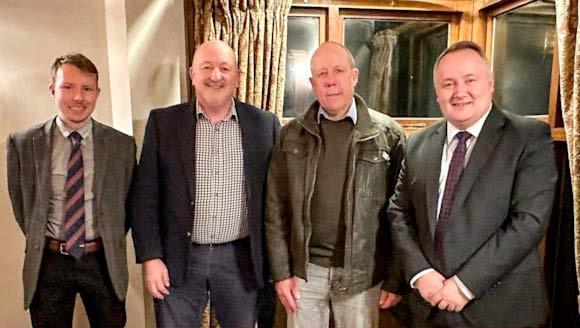
THe farmers’ union of Wales (fuW) recently met with Welsh conservative Senedd Leader, Darren Millar MS and Shadow Minister for Infrastructure, Transport and Rural Affairs, Peter Fox MS to discuss the challenges facing Welsh farmers.
Meeting in Usk, Monmouthshire, the meeting provided an opportunity to focus on a range of issues, including the Sustainable Farming Scheme, bovine TB and the proposed UK Government changes to Inheritance Tax.
High on the agenda was the need for the Welsh Government to deliver stability for the farming sector, with particular focus given to the Sustainable Farming Scheme.
Following upheaval within the sector in February 2024, as a result of the Welsh Government’s initial Sustainable Farming Scheme proposals, November 2024 saw the Welsh Government publish an updated framework. Financial modelling and payment rates however remain under discussion, with an announcement expected in Summer 2025.
Commenting on the SFS, Ian Rickman, Farmers’ Union of Wales President said: “We welcome the progress made on the Sustainable Farming Scheme over recent months, and the Welsh Government’s ongoing commitment to work with the sector.
However, the publishing of the framework in November was merely the end of the beginning, and crucially we
now await details of the funding and payment rates for Welsh farmers. It’s vital these budgets and payment methodology deliver real economic stability for our family farms in Wales as we face a backdrop of many other challenges.”
The Farmers’ Union of Wales officials also took the opportunity to highlight the concerns within the sector regarding the UK Government’s proposed changes to the inheritance tax and agricultural property relief, which have led to mass protests and unrest within the farming sector.
In her first budget, the Chancellor Rachel Reeves, announced that from April 2026, taxes would apply to agricultural assets over £1 million (or up to £3 million in certain circumstances).
At the time, the Chancellor claimed the changes would continue to protect small family farms, with “three-quarters of claims unaffected by these changes.”
However, in their submission to the Welsh Affairs Committee’s call for evidence, the FUW questioned the Treasury’s figures, suggesting that the proportion of farmers affected by changes to APR would be far higher than initially claimed by the UK Government.
Ian Rickman, FUW President added: “Our analysis of the impact of changes to the inheritance tax demonstrates a very concerning pattern suggesting that a significant proportion of Welsh farmers responsible for the majority of Welsh food production

THIS week marks farm Safety foundation’s ‘Mind your Head’ campaign, raising awareness of the emotional and mental health challenges facing farmers.
Whilst Welsh farmers are renowned for the attention they give to their livestock, crops and machinery, we can all do more when it comes to taking care of ourselves and our own wellbeing.
sector, the changes to Inheritance Tax have been at the forefront of this growing sense of anxiety within the sector with farmers across the country fearing the impact the changes could have on their family farms.
and agricultural activity will be adversely affected by the changes to APR.
Given the current and historically low farm profits for the farm types which predominate in Wales, and significant downward pressure on farm incomes due to regulation and changes in support policies, it would appear that in many or most cases such inheritance tax bills would be unaffordable, even when divided over a ten year period, necessitating the sale of large areas of farmland. The subsequent impact on food production, the rural economy, and communities would therefore be far-reaching.”
Commenting following the meeting, Peter Fox MS, who was appointed Shadow Minister for Infrastructure, Transport and Rural Affairs in December 2024 said: “Both Darren and I welcomed the opportunity to meet with the Farmers’ Union of Wales to discuss the many challenges and changes currently facing Welsh farmers.
As we’ve seen through the growing unrest and dwindling morale within the sector, Welsh farmers are currently facing a perfect storm of pressures - be it the ongoing strain of bovine TB and NVZs, to the immense uncertainty over changes to inheritance tax and the Sustainable Farming Scheme.
As Shadow Rural Affairs spokesperson, I look forward to continuing to work with the sector, addressing and raising these concerns, and pressing to ensure farmers’ key role as food producers is safeguarded.”
The extent of the mental health crisis facing the sector was highlighted in a 2023 Farm Safety Foundation report, which saw 94% of UK farmers under 40 identify mental health as the biggest hidden problems they face day-to-day.
The cause of this endemic within the farming community can vary from farm to farm. However, it’s crucial we recognise that agriculture’s very nature often leaves farmers susceptible to such mental health pressures; from working long hours often in isolation, to significant financial pressures, extreme weather and other external influences.
Amongst these external factors, government politics and policies can often bear weight on the wellbeing of farmers. A recent survey by the Farmers Weekly found that politics was a cause of growing worry within the agriculture sector - with 20% of farmers identifying ‘government policy’ as the number one challenge for 2025 (up from 8% last year). As we’ve seen in the ongoing protests and upheaval within the
For many Welsh farmers, the ongoing scourge of bovine TB continues as a significant cause of mental health strain, with a previous study finding 85% of farmers stating that bTB had negatively impacted their own mental health or of someone in their family. These findings were further confirmed in a report launched last month by the Farming Community Network, which found the policy focus on bTB as a serious animal disease often neglected the profound impact of the disease and the implementation of control measures on human health.
In the light of so many changes and challenges facing the sector, this week acts as a timely reminder for us to not only look after our own wellbeing, but also that of our friends and family. Despite the uncertainty facing the sector, help is at hand, and often sharing the load through talking or seeking help can be a big step forward. Here are some details for those who can provide support:



Anyone ordering a new Volkswagen electric vehicle from 4 february to 3 March 2025 will receive a £1,000 saving.
The £1,000 saving is available to anyone ordering a new ID.3, ID.4, ID.5, ID.7, ID.7 Tourer or ID. Buzz, and applies whether they are paying cash or using finance from Volkswagen Financial Services.
People choosing to buy an electric Volkswagen with a personal contract plan (PCP) from Volkswagen Financial Services currently receive generous deposit contributions. These range from £1,700 for an ID.7 or ID.7 Tourer to £8,900 for an ID.5 – so customers ordering a new ID.5 on a PCP by 3 March, for example, save themselves almost £10,000 in total.
“We are really excited to offer this £1,000 saving to customers,” said David Hanna, Head of Network Sales at Volkswagen UK. “We know lots of people are thinking hard about swapping their petrol and diesel cars for an electric alternative. We hope this offer helps to dispel any concerns they might have about affordability and persuades them that an awardwinning electric Volkswagen is the best possible choice.”
More ways to save with an electric Volkswagen
Customers ordering any of Volkswagen’s fully electric ID.

models can choose between a free Ohme car charger for their homes or £500 of We Charge credit for use at public charge points.
There’s also a money-saving tariff add-on and free charging offer from OVO, Volkswagen UK’s official energy partner. OVO’s Charge Anytime can be added to any of its tariffs and lets people charge their electric
cars at home for just 7p per KwH at any time, day or night.
Alongside this, OVO is offering credit worth up to 10,000 free miles to anyone ordering a new electric Volkswagen by 31 March, plus credit worth up to 1,000 free miles on their contract anniversaries for three years.
Full terms and conditions for all current Volkswagen offers
are available online and from any Volkswagen UK Retailer. See model information pages on the Volkswagen website for more about the ID.3, ID.4, ID.5, ID.7 and ID.7 Tourer.
Volkswagen has been the UK’s best-selling new-car brand for the past four years. A total of 166,304 new Volkswagen passenger vehicles were registered in the UK in 2024.
































Isuzu, one of the leading commercial vehicle brands in the UK, is thrilled to announce its latest partnership with the Rik Mayall comedy festival. Making its debut at Droitwich Spa from the 31st May to 7th June 2025, the event is set to spread laughter and promote local and national comedic talent.
Celebrating the legacy of comedy icon, Rik Mayall, renowned for his roles in ‘The Young Ones’ and ‘Bottom’, the festival marks ten years since his passing and is set to feature a number of comedic performances, including stand-up, plays, and sketches. The event organisers are also planning for local businesses to get involved in the festival, with the goal of fostering a region-wide celebration of the event.
Mayall spent his early years in Droitwich, maintaining his close ties with the town throughout his life. The heart of the festival’s organisation, the Norbury Theatre, was a significant landmark in Mayall’s early career.
Head of Marketing at Isuzu UK, George Wallis, said: “Our sponsorship of the first Rik Mayall Comedy Festival is a very exciting foray into the world of comedy for us and many of our audience will be familiar with Rik Mayall’s work. As a brand, we have always incorporated humour and light-

heartedness into our content across various campaigns, so becoming the headline sponsor is a great fit. From the young ones to the old ones, this is certainly a festival for all to get excited about.”
Julian Powell, Finance Director at The Rik Mayall Comedy Festival, commented: “We are very excited to announce Isuzu UK as our headline sponsor for the Inaugural Rik Mayal Comedy Festival. With our ambition
to share humour and goodwill across all audiences, Isuzu were the perfect fit. As we gear up for the festival, we look forward to bringing a brilliant celebration of laughter to the people of Droitwich Spa and beyond.”
Isuzu UK reflects the festival’s promotion of comedy and entertainment, with its own catalogue of satirical and comedic material featuring across the brand.
Notable examples in recent times include ‘Mystery Max’ and the ‘Isuzu Mime’ present across Isuzu’s social media platforms and campaigns. The Pick-Up Professionals have also recently launched their #SidebySide campaign on ITV, championing the importance of mental wellbeing through tackling mental health stereotypes and fostering meaningful conversations.


A fAMIly-RuN dinosaur theme park in Tenby is up for sale for the first time, with a guide price of £4.5 million.
Specialist leisure property adviser Christie & Co has been instructed to handle the sale of the Dinosaur Park, which was built by its current owners in 1994.
The Pembrokeshire attraction features 36 rides and activities, more than 90 animatronic dinosaurs, a woodland trail, play areas, a VR experience, food and drink outlets, and a gift shop.
Located 2.5 miles from Tenby, the park attracts more than 60,000 visitors annually, with 650 families holding season tickets.
The sale includes the theme park, with an option to purchase an additional 120 acres of surrounding land and a threebedroom bungalow under separate negotiation.
Gabriela Williams, business agent for Christie & Co, said: “The Dinosaur Park is an outstanding visitor attraction, and this is a unique opportunity to own a very profitable, turn-key leisure business.”
She added: “Over the past 30 years, the owners have built, grown and developed the park

to the successful attraction it is today, and there is still further scope and potential for expansion.”
The Herald understands
oversee operations.
In other news, the Wales
venue dedicated to digital and immersive arts.

FOR those looking to kickstart a career in Pembrokeshire, apprenticeships at the Port of Milford Haven offer an exciting and practical route into the workforce.
As the UK’s leading energy port and a key economic hub, the Port plays a vital role in connecting southwest Wales to global trade routes. Through its apprenticeship programmes, it is providing valuable opportunities for young people and career changers to gain hands-on experience while earning industry-recognised qualifications.
BuIlDINg cAReeRS
THROugH APPReNTIceSHIPS
Apprenticeships at the Port span a range of departments, allowing individuals to gain skills in areas such as IT, engineering, and port operations. These roles provide a practical learning experience, equipping apprentices with the expertise needed to thrive in their chosen careers.
One such success story is Craig Davies, who joined the Port’s IT department as an apprentice in 2021 after completing a Level 3 IT Practitioner course at Pembrokeshire College.
“Starting the apprenticeship was a big step, but an exciting
one,” Craig recalled. “It gave me real-world responsibility while still allowing me to learn on the job. The experience of earning and learning at the same time was invaluable.”
HANDS-ON exPeRIeNce AND cAReeR PROgReSSION
During his two-year apprenticeship, Craig gained extensive experience working in the Port’s Digital Solutions and Delivery department. He attended training courses, networked with professionals, and even had the opportunity to travel for workrelated learning.
“Being in a real working environment helped me build connections and develop my skills far beyond what I could learn in a classroom,” he said. “One of the best parts was the variety—one day I’d be in the office, and the next I’d be working at the Pembroke Dock Ferry Terminal or out on a jetty.”
Beyond professional development, Craig also valued the social aspects of his apprenticeship. “The Port really invests in team building, which made the experience even better.
We even did an escape room once—it was a great way to get to know people.”
After completing his apprenticeship in 2023, Craig was offered a full-time position as a Junior Systems Administrator at the Port.
“If you’re someone who learns best by doing, rather than sitting in a classroom, an apprenticeship is definitely the way to go,” he said. “It prepares you for real work in a way that studying alone never could.”
As for his future, Craig is happy to be building his career in Pembrokeshire. “I never wanted to move away for university, so finding a great career opportunity here was perfect. Pembrokeshire is a fantastic place to live and work—I wouldn’t want to be anywhere else.”
For those interested in exploring apprenticeship opportunities at the Port of Milford Haven, more information can be obtained by contacting mhpaenquiries@mhpa. co.uk.
THe PIcTuReSQue seaside town of Tenby, known for its golden beaches and bustling tourism industry, is now making headlines for an alarming rise in shoplifting. Once considered a safe haven for holidaymakers and retirees, the town has been grappling with a crime wave that has left local businesses reeling.
Surge in Retail Theft Tenby business owners have reported a dramatic increase in thefts, with some estimating annual losses of up to £26,000 due to shoplifting. Fiona Malone, co-owner of Tenby Stores and Post Office, noted that the problem has escalated since the COVID-19 pandemic. “When we first moved here, crime was almost non-existent. Now, we’re facing theft on a daily basis, from teenagers to elderly individuals,” she said.
The town’s small independent retailers are among the hardest hit, as they lack the corporate security infrastructure of larger chains. Items such as alcohol, pet food, and high-value goods are frequently targeted. Business owners have been forced to lock away premium stock or remove certain products from shelves altogether to combat the issue.
According to data from the Office for National Statistics (ONS), shoplifting offences in England and Wales surged by 23% in the year leading up to September 2024, with over 492,000 cases recorded. Tenby has not been spared from this trend, with Dyfed-Powys Police reporting a 12% rise in shoplifting incidents, the highest figure in the region’s recorded history.
The issue has gained national media attention, with coverage from The Express, Wales Online, and The Times highlighting Tenby as a microcosm of a broader crisis gripping UK retailers. The British Retail Consortium recently declared that retail crime has reached “epidemic levels,” warning of the impact on small businesses struggling with theftrelated losses.
In response, Tenby traders have launched a community-led initiative known as ‘Shop Watch,’ where local businesses share intelligence, photos of offenders, and security advice. Many retailers have also invested in AI-driven surveillance technology, such as x-hopper headsets and security cameras, which automatically detect potential theft and alert staff in real-time.
However, the situation has escalated beyond theft, with reports of shop workers being threatened and even assaulted when confronting criminals. “Vince challenged a thief, and he was punched

in the face. The thief actually asked, ‘Why are you stopping me?’ as if it was his right to steal,” Fiona Malone recalled. “Many people think independent shops can absorb the losses like Tesco or Sainsbury’s, but that’s simply not true.”
cAllS fOR STRONgeR POlIcINg
Despite increased store security, business owners believe law enforcement needs to take stronger action. While Dyfed-Powys Police have stepped up patrols, retailers argue that shoplifting is not taken seriously enough by the justice system. The Welsh Retail Consortium has
called for harsher penalties and a more proactive policing approach, pointing out that Welsh retailers alone lose an estimated £100 million a year to theft.
Sara Jones, head of the consortium, stressed the severity of the issue: “The latest figures show the shocking reality of retail crime and its impact on our communities. The recent UK Government funding of £3 million to tackle retail crime is a start, but much more needs to be done to protect both shop workers and customers.”
fuTuRe Of ReTAIl IN TeNBy
As the town enters another busy tourist season, business owners remain hopeful but cautious. “We love Tenby. It’s our home, and we want it to be a welcoming place,” said Fiona Malone. “But we also need to protect our livelihoods. Without proper intervention, small businesses will continue to suffer.”
The shoplifting crisis in Tenby reflects a nationwide issue that is forcing independent traders to adapt, invest in security, and call for more robust law enforcement. Whether these efforts will be enough to curb the rising tide of retail crime remains to be seen.



eMeRgeNcy healthcare in Wales is failing too many people, according to a stark new report by Llais, the statutory body representing the public’s voice in Welsh health and social care. The report, based on feedback from over 700 people, calls for urgent action, warning that the state of emergency services has reached a crisis point.
Llais’ study, conducted over a five-week period, included visits to 42 emergency departments, minor injury units, and medical assessment units across Wales. The findings highlight severe delays, overcrowding, and a system struggling to meet even basic expectations.
Patients forced to find their own way to hospital
One of the most alarming takeaways from the report is the frequency of ambulance delays. Many patients reported waiting for up to 12 hours for emergency transport, forcing them to either drive themselves or rely on friends and family, despite being seriously unwell. Some even risked worsening their condition by taking taxis or public transport.
A patient at Morriston Hospital’s emergency department described the situation as dire: “I drove because the ambulance ETA was 7-8 hours, but I had severe chest pain and couldn’t wait that long.”
Others recounted horror stories of being sent to the wrong hospitals due to poor communication, leaving them stranded and paying exorbitant taxi fares to correct the mistake. One patient, initially taken to Glangwili Hospital despite their complex spinal history, had to pay £130 for a taxi back to Swansea, where they should have been taken in the first place.
Unbearable waiting times and overcrowding
The report details widespread reports of excessive waiting times, with many patients enduring 8 to 24 hours before receiving care. In some cases, waits exceeded 26 hours. Overcrowding is commonplace, with many patients left waiting in corridors, unable to access beds or even chairs.
One individual at Royal Glamorgan Hospital A&E said: “I’ve been waiting 12 hours and only had triage and a water sample. I’m in a corridor that’s meant to be for paediatrics – it’s uncomfortable and degrading.”
Families of vulnerable patients described feeling abandoned, with little communication from staff about their loved ones’ condition. One woman at Bronglais General
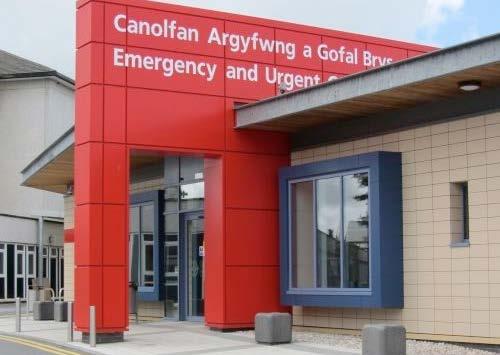
Hospital recounted her frustration: “We are not too sure what is going on. We spoke to a nurse just over an hour ago. We are still waiting. We’ve been given no explanation of what the treatment is to be.”
The Llais report warns that the pressures on Welsh emergency services are not temporary, but systemic. Since the study was conducted, ‘business critical incidents’ have been declared by both the Welsh Ambulance Service NHS Trust and Aneurin Bevan University Health Board. Other health boards, including Swansea Bay and Cwm Taf Morgannwg, have issued urgent warnings about overwhelming demand.
Llais Chief Executive Alyson Thomas has called for immediate action, stating: “The voices we’ve heard paint a stark picture of a system under immense pressure. While we commend the dedication of healthcare staff, they are working in a system that is not giving them or the people they care for the support they need.”
The report calls for urgent measures, including:
• faster ambulance response times
• Better coordination between emergency services and primary care
• Increased staffing and resource allocation
• Improved dignity and care for patients waiting in
corridors
• greater transparency and accountability from NHS Wales and the Welsh government
Welsh Conservative response: “Labour’s mismanagement to blame”
James Evans MS, Welsh Conservative Shadow Cabinet Secretary for Health and Social Care, has sharply criticised the Welsh Labour Government’s handling of emergency care.
“Emergency care is losing the very essence of its definition. Responses are too slow, and far too many people are suffering as a result of Labour’s mismanagement,” Evans stated.
He dismissed the idea that ‘winter pressures’ could explain the ongoing crisis, arguing that the current state of emergency care has become an unacceptable ‘new normal.’
“No one should be waiting over 12 hours in A&E, certainly not the many thousands we are seeing every month. The Welsh Labour Government seems completely unwilling to get to grips with this situation. Only the Welsh Conservatives stand ready to replace them so that we can fix Wales.”
Keir Starmer, Prime Minister, acknowledged the crisis, stating: “The NHS in Wales is in urgent need of reform. Investment and reform need to go together… On occasions, using the private sector to get down waiting lists? Yes, that’s been going on a long time. We will do that to get waiting lists down.”
In a Senedd debate in January
2025, concerns were raised that waiting lists have hit record highs after nine months of continuous increases, forcing many patients to pay for private healthcare after years of waiting.
First Minister of Wales, Eluned Morgan, stated: “Reducing waiting times must be our key objective… It’s about rolling up our sleeves and collaborating to deliver the investment and reform desperately needed for healthcare in Wales.”
A Welsh Labour Government statement reaffirmed their commitment to the NHS: “Your Welsh Labour Government will always support the NHS – and will always support the NHS to change and modernise. That means continuing to invest in the NHS… Reforms have also focused on providing more care and NHS services out of hospital and in local communities.”
With emergency care in Wales under “extreme and unsustainable pressure,” as described by Llais Chair Professor Medwin Hughes, many patients and staff feel abandoned in a system that is failing them.
“The dignity of patients is not even being considered anymore. The system is chaotically inefficient and in desperate need of a review,” one patient at Glan Clwyd Hospital remarked.
Llais has vowed to keep pushing for reform, but with patient experiences growing increasingly dire, the question remains: how much longer can Wales’ emergency healthcare system hold on before it completely collapses?
PATIeNTS who rely on Kilgetty Dispensary for their medication are being urged to collect prescriptions before the facility temporarily shuts down due to a high level of staff sickness.
Saundersfoot Medical Centre, which operates the dispensary, has announced that the closure will take effect from Monday, February 17, 2025.
A spokesperson for the medical centre said: “We have taken the difficult decision to close the Kilgetty Dispensary temporarily from Monday, February 17, due to a high level of sickness among staff.”
Patients are being advised to collect their medication before 1:00pm on Friday, February 14, 2025, to avoid disruption. Any uncollected prescriptions will be transferred to Saundersfoot Surgery, where they will be available for collection between 8:00am and 1:00pm, Monday to Friday.
The medical centre has assured patients that updates will be provided as soon as possible regarding the reopening of the dispensary.
Residents who rely on Kilgetty Dispensary are encouraged to make alternative arrangements and ensure they have sufficient medication before the closure takes effect.
For further information, patients can contact Saundersfoot Medical Centre on 01834 815115.

PeOPle in Wales have revealed the health ‘Pearls of Wisdom’ they would tell their younger selves, including to avoid listening to music at full blast, always wear sunglasses – even in winter – and to get enough sleep, according to new research.
This comes as nearly two thirds (63%) admit they ignored a potential health condition before the age of 30, which later flared up, with a similar amount (60%) skipping regular health check-ups when they were younger.
The poll of over 2,000 UK adults over 40 also revealed those in Wales wish they had prioritised regular exercise, even if it’s just walking (63%), and getting enough vitamin D (35%). Others would recommend not ignoring their mental health (37%), starting a skincare regime earlier in life (32%) and taking better care of their hearing (16%). In fact, almost two in 10 (19%) would advise younger generations to always pack hearing protection when heading to a gig.
The research, commissioned by Specsavers to mark Tinnitus Awareness Week (3-9 February 2025), highlights the importance of regular health checks to improve health and wellbeing later in life.
More than three-quarters (77%) of people in Wales over 40 admit they rarely or never took steps to protect
their hearing when exposed to loud environments in their youth. They are now feeling the consequences with (41%) rating their hearing as average or poor and nearly two-thirds (61%) reporting they experience occasional tinnitus, a condition in which you hear ringing in your ear.
DJ Woody Cook, who lives with tinnitus said: “Without a doubt, my tinnitus is from listening to loud music. As a DJ, my hearing is crucial. I wish I’d known earlier about the risks and protected my hearing better, but it’s not too late, and with the right hearing protection I’m able to stop my tinnitus from getting any worse.”
Three in 10 blamed their past health naivety on a lack of awareness of long-term consequences, while 32% admitted they didn’t have enough knowledge about preventative care.
Specsavers chief audiologist, Gordon Harrison, said: “When you’re young, prioritising your health can take a backseat to work and socialising. But many adults now wish they had been more proactive—whether in staying active, getting enough sleep, having regular eye tests or protecting their hearing.
“Tinnitus is a growing issue, with huge numbers of adults experiencing the condition. While it is not known exactly what causes tinnitus, exposure
to loud noise can trigger the condition and that’s why protecting your hearing is so important.”
The findings show that there is a lack of awareness of long-term consequences with more than two thirds (65%) not fully understanding the impact of poor health habits until later in life. By highlighting these findings, Specsavers hopes more people will take preventative health more seriously to help prevent long-term implications.
If you have any concerns about your hearing or want to find out more information visit specsavers.co.uk/ hearing/hearing-test
• Top health tips people in Wales over 40 would tell their younger selves:
• Drink more water every day (65% recommend)
• Prioritise regular exercise, even if it’s just walking (63% recommend)
• Eat a balanced and nutritious diet (54% recommend)
• Get enough sleep (55% recommend)
• Avoid smoking entirely (56% recommend)
• Wear sunscreen, even on cloudy days (45% recommend)
• Get enough vitamin D (35% recommend)
• Do not ignore your mental health
(37% recommend)
• Don’t skip regular eye exams (30% recommend)
• Always wear sunglasses – even in winter (27% recommend)
• Start a skincare regime early (32% recommend)
• Take better care of my hearing (16% recommend)
• Don’t skip regular hearing checks (18% recommend)
• Don’t have your headphones at full blast (18% recommend)
• Wear earplugs to gigs (19% recommend)


PlAID cymru blames Welsh government funding and NI hike
PLAID CYMRU on Carmarthenshire County Council has blamed inadequate Welsh Government funding and the Labour Chancellor’s National Insurance hike for creating a multi-million-pound shortfall in the council’s budget for 2025/26—forcing an increase in Council Tax of 9.75%.
Cabinet Member for Resources, Cllr Alun Lenny, said: “In my experience, this year is even worse than all those years of Tory austerity. Due to inflation, pay settlements, and growing demand, we needed an extra £55m to fund essential services like social care and education, but received just £25m in annual grants from the Labour Welsh Government. We’ve had to fill the gap with efficiencies and a far higher Council Tax rise than any of us would like.”
Cllr Lenny said only 16% of the council’s income comes from Council Tax, with each 1% rise generating £1m. He added that the council had initially anticipated a 4-5% rise, but the National Insurance changes introduced by Labour Chancellor Rachel Reeves would leave the council £4m out of pocket.
“The Labour Chancellor’s action has also hit local businesses hard, with lowerpaid workers in retail and hospitality particularly worried about their jobs,” he said.
Cllr Lenny also criticised the disparity in UK Government funding, highlighting that councils in England are receiving extra money through the £4.7bn Local Transport Fund. He said Herefordshire—a county with a similar population and highways network to Carmarthenshire— was getting an extra £102m over the next seven years.
“That scale of spending on roads is something we can only dream about, and shows that we in Wales are the poor relatives when it comes to UK Government funding,” he said.
He also slammed Westminster’s refusal to allocate consequential funding from the HS2 railway development in England, stating that Plaid Cymru estimates Carmarthenshire’s share should be around £250m—enough to solve its budget issues overnight.
WHy ARe cOuNcIl TAx RISeS HAPPeNINg AcROSS

Carmarthenshire is not alone in facing a sharp increase in Council Tax, with many Welsh councils struggling to balance their budgets. Several key factors are driving these rises:
• Funding shortfalls for local authorities: Despite an additional £253m allocated to local councils in the Welsh Government’s draft budget, the Welsh Local Government Association has identified a shortfall of £560m. This leaves councils unable to meet rising demands without increasing taxes, cutting services, or making job reductions. For example, Wrexham Council is considering tax hikes of up to 15% to address these challenges.
• Inflation and service pressures: Councils are dealing with significant inflationary pressures and increased demand for public services, particularly in social care and education. These factors have exacerbated financial strains, forcing councils to consider tax increases to maintain service levels.
• Outdated tax system: Council tax in Wales is based on property values from 2003, making it increasingly outdated and regressive. This system
creates disparities between councils and households, as property values and local needs have changed significantly over the last two decades.
• Delays in tax reforms: The Welsh Government had planned to reform council tax by revaluing properties and introducing new tax bands to make the system fairer. However, this has now been postponed until 2028, meaning councils must continue relying on an outdated system to generate revenue.
• Limited fiscal devolution: Welsh councils rely heavily on central government grants, restricting their ability to raise local revenue and adapt taxation to local needs. This dependency leaves them vulnerable to funding shortfalls when government grants fall short of rising costs.
PuBlIc cONceRNS AND WelSH gOVeRNMeNT ReSPONSe
Public opposition to rising Council Tax bills has been growing. A petition has been launched calling for Welsh councils to be limited to a maximum annual increase of 2% from April 2025. Meanwhile, Labour’s stance on Council Tax has shifted, with UK Labour ruling out changes to Council
Tax bands. This contradicts the Welsh Labour government’s previous plans, creating a potential policy divide between Cardiff and Westminster.
A Welsh Government spokesperson said local authorities in Wales receive significantly more funding per capita than those in England and that difficult financial choices stem from wider economic factors, not just Labour policy.
A Welsh Labour source added: “We are committed to supporting councils, but the economic reality is that years of Tory austerity, inflationary pressures, and high interest rates have made local government funding more challenging.”
cARMARTHeNSHIRe cOuNcIl’S POSITION
Despite financial pressures, Carmarthenshire County Council has committed to continued investment in education, housing, and adult and children’s services. Following public consultation, the council has scrapped plans to close public toilets unless asset transferred, will only increase car parking charges in line with inflation, and will invest more in highways, gully cleaning, and flood prevention.
As the Welsh Government finalises its budget, Plaid Cymru has pledged to lobby for fairer funding up until the last moment.

VIOleNce in Welsh schools has reached a deeply disturbing level, according to Darren Millar MS, Leader of the Welsh Conservatives, who raised the issue during first Minister’s Questions (fMQs) in the Senedd today. His comments come in the wake of the recent conviction of a teenage girl for a stabbing attack at Ysgol Dyffryn Ammanford, as well as a serious lockdown incident at ysgol Harri Tudur in Pembroke Dock, further highlighting the increasing threats facing students and teachers across Wales.
Mr. Millar expressed grave concerns about reports of school lockdowns, weapons being brought onto school premises, and a surge in assaults on teachers. He was particularly critical of the Welsh Government’s changes to
Tom Sinclair editor@herald.email
exclusion reporting guidelines, which no longer require the possession of a weapon to be recorded as a reason for exclusion.
In addition to growing safety fears, Mr. Millar pointed to the mounting teacher recruitment crisis, warning that rising violence is discouraging people from entering the profession. Figures show that the number of teachers registered with the General Teaching Council has dropped by over 20%, with last year seeing the highest number of

resignations in over a decade.
Following the FMQs session, Mr. Millar called for immediate action to address the escalating crisis:
“The rise in violence in our schools is deeply disturbing. No teacher or pupil should feel unsafe, yet with reports of weapons being brought into classrooms and teachers facing abuse and assault, it is clear that more must be done.”
He criticised the Welsh Labour Government’s stance on school exclusions, arguing that softening policies sends the wrong message:
“Rather than tightening policies to protect teachers and students, the Welsh Labour Government has
weakened exclusion guidance. There must be a hard and fast rule that carrying a weapon into school results in exclusion, full stop.”Mr. Millar also blamed the Labour Government’s inaction for exacerbating the teacher retention crisis:
“Under Labour’s watch, school violence is up, teacher numbers are down, and educational outcomes are suffering. It’s time for the Welsh Government to take responsibility and deliver the safe, high-performing schools our children and teachers deserve.”
With concerns mounting, pressure is growing for the Welsh Government to implement stronger measures to ensure the safety of both students and teachers in schools across the country.
NeW RuleS cOulD ReSHAPe
THe WAy SNAcKS ARe SOlD
SHOPPeRS in Wales may soon find fewer tempting offers on unhealthy snacks as the Welsh government plans to ban the promotion of junk food in supermarkets.
Under the proposed regulations, retailers with 50 or more employees will be prohibited from placing sugary, salty, and fatty foods near tills, store entrances, or at the end of aisles. Similar restrictions will apply online, preventing junk food promotions from appearing on homepage banners, category pages, or checkout screens. The crackdown, which could come into effect in March 2026 if approved by the Senedd next month, would also spell the end for buy-one-get-one-free deals and free refills on sugary drinks.
Health Secretary Jeremy Miles
defended the measures, highlighting concerns about childhood obesity.
“With nearly a quarter of children in Wales overweight or obese by the time they start school, we must take action to help people make healthier choices,” he said.
Retailers who fail to comply with the new rules could face fines of up to £2,500.
The proposed legislation is similar to rules introduced in England in 2022 and follows a consultation launched last year. However, the Welsh Retail Consortium has raised concerns, particularly over limits on promotional pricing, arguing that price competition benefits customers.
“Restricting meal deal offers and category promotions could impact affordability for consumers,” a

spokesperson warned.
Some smaller businesses, such as independent sweet shops and specialist chocolatiers, will be exempt from the restrictions.
The Welsh government says the new rules are designed to curb
impulse buying of unhealthy foods and encourage better dietary habits across the nation. However, with opposition from some in the retail sector, the debate over balancing public health and consumer choice is set to continue.

the uK labour government to draw up plans for real economic investment in former mining communities across Wales.
The Liberal Democrats were critical of both the Conservatives and Labour’s record in former mining communities and have called for significantly more economic investment to boost growth across former mining communities in South Wales.
Across Wales, nearly 800,000 people – about a third of the population – still live in former coal mining towns. In the South Wales Coalfields, there are just 46 jobs for every 100 working-age people.
The South Wales Valleys have significantly higher levels of poverty, unemployment and sickness than other parts of Wales and the UK.
Welsh Liberal Democrat Deputy Leader and MP for Brecon, Radnor & Cwm Tawe, David Chadwick, accused the new Labour Government at Westminster of abandoning any idea of ‘levelling up’ and chasing a London-dominated, bankerfocused form of growth that will do nothing to address regional inequality in the UK.
The criticism follows a raft of new infrastructure projects in the South East of England being announced by the Chancellor Rachel Reeves last week, with not a single project being located in Wales.
David Chadwick highlighted

W ITH ANDREW LYE
the proposed the Global Centre of Rail Excellence, a railway infrastructure and technology testing facility, located in a former coal in Onllwyn, Wales as a primary example of a project that could transform former mining communities if it gets the funding needed to get off the ground.
David Chadwick warned that the rise in populist politics has been a direct response to former industrial communities being ignored by political leaders for too long and an overwhelming feeling within those communities of being left behind.
The Welsh Liberal Democrats also criticised the slow movement and a lack of funding to make coal tips safe as well as the failure to address the pensions of miners on the British Coal Staff Superannuation Scheme (BCSSS) scheme, of which 4,000 live in Wales.
David Chadwick MP said:
“People in the South Wales Valleys are desperate to be heard. The legacy of Margaret Thatcher’s policies: the closure of our primary industry and the failure to replace it with anything else, has left lasting scars. It is not hard to see why people in South Wales wonder whether their governments are listening to them.
“Labour looks set on following the Conservatives’ failed economic plan of focusing on the Southeast of England and bankers, rather than actually addressing regional inequality and developing our former industrial communities.
“The Liberal Democrats stand for change; we want to see things in former mining communities really improve. Coalfield communities deserve to be at the forefront of economic renewal they want the government to show them that they matter.
“I know from first-hand experience that communities in the coalfields are resilient and industrious and ready to succeed—they just need the opportunity to do so.”
If you have any issues or comments, please contact me at andrew.lye@pembslibdems.wales
MARK DRAKefORD resisted calls to exclude under-18s from the Welsh government’s plans for a tourism tax from 2027.
The finance secretary told the Senedd’s finance committee that exempting children from the levy as in some other European countries would lead to a “significant fall” in the tax take.
He said: “I see that you have heard from a range of voices who argue that particular groups ought to be excluded from the levy…. This is a broad-based tax with a low charge – if you narrow the base, the only way you can sustain the take from the tax is to put the charge up.”
Prof Drakeford said taking under-16s out of the £1.25-a-night levy would see the estimated £33m revenue fall to £21m, “eroding the chances that the levy will be of any use.”
He stressed: “If the committee wants to argue for excluding children from the levy, you are arguing for a higher charge on the people who are left – you can’t have both.”
Prof Drakeford pointed out: “Children buying sweets pay VAT. Children are not excluded by the virtue of being children from the taxation system.”
He defended the visitor levy bill after a report found the levy could lead to between 250 and 730 job losses and cost the Welsh economy £16m to £47m a year.
The finance secretary was questioned about the economic impact assessment by Calvin Jones, a professor at Cardiff University, as he gave evidence on February 12.
He said: “Professor Jones’ report deals with a set of complex considerations. It has, inevitably, to make a series of assumptions and deal with a series of uncertainties. It assumes, for example, that all 22 local authorities have adopted the levy from day one.”
Rejecting suggestions the report undermines the case for a levy, Prof Drakeford told the committee some witnesses exclusively referred to figures for a worst-case scenario.
He said: “I did think there were some witnesses who came before you who presented Prof Jones’ report as though it was a set of predictions rather than a range of possibilities.”
Prof Drakeford added: “Even if the impact was at the top end, you are talking about a few hundred jobs in an industry that employs

the UK Government’s decision to increase employer national insurance contributions.
over a million people…. This is not an industry, I think, that will struggle to accommodate the impact of the levy.”
Pressed about the timing with the sector still recovering from the pandemic, he said: “When some organisations have said to you ‘oh, not now’, what they really mean is ‘not ever’.”
Prof Drakeford stressed “There’s a long lead in, this is not an idea that has suddenly been put in front of the sector and there’s a long path in front of us as well.”
He said the earliest any council could introduce a local levy would be April 2027, adding that he expects only a modest number of local authorities to do so initially.
Peredur Owen Griffiths, who chairs the committee, raised the “cumulative” effect of policies such as national insurance and the 182day rule for holiday lets to qualify for business rates.
South Wales East MS Peredur Owen Griffiths
South Wales East MS Peredur Owen Griffiths
Prof Drakeford replied: “We’re familiar with the argument about comparing apples and pears but that list, I think, is the full fruit salad because they’re all completely different issues.”
He told the committee many microbusinesses in the tourism sector will be no worse off after
Asked about introducing a dayvisitor levy rather than an overnight tax, the former First Minister said: “I didn’t want to see the search for the perfect driving out the possible.”
Prof Drakeford rejected suggestions that families could upend their holiday plans over the proposed £1.25-a-night levy, arguing it will have a marginal impact.
He said: “There are so many other factors that will have an impact both on costs and people’s decision-making which will loom far larger than the visitor levy.
“On the whole, what we hear from the continent where this is commonplace is that visitor levies are broadly invisible to the end user.”
Prof Drakeford explained the bill would require councils to consult on whether to adopt a levy then report annually on the use of the revenue raised.
He told committee members: “The idea that you could easily slide a bit of that money away towards something else, I don’t think will be easy.”
Prof Drakeford said the visitor levy bill, which would create a fee-free register of providers, will be followed by a second bill on licensing accommodation in the autumn.

SeNeDD Members from across the political spectrum paid tribute to Dafydd elisThomas following the former Plaid cymru leader’s death on friday.
Lord Elis-Thomas served as the first speaker of the thenNational Assembly for Wales for 12 years from the dawn of Welsh devolution in 1999 until 2011.
Elin Jones, the current speaker or Llywydd, described her predecessor as a “close friend to many here, a political comrade to many too, and an enigma to all”.
Leading tributes in the debating chamber, or Siambr, on February 11, she said: “This Senedd today is what it is because, to a very great extent, of Dafydd Elis-Thomas.
“And, certainly, all of us in this wonderful Senedd building and this wonderful Siambr are here because of Dafydd’s vision and perseverance.”
Lord Elis-Thomas left Plaid Cymru to sit as an independent in 2016 after clashing with former leader Leanne Wood over support for the Labour Welsh Government.
A year later, he was appointed minister for culture, sport and tourism in Carwyn Jones’ government – a role he held until stepping down at the 2021 election.
Eluned Morgan, who joined the Welsh Government in the same reshuffle, said Wales had lost one of its greatest servants who left an indelible mark on the nation’s democracy.
Baroness Morgan told the
And, after quitting the party only six months after the 2016 election, Lord Elis-Thomas, rejected calls from former colleagues to trigger a by-election.
Rhun ap Iorwerth, Plaid Cymru’s current leader, described his predecessor as a peerless politician who was a part of the party’s DNA for more than half a century.
Mr ap Iorwerth said: “Wales is indebted to Dafydd for shaping this chamber as it is today but its debt is just as great to him for standing for what was just and what was right.
“And he shaped our nation in accordance with those values. We could not have wished for a better inaugural Llywydd than Dafydd. He was a political architect, a man of bold vision.”
Lord Elis-Thomas began his political career in 1974 as the “baby of the house”, the thenyoungest MP, before serving as a Senedd Member for 22 years from 1999.
SAM KURTz
Well, here we are. Already halfway through february. The evenings are getting a little lighter, spring is tiptoeing closer, yet the stubborn winter weather seems determined to keep us all huddled indoors
So, if we are to stay inside, let’s at least do it somewhere warm, welcoming, and wellstocked—like the great British pub. With its cosy nooks, hearty food, and a perfectly poured pint, what’s not to love?
The response so far has been fantastic, with nominations pouring in from across West Wales. Clearly, people have a deep appreciation for their locals—and rightly so. The winning pub will not only earn the prestigious title of the best in the region but will also receive a free barrel of a standard beer of their choice, thanks to Templeton Beer, Wine, and Spirit Co. Visit www.samuelkurtz. wales to vote.
Siambr: “He helped to establish this institution when it was a fragile flower, he encapsulated the best of the Welsh intellectual tradition.”
She said Lord Elis-Thomas transcended party lines, influencing Labour as well as Plaid Cymru and prompting a shift from the party’s more unionist tradition towards devolution.
Baroness Morgan joked: “He’d always have a go at things. On one occasion, he went on a visit to Zip World. The sight of a lord bouncing up and down on a trampoline in the caverns in Llechwedd was, I’m told, a sight to behold.
“And, in classic Dafydd style, when he emerged from the chwarel [quarry] he pointed to a plaque on the wall which he’d unveiled 40 years previously.
“That was Dafydd – he’d been everywhere and he knew everyone.”
Lord Elis-Thomas, who was party leader from 1984 to 1991, hoped for a homecoming in 2023 but abandoned his bid to rejoin Plaid Cymru in the face of a disciplinary-style process.
Often outspoken, the Carmarthen-born politician had a rocky relationship with his own party and faced criticism for accepting a life peerage in 1992.
As Senedd speaker in 2004, he ordered Ms Wood to leave the chamber for “discourtesy” after she called the Queen “Mrs Windsor” then refused to withdraw the remark.
Darren Millar, leader of the Senedd Conservative group, described Lord Elis-Thomas as a titan of Welsh politics who was never afraid to challenge the status quo.
Mr Millar said: “It was Dafydd’s steady hand that helped cement the Senedd’s place at the heart of our national life and Welsh democracy.”
The Tory recalled the peer approaching him at an event at the Welsh Mountain Zoo and saying: “I’ve come to see you in your natural habitat.”
Welsh Lib Dem leader Jane Dodds said: “When strong characters pass away it’s a time to remember that we, here, as Members of the Senedd stand on the shoulders of giants.”
Mabon ap Gwynfor, who succeeded Lord Elis-Thomas as the Senedd Member for Dwyfor Meirionnydd, described his contribution to Welsh politics as immeasurable.
His Plaid Cymru colleague Adam Price told the Senedd: “His truly was a long march through the institutions, an embodiment of that idea that sometimes the most revolutionary act is to take your seat at the table and ever so subtly change the conversation from within.”
He said: “More than anyone else, Dafydd El – and to those of us who knew and loved him, he will always be Dafydd El –expanded the political horizons of Wales’s possibilities.”
But there’s another reason to visit your local right now: February is a tough month for pubs. After the festive rush of Christmas and New Year, business takes a sharp dip. Meanwhile, energy costs remain high, staff still need paying, and landlords face the daunting task of keeping their doors open through the leanest months of the year.
This start-of-the-year slump can be make-or-break for many establishments. However, there’s also a silver lining. The Six Nations is in full swing and, while our national team’s performance might leave something to be desired (perhaps the less said, the better. Sorry, Warren), hope is not entirely lost. With three games left and the Triple Crown still up for grabs, the optimist in me believes a miracle could still unfold. And what better place to witness such sporting drama than in your local pub, soaking up the atmosphere, sharing the highs (and inevitable lows) with fellow fans, and enjoying a proper pint?
Speaking of local pubs, I’ve been on a mission to find the best one in Pembrokeshire. That’s why I launched a competition where you can nominate your favourite watering hole. This is more than just a popularity contest; it’s a celebration of the crucial role pubs play in our communities. They provide jobs, boost the local economy and, perhaps most importantly, serve as social hubs where friendships are made and memories shared.
And let’s not forget the wider challenges facing the industry. The recent increase in employer National Insurance contributions following the UK Labour Government’s Budget, coupled with the reduction in Business Rate Relief from 75% to 40%, has made life even tougher for pubs. This is on top of the fact that many are still reeling from the long-lasting effects of the Covid pandemic. Pubs are more than just places to grab a drink. They are cultural institutions, vital meeting points, and cornerstones of local life. From quiz nights to charity fundraisers and live music events, they help keep our communities vibrant. Losing them wouldn’t just be a blow to the hospitality industry—it would be a loss to society as a whole.
So, if you have a pub you love, now’s the time to show your support. Pop in for a meal, catch a game with friends, or simply nominate them in our competition. Every little bit helps to keep these cherished establishments thriving. Let’s raise a glass to our local pubs and ensure they remain at the heart of our communities for years to come.

SEND YOUR LETTERS TO: THE EDITOR, 11 HAMILTON TERRACE, MILFORD HAVEN, PEMBROKESHIRE, SA73 3AL
EMAIL US AT: editor@herald.email


The recent report by Sion Barry on WalesOnline (feb 5) exposes a shocking failure of governance in the tendering process for the demolition of Aberthaw B coal Power Station. The cardiff capital Region’s mishandling of the £30m contract has resulted in legal proceedings that could cost taxpayers millions. This scandal should prompt criminal investigations into those responsible and serve as a dire warning about the reckless policies reshaping Wales’ energy landscape.
For years, I have raised concerns about the environmental damage and historical losses caused by energy projects in Wales. In 1999, I wrote to the Aberthaw Power Station manager regarding the toxic waste tips and the station’s legal obligation to restore the surrounding landscape upon
closure. That letter, ignored like so many others sent to politicians, warned of the irreversible damage caused by neglecting remediation responsibilities.
Instead of preserving Wales’ natural beauty, politicians have allowed vast swathes of land to be scarred by industrial-scale wind farms, solar panels, and battery parks—none of which will ever be restored.
The thousands of acres sacrificed to unreliable “renewables” are lost forever. The latest plan for a so-called “energy park” at Aberthaw, reliant on outdated lithium battery technology, is just another example of this short-sighted destruction.
Aberthaw once formed part of a stunning coastline, where the River Thaw meandered into the sea, and where families enjoyed its sun-warmed pools and sandy beaches. This heritage has been buried under industrial ash and forgotten by those in power. Now, thousands of Chinese solar panels are planned for the Thaw Valley—useless at night and ineffective in Wales’ frequent gloom—while lithium battery parks, as hazardous as
is celebrating its 20th anniversary, taking on the 20-mile walk felt like the perfect way to mark this milestone. I want to encourage your readers to lace up their walking boots and join me in signing up to help raise vital funds for Breast cancer Now.
unexploded ordnance, are being approved across the country. Even China itself is moving away from lithium for safety reasons, yet our leaders continue down this dangerous path.
Who in the Senedd has the sense and courage to stop the permanent harm being done to Wales? The destruction of Aberthaw is a warning: if we do not act now, future generations will inherit a Wales that is unrecognisable, its landscapes ruined and its history erased—all in the name of a misguided energy policy.
Terry Breverton
30 Chandlers Way, Penarth
As an Olympian, I am always looking for my next physical challenge. I am also a proud ambassador for Breast Cancer Now, so when I learned that their Pink Ribbon Walk series
Having been diagnosed with breast cancer myself at the age of 36, this cause is incredibly close to my heart. I know firsthand how devastating a diagnosis can be, and how Breast Cancer Now’s groundbreaking research and life-changing support bring hope to those affected. On Saturday 10 May, I will be walking at the Blenheim Palace Pink Ribbon Walk, alongside others impacted by this disease, raising funds so that Breast Cancer Now can continue to be there for the 55,000 women diagnosed with breast cancer each year in the UK.
From April to June, Pink Ribbon Walks will take place across four stunning locations:
• Hampton Court Palace –Saturday 26 April
• Blenheim Palace –Saturday 10 May
• Crieff Hydro (Scotland) – Saturday 31 May
• Chatsworth House –Saturday 21 June
Whichever walk you choose, you will soak up breathtaking UK countryside while carrying a pink ribbon with your personal message of hope—adding it to an inspiring display at the finish line when you receive your medal.
In this special 20th anniversary year, will you step up to the challenge and walk 10 or 20 miles to support this vital cause? Find out more and register now at: www. breastcancernow.org/prw
Donna fraser OBe Oly Breast cancer Now Ambassador




HAVERFORDWEST
glyN passed away suddenly but peacefully at Withybush Hospital on the 21st January aged 88 years.
Dearly loved husband to the late Beryl, dad to Debbie, father-in-law to Brennan and grandad to Jacob, he will be sadly missed.
His funeral service will take place on Tuesday 18th February 2025 at 10.45am at Parc Gwyn Crematorium, Narberth.
Immediate family flowers only. Donations, if desired, for Diabetes UK can be sent c/o Mr. B. Lay, 9 New Road, Hook, Haverfordwest, SA62 4LP.
All enquiries to Roy Folland & Son Funeral Directors (01437) 763821.
PEMBROKE
THe death occurred peacefully at Withybush Hospital on Sunday 12th January of Mrs. eileen Hilda griggs of Tudor Close, Grove, Pembroke.
The devoted wife of the late Ernie Griggs, Eileen was 89 and will be greatly missed by all her family and many friends.
The funeral will take place on Tuesday 18th February with a service at Parc Gwyn Crematorium, Narberth at 1.00.pm.
Family flowers only please but if desired, donations in lieu for The Wales
Air Ambulance may be sent to John Roberts & Son, Funeral Directors, 51, Bush Street, Pembroke Dock, SA72 6AN, Tel. 01646 683115, who are carrying out the arrangements.
PEMBROKE
THe death occurred peacefully on Friday 24th January 2025, following an illness bravely borne of Mrs Pauline Woolnough, aged 73 years of Pembroke.
Beloved Wife of John. Dearly loved Mum to Andrew and Jane, Keith and Nishta.Treasured ‘Nanny Pauline’ to Dylan, Sam and Chloé. Much loved Sister to Shirley and Sister-in-law to Peter.
The funeral service will take place on Friday 21st February 2025 at Parc Gwyn Crematorium, Narberth at 2.30pm. There will be family flowers only with donations in lieu, if so desired for Ward 10, Withybush Hospital and Paul Sartori Foundation c/o E.C. Thomas and Son Funeral Directors & 21, Main Street, Pembroke (01646) 682680 & Zoar Chapel Funeral Home, Llanteg, Narberth (01834) 831876
ST NICHOLAS
PeAcefully on Thursday 30th January at Withybush Hospital, Raffaele of St Nicholas.
Beloved husband of the late Rosina,
loving father of Joe, Val, Mirella, Romeo, Dianne, Angelina and Pauline, much loved grandfather and great grandfather.
Funeral Mass on Saturday 22nd February at the Church of the Holy Name, Fishguard at 10:30am followed by interment at Llanwnda Cemetery.
Family flowers only. Donations in lieu if desired, made payable to ‘Paul Sartori Foundation’ c/o Paul Jenkins & Sons Funeral Directors, Feidr Castell, Fishguard, SA65 9BB. Tel - 01348 873250.
PEACEFULLY ON JANUARY 25TH, AuDRey AgeD 92 yeARS
Beloved wife of the late John, dearly loved mother and mother-in-law of Julie and Matthew, and much loved grandmother of Holly.
Funeral service Thursday 20th February at Parc Gwyn Crematorium, Narberth at 1.45pm.
Enquiries to W.G.Bernard Mathias & Daughter (01437) 720537
AT glANgWIlI HOSPITAl ON fRIDAy 24TH JANuARy 2025, WINSTON OF HEOL SHON, BlAeNWAuN.
Beloved husband of Marion, dear father of Emyr, Barry and the late
Carwyn, father in law of Meinir, caring grandfather of Guto and Aled.
Funeral service at Glandwr Chapel on Monday 17th February at 12.00 noon.
Family flowers only.
Enquiries to Dennis Jones Funeral Director, Efailwen. Tel 01994 419561
THOMAS GERARD PEMBROKE
GERARD THOMAS, 89 YEARS from Pembroke passed away at South Pembrokeshire Hospital, Pembroke Dock on Wednesday 22nd January 2025.
Loving husband to Betty, proud father, grand father and great grand father.
Gerard was a retired police officer having completed over 30 years service, first in the former Pembrokeshire Police followed by Dyfed Powys Police.
An honorary life member of Pembroke Dock Bowling Club, Gerard served both club and county, as well being WBA president in 2014 and British Isles Bowls Council president in 2018.
A funeral service will be held at Westgate Chapel Pembroke, SA71 4LB at 11:00am on Saturday the 22nd of February 2025 followed by cremation at 1:00pm at Parc Gwyn Crematorium Narberth.
Donations in lieu of flowers to Wales Air Ambulance/Paul Satori (Hospice at Home). The funeral directors are John Roberts & Son, 51 Bush St, Pembroke Dock.



















FENCING, DRIVEWAYS AND LANDSCAPING

FABRICATION

GARDENING AND LANDSCAPING


HANDYMAN



RECLAIMED BUILDING MATERIAL

RUBBISH AND WASTE REMOVAL


PROFESSIONAL CAR WASH

PODIATRY

SCRAP METAL

SHUTTERS & BLINDS

STORAGE TANKS

SOUND LIGHT AND STAGE

TECHNOLOGY AND COMPUTERS

TRAILERS

VAN CONVERSIONS WINDOWS
















WARReN gATlAND has stepped down from his role as Wales head coach with immediate effect, the Welsh Rugby Union (WRU) confirmed this afternoon. cardiff Rugby’s Matt Sherratt will take charge for the remainder of the Six Nations campaign.
WRU CEO Abi Tierney expressed gratitude for Gatland’s contributions to Welsh rugby and called on the nation to support Sherratt as he leads the team in their remaining fixtures against Ireland, Scotland, and England.
“The WRU and Warren have agreed that making this change now is in the best interests of the Wales squad as it continues to compete in the 2025 Six Nations tournament,” said Tierney.
“We are grateful to Warren for all he has done for the game in Wales. He remains our longest-serving and most decorated head coach in terms of the silverware he has won.
“Matt Sherratt takes over at a pivotal

time. It is a credit to him that he has not hesitated to answer Wales’s call, and it is also testament to the strong relationship that now exists throughout the Welsh professional game that Cardiff Rugby are fully supportive of the move.
“Matt will return to Cardiff Rugby after the Six Nations to focus on what is already a promising campaign for our capital club.
“Our intention is to have a permanent appointment in place before this summer’s two-Test tour to Japan, with all options open.”
Gatland, who reached out to the WRU on Monday to discuss his future, reflected on his decision, acknowledging the difficulties of recent campaigns and the need for change.
“I would like to thank the WRU Board for the faith shown in me after a tough campaign throughout 2024 and affording me the time and resource to try to turn things around for this 2025 tournament.
“We have worked hard, we have a
talented young squad that is developing and have been desperate to turn potential into results, but now is the right time for a change.
“I’ve reached the end of this particular chapter, but I remain grateful to all those in Wales who have supported me, to all the players who have played for me, and to all those around me, especially my management team, who have contributed to what we have achieved over the years. I wish whoever takes over all the best for the future.
“Finally, I want to say a big thank you to the Welsh fans.”
Gatland, who first took charge of Wales in 2007, leaves as the nation’s most successful head coach, having led the team to multiple Six Nations titles, including three Grand Slams. His departure signals a significant moment in Welsh rugby, with Sherratt now tasked with steadying the squad for the remainder of the tournament.
MATT SHERRATT, an experienced rugby union coach, has been appointed as the interim head coach of the Wales national rugby team for the remainder of the 2025 Six Nations championship. His appointment follows the departure of Warren gatland after a series of disappointing results.
Born in 1978 in England, Sherratt has built a strong reputation over two decades of coaching. He began his career in 2005 as a development coach with the Rugby Football Union (RFU), where he worked on nurturing young talent. In 2006, he moved to Worcester Warriors, serving as an Academy coach until 2011, before joining
Bristol Bears as backs coach, where he helped refine the team’s attacking strategies.
His connection to Welsh rugby began in 2016 when he joined Cardiff Blues as backs and attack coach, playing a key role in their European Challenge Cup triumph in 2018. In 2017, he was called up to the national coaching setup under Rob Howley for the summer tour to Samoa and Tonga. He later spent time with the Ospreys as backs coach, taking on an interim head coach role during the 2019–20 season, before returning to Worcester Warriors in 2020.
Sherratt made his way back to Cardiff
in 2023 as head coach, where he has been praised for developing young players and implementing an exciting style of play. His expertise in attacking rugby and backline development, combined with his ability to build strong relationships with players, has earned him respect across the game. appointment as interim head coach of Wales is seen as a move to bring fresh ideas and stability to the squad during a difficult period. Following the conclusion of the Six Nations, he is expected to return to his role at Cardiff Rugby, with the Welsh Rugby Union seeking to appoint a permanent head coach before the summer tour to Japan.
MIcHAel cHeIKA has emerged as the 3/1 favourite with BoyleSports to succeed Warren gatland as the permanent Head coach of the Wales Rugby union team as the latest odds were revealed on potential candidates.
It was announced on Tuesday that Gatland was leaving his position in the wake of Wales’ challenging start to the Six Nations, which has extended their record-breaking losing streak to 14 international matches.
The 22-15 defeat to Italy in Rome last Saturday marked their first loss in the Italian capital since 2007 and left them facing the prospect of their second successive wooden spoon as they lie rooted to the bottom of the Six Nations table.
Cheika, who has previously coached Australia and Argentina at international level, is stepping down from his role as Head Coach at the Leicester Tigers at the end of the season, with the Midlands side currently sitting fourth in the Premiership table.
Matt Sherratt, who was appointed by the WRU to see out the Six Nations campaign, is only 4/1 third favourite to stay on after the tournament and take the job on a permanent basis, and trails Cheika and Ireland’s interim Head Coach Simon Easterby in the early betting.
Easterby is due to return to the Irish backroom team when Andy Farrell completes his Lions coaching duties and will lead the Six Nations favourites when they attempt to keep their Grand Slam prospects on track with a trip to Cardiff next weekend.
But the former flanker is now second favourite at 3/1 for the Wales hotseat and is believed to be a long-term target for the WRU along with Glasgow Warriors Head Coach Franco Smith, who is also prominent in the list of potential appointments at 4/1.
Lawrence Lyons, spokesperson for BoyleSports, said: “Michael Cheika is prominent in the scrum and punters are clearly well aware of his impending availability. But the prospect of Wales raiding a Six Nations rival remains a very possible outcome according to the latest odds, with Ireland’s Simon Easterby thought to be high on the list of permanent targets.”
N E x T P ERMANENT H EAD COACH OF WALES ODDS
3/1
7/2
8/1
9/1
10/1
10/1
12/1
12/1
12/1
16/1
16/1
16/1
16/1
20/1

THe WRu will need to pay a substantial compensation fee if they wish to appoint Simon Easterby as their new head coach, as he remains under contract with the Irish Rugby football union (IRfu) until 2027.
According to a WalesOnline report, Easterby, currently part of Ireland’s coaching setup, and Glasgow Warriors boss Franco Smith have been identified as potential candidates for the permanent role.
However, the Irish Independent reports that the WRU will need to pay the IRFU a hefty compensation fee of approximately €500,000 if they wish to release Easterby from his current contract early.
Easterby is presently serving as Ireland’s interim head coach during the Six Nations, stepping in for Andy Farrell, who has taken charge of the British & Irish Lions for their upcoming tour of Australia.
His appointment as Ireland’s temporary head coach has proven to be a success, with the team securing bonus-point victories in their opening Six Nations matches against England and Scotland. This strong start has further enhanced his reputation, making him a key figure in Ireland’s future coaching plans.
Easterby has a long history with Welsh rugby, having played as a back-row for the Scarlets between 2003 and 2010 before taking on a coaching role with the region. The 49-year-old also resides in Wales, where his wife and children are Welsh.
Interestingly, Easterby faced a similar contract situation in 2014 when he was released from his Scarlets coaching role a year early—a move that ultimately saved the IRFU approximately €100,000 at the time. However, with his stock rising after Ireland’s strong Six Nations performances, the IRFU is unlikely to be as accommodating this

time around.
Despite speculation linking him to the Wales job, Easterby is widely regarded as a potential successor to Andy Farrell as Ireland’s head coach after the 2027 Rugby World Cup in Australia.
Meanwhile, the WRU faces a crucial decision regarding the long-term direction of Welsh rugby. Gatland’s departure follows a 14-match losing streak, stretching back to the 2023 Rugby World Cup. Wales’ last victory came in a pool-stage match against Georgia at the tournament.
As the WRU weighs its options, the question remains whether they will be willing to meet the financial demands required to secure Easterby’s services—or if they will look elsewhere in their search for a new head coach.
IN ANOTHeR defeat for Herbrandston, Merlins Bridge completely dominated the game, and ball time.
Kick-off was at 2:30pm at the Pembrokeshire Sport Village, on a 4G ground facility.
Within 10 minutes, J. Thomas scored the first goal for Merlins Bridge. At 22 minutes, Merlins Bridge were 3 goals up.
The first, and only, goal for Herbrandston was at 25 minutes into the game by M. Jones.
Another 4 goals were scored after this by Merlins Bridge: J. Thomas, D. Davies, J. Griffiths, N. Evans.
In a turn of events, a yellow card was served to O. Robinson of Herbranston for a bad tackle.
The damage had been done by this yellow card, as the game only got increasingly worse for Herbrandston. In a continued thrashing, 4 more goals were scored by Merlins Bridge by T. G Williams, J. Griffiths, J. Thomas x2.
Next weekend (Sat 15), Merlins Bridge are back against Pennar Robins: currently sitting at 24 (Pennar) and 20 (Merlins) on the League table- it should be a tense match.

THE LATEST round of fixtures in Pembrokeshire’s Manderwood Division 2 on Saturday (feb 8) produced a flurry of goals, with Narberth and Neyland delivering emphatic victories.
Neyland’s ruthless fifteen-goal display
Neyland produced the most dominant performance of the day, dismantling Monkton Swifts II with a staggering 15-0 victory. Alfie Crawford, Corey Richards (hat-trick), Richard Mills (four goals), Max Bowman-Davies (two goals), Henry McBeth (three goals), and Ben Gale (two goals) all found the net in a relentless attacking display. The result cements Neyland’s position in the top half of the table.
Johnston secure win over Merlins Bridge II
Johnston continued their solid form with a 3-1 victory over Merlins Bridge II. Ryan Doyle led the charge with a brace, while Josh Knapp also found the net. Bradley Barrett pulled one back for

Merlins Bridge, but Johnston held firm to claim all three points.
Narberth thrash Solva in goal fest Narberth strengthened their title charge with a commanding 8-2 win over Solva. Stefan Williams was the
standout performer, netting four times, while Jordan Williams added a brace.
Aidan Howitt and Brychan David also got on the scoresheet. Solva responded with a penalty from Josh Bland and a late consolation goal, but they were no match for the league leaders.
Carew II cruise past Lawrenny
Carew II enjoyed an impressive 4-1 away win at Lawrenny, with Connor Hay scoring twice. Charlie Perkins and Gareth Brown also got on the scoresheet. Owen James netted Lawrenny’s only goal, but the hosts struggled to contain Carew’s attacking threat.
Fishguard Sports hit Broad Haven for six
Fishguard Sports continued their strong run with a comprehensive 6-0 win over Broad Haven. Anthony Couzens and Adam Lawrence both bagged braces, while Luke Thomas and Ieuan Llewellyn also scored in a dominant display.
League standings update
Following these results, Narberth remain top of the table with 15 wins from 18 matches. Hakin United Reserves and Fishguard Sports remain in pursuit, while Broad Haven are still searching for their first win of the season.
Division
Division
Division
Fishguard
Division




